 Samsung Electronics’ Rich Rosalez holds both his work and workplace to the highest of standards when it comes to DEI P162
Samsung Electronics’ Rich Rosalez holds both his work and workplace to the highest of standards when it comes to DEI P162
Unleash the Power of Your Contracts
The fastest AI-powered Contract Lifecycle Management solution built for in-house legal teams
For legal teams needing to move their business forward faster, LinkSquares provides a contracting platform for writing better contracts, analyzing what’s in existing contracts, and working better with their team. It differs from other tools on the market with its powerful AI insights, speed to providing tangible results, and ability to help the entire company collaborate better.
LinkSquares saves companies hundreds of hours and thousands of dollars by eliminating manual contract processes and reducing the need for outside counsel. For more information, visit https://linksquares.com/

Cover: Terri Glanger How eight exceptional legal leaders have overcome adversity, obstacles, and uncertainty through their resilience Kia Williams Mattress Firm 44 // Adriana Suringa Luedke Lockheed Martin 48 // Alyssa Schindler Chevron 52 // Kellin Chatfield Dexcom 56 // Joseph Zwicker PNC 59 // Adam Schloss The Hertz Corporation 62 // Jennifer Chin University of California 65 // Elizabeth Abbene Coleman Uber 68 //
Implement
P10
From her early law days working for a Native American–owned casino to her current position as corporate counsel for Total Quality Logistics, Lindsay Sadlowski has remained true to her authentic self
P38
Christian Callens blends law and business at Insperity, where he has taught his sales team to understand contracts from a business perspective
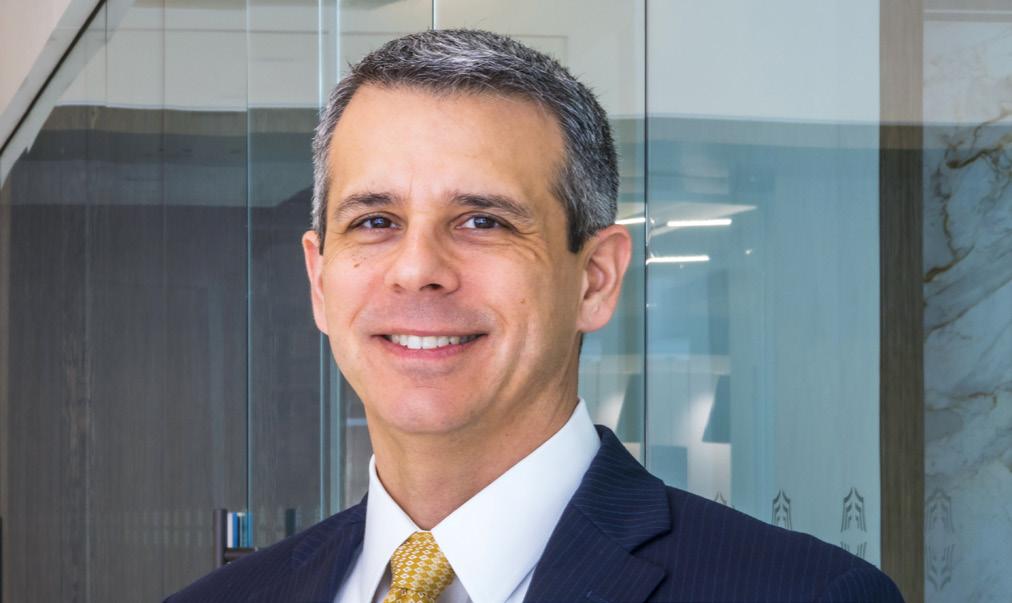
Feature
P48
Adriana Suringa Luedke knows how to engage, negotiate, and turn on a dime as Lockheed Martin’s director and associate general counsel of IP and technology law
P56
Dexcom’s Kellin Chatfield Nicoletti has demonstrated her ability to lead in the male-dominated world of corporate law. Now, she’s helping push out new products, increase innovation, and expand into new markets.

Lead
P72
Chief Legal, Ethics, and Compliance Officer Rick Sinkfield is on a mission to make affordable, high-quality education a reality for all

P90
Alex Christian is an IP lawyer with a marketer’s mind for business. She has blossomed at General Mills, where she can be herself.
Rigel Crow/Insperity (Callens), Elliott O’Donovan (Luedke), Rodrigo Varela (Sinkfield)
P38
P48
Contents 4
P72
Pivot
P124
EverCommerce hired Lisa Storey anticipating a rapid expansion. She’s helped the tech start-up acquire fifty-plus companies and go public in less than four years.
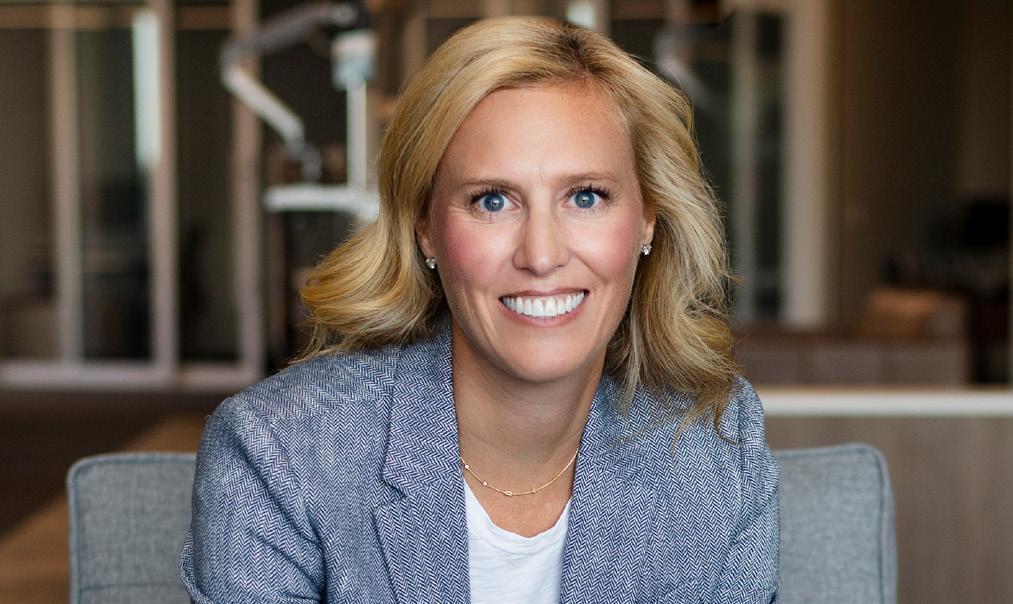
P140
Bryan Warner helps Budweiser grow in the Asia-Pacific beverages market while maintaining a deep appreciation for differing perspectives, experiences, and values
Focus
P149
At JPMorgan Chase, Jennifer K. Parnell works to lift others up and increase diversity by empowering those who are interested in advancing their legal careers

P162
Rich Rosalez leverages his lifelong diversity efforts to push for equity and belonging at Samsung Electronics America and beyond

Evaluate
P200
Nikki Pollard helps NorthStar Anesthesia navigate the complexities of labor and employment law in the age of COVID-19
P206
Joe Rubbone has helped Orangetheory Fitness weather a storm and evolve in new ways while inspiring members to live their best lives
P149
P206
Jess Kornacki (Storey), Byron Sanders (Parnell), Aymée Cruzalegui (Rubbone)
Modern Counsel 5
P124
Creative VP, Creative Production Kevin Warwick Editorial Manager Frannie Sprouls Managing Editor Brittany Farb Gruber Editors Sara Deeter Melaina K. de la Cruz Julia Thiel Staff Writers Zach Baliva Billy Yost Contributing Writers Zachary Brown Pamela Bloom Dan Caffrey Will Grant Frederick Jerant Noah Johnson Natalie Kochanov Donald Liebenson Keith Loria Margaret Lynch Katie Oltmanns Claire Redden Designer, Modern Counsel Rebecca Kang Senior Designer Vince Cerasani Designer Anastasia Andronachi Senior Photo Editor & Staff Photographer Sheila Barabad Sarmiento Photo Editor & Staff Photographer Cass Davis Special Projects Editor Sara Deeter Creative Production Coordinator Melaina K. de la Cruz Creative Production Intern Izzy Mokotoff Corporate CEO & Publisher Pedro A. Guerrero President, Group Publisher Kyle Evangelista Chief of Staff Jaclyn Gaughan SALES VP, Sales Ben Julia Director, Sales Kelly Stapleton Director, Sales Onboarding Justin Davidson Manager, Onboarding Sales & Development Hannah Tanchon Lead Recruiter, Guerrero Search James Ainscough Senior Director, Corporate Partnerships & DEI Solutions Krista Horbenko Digital Product Manager Aleksander Tomalski Director, Talent Acquisition & Engagement Haylee Himel Director, Talent Acquisition Heather Steger Content & Advertising Managers Megan Apfelbach Amanda Graham Elif Negiz Kara Thomas Alex Tomalski Stuart Ziarnik AUDIENCE & ENGAGEMENT VP, Hispanic Division Head of Audience & Engagement Vianni Lubus Director, Events Jill Ortiz Events & Marketing Manager Ashley Parish Communications Manager Cristina Merrill Social Media Manager Ashley Rupprecht Associate Manager, Digital Marketing Aliana Souder OPERATIONS VP, Finance David Martinez Director, Circulation Stacy Kraft Staff Accountant Natallia Kamenev Senior Director, Client Operations Cheyenne Eiswald Senior Manager, Client Services Rebekah Pappas Manager, Client Services Brooke Rigert Director, Client Services–Corporate Partnerships Taylor Frank Office Manager and Administrative Assistant Emiko Daniel Facebook: @ModernCounselConnect Instagram: @moderncounselmagazine LinkedIn: @modern-counsel Twitter: @ModernCounsel Modern Counsel is a registered trademark of Guerrero, LLC. © 2022 Guerrero, LLC guerreromedia.com 1500 W. Carroll Ave., Suite 200 Chicago, IL 60607 Reprints Reprinting of articles is prohibited without permission of Guerrero, LLC. Printed in China. For reprint information, contact Reprints & Circulation Director Stacy Kraft at stacy@guerreromedia.com 6 Masthead
As a new mother, I certainly didn’t expect that my daughter would get her first haircut at just four months old, yet alone in an operating room with a neurosurgeon at the helm. However, at a routine check-up just a few days prior, her pediatrician ordered an emergency ultrasound of her brain because her head circumference had unexpectedly expanded off the charts. It showed she had ten times the amount of fluid than normal in the ventricles of her brain, which required the immediate attention of the hospital’s neurosurgery department.
My daughter was diagnosed with hydrocephalus, an abundance of cerebrospinal fluid placing dangerous pressure on her brain. The only option was to undergo brain surgery to implant a ventriculoperitoneal (VP) shunt to drain the fluid. Doctors cautioned that she would be at an increased risk of having permanent brain damage and developmental delays. Additionally, the VP shunt had one of the highest rates of malfunction of any surgical implant especially within its first two years, but we had no other option other than moving forward with the procedure. In the recovery room, we were handed a plastic bag labeled “Baby’s First Haircut” filled with our daughter’s hair shaved for surgery. At the time, the ordeal felt like a nightmare. However, I now look back at it with tremendous pride and gratitude.

Experiencing a worst-case scenario builds tremendous strength. My daughter is now five years old and thriving. Her hydrocephalus was caught early so any neurological damage is relatively nonexistent. In fact, she has met, and in some cases surpassed, her developmental milestones. We are out of the woods so-tospeak, and her condition is essentially invisible to the outside observer. I’m now a much more seasoned, spiritual, and grateful mother, and everyday challenges have almost always paled in comparison to my daughter’s brain surgery as well as the anxious days after.
Overcoming adversity resonates across Modern Counsel’s Resilience issue. In our Feature section, we showcase legal executives who have bounced back and thrived from difficult experiences, prospering in the face of adversity. Leaders including Adriana Suringa Luedke at Lockheed Martin and Kellin Chatfield at Dexcom have cultivated strength and adaptability to develop, grow, and succeed in their careers. Simply put, they have risen to the occasion to defeat obstacles standing in between them and flourish.
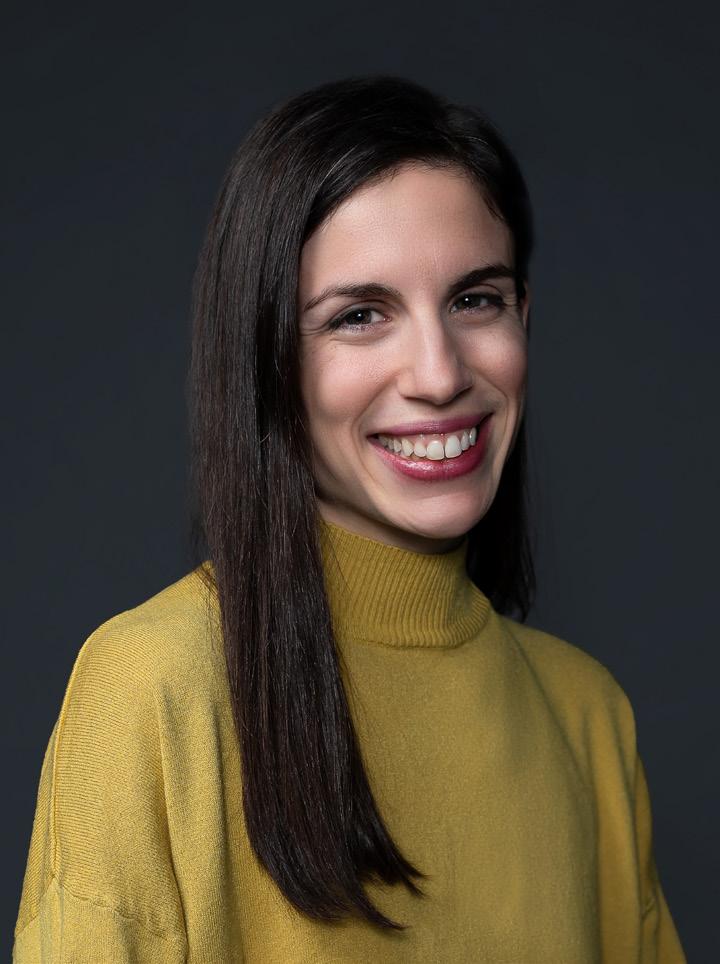
A resilient leader in his own right is our cover star Rich Rosalez, VP of litigation at Samsung Electronics America. Rosalez always brings his best to the table, and this applies to all facets of his role at Samsung. Highlighting our Focus section, Rosalez spoke with us about his passion for diversity, where he sees the progress of the movement both abroad and within Samsung, and his passion for giving back to his community. Rosalez epitomizes a tireless commitment to bringing opportunity to all communities.
While working on my first issue of Modern Counsel as managing editor, I realized that resilience has become a constant theme both in my daughter’s life and my own as her mother. Similar to the legal leaders featured in this issue, my family emerged much stronger because of the adversity we faced. Every milestone has been extra special to us and we appreciate our little girl even more than the first time we laid eyes on her. Maybe my daughter’s first haircut wasn’t so bad after all.
Resilience often develops when you least expect it.
Brittany Farb Gruber Managing Editor
Sheila Barabad Sarmiento
Modern Counsel 7
Editor’s Letter
WE MAKE YOU LOOK GOOD A custom publication is your organization’s best marketing material, and we create the best custom publications. Contact Vianni Lubus at 312.564.2185 or vianni@guerreromedia.com to start a conversation about your custom publication.
Celebrating legal leaders’ latest efforts and achievements, including transactions, expansions, negotiations, and inclusion initiatives
tktktktktkt
Implement
Find Your Pace
From her early days doing legal work for a Native American–owned casino to her current position at Total Quality Logistics, Lindsay Sadlowski has remained true to her authentic self
By Frederick Jerant
ROUTINE WORK IS OFTEN THE MAINSTAY OF internships and similar programs. But Lindsay Sadlowski scored a legal internship that was out of the ordinary.
“During my final year of law school, I worked in-house for a tribal-owned casino in Milwaukee,” she says. “With the legal department being small at that time, I directly assisted the attorneys in providing guidance on a wide range of legal issues.
“One of the unique aspects of working at a tribal casino is the intersection of federal, state, and local laws that are not often encountered in the typical legal practice,” she adds. “The gaming industry itself is a niche area, and then layered on top of that is Native American ownership, which adds to the complexity.”
Sadlowski explains that, in addition to the usual rules and regulations that govern the gaming industry, there also are laws and regulations specific to Native American tribes. “The off-reservation casino was an extension of the tribe, which meant that some legal issues impacted the tribal business as well as the individual tribal members,” she elaborates. “And the tribe also has ‘sovereign immunity,’ which
means that it is not subject to suit under certain laws and statutes that ordinarily would apply in the industry. Being immersed in such a dynamic and energetic environment gave me a different perspective on legal and business issues that has benefitted me in countless ways throughout my career.”
After receiving her JD from Marquette University Law School, Sadlowski cut her teeth in litigation, joining Faruki Ireland & Cox (now Faruki PLL) as an associate attorney. The young lawyer garnered experience in complex cases for Fortune 500 companies, ranging from class actions to data privacy and security matters. She proceeded to earn a fouryear judicial clerkship in the US District Court for the Southern District of Ohio, where she broadened her repertoire to include areas such as employment law and white-collar crime. Sadlowski briefly returned to private practice at the firm Baker and Hostetler after having twins, but soon realized she had a new choice to make. “I felt like I couldn’t find the right work/ life balance for myself. I decided to step back, to reset my priorities and rethink my goals,” she says. “That can be risky professionally, but
Implement 10

Ross Van Pelt
Lindsay Sadlowski Corporate Counsel Total Quality Logistics LLC
I knew I had a good foundation and a solid network.”
Nine months later, Sadlowski joined the team at Total Quality Logistics LLC (TQL), one of the largest freight brokerage and third-party logistics firms in North America, where she currently serves as corporate counsel. Although her primary focus is on the company’s litigation portfolio, including commercial and transportation litigation, she “invests part of her time handling an array of prelitigation issues as well as working with outside counsel.”
While the industry shift may seem peculiar, the role was one that Sadlowski had been unknowingly prepared for since she was a student.
“There are many parallels between legal work in the gaming industry and the transportation industry. Because both are fast-paced environments, they require a high degree of agility and adaptability. What I have now that I did not have first starting out at the casino, though, is a broader and deeper well of experience to tap into that makes it easier to keep up with the pace,” says Sadlowski, who works with five other attorneys and ten other legal department personnel.
A key challenge is managing TQL’s constantly shifting legal landscape. “We are always looking ahead,” she says, “so we can have a sense of what is, and might be, in the pipeline. We must be able to respond quickly to new changes to laws, technology, and the supply chain. For example, the recent pandemic has disrupted the supply chain
and also has come with its fair share of new directives from the White House that we must be prepared to address. All of that will impact the volume and type of litigation our team must prepare for.”
Sadlowski does not merely react, though. “Even as litigators, we must advise proactively as well,” she explains, “and always consider how our advice may impact the business overall.” And that is a key reason the legal team engages in cross-collaboration.
“Each of our team members has particular areas of expertise, but no one works in a silo,” Sadlowski says. “Even if they are not in charge of a particular case or issue, they have different perspectives and knowledge about business or legal matters that could directly
impact our case, so I always welcome their input. When you’re surrounded by energetic, motivated people who are always thinking, you can absorb that energy and build on it.”
As TQL navigates an influx of customers who need help moving goods while carriers are shorthanded, the company continues to expand its solutions across all modes of transportation to provide the best customer service in these ever-changing conditions. Sadlowski’s own team takes a similar approach to the situations it advises on.
“Although we cannot always predict the next legal issue that will come across our desk, such as a delay issue due to a backlog of ships at the ports, our team is constantly learning and evolving so
“When you’re surrounded by energetic, motivated people who are always thinking, you can absorb that energy and build on it.”
Implement 12
we can efficiently address new issues for the business as they arise. These are the things that make working in this industry fun and energizing.”


It also makes sense that the company in which the new mother found her home when she reentered the workforce is one with a strong sense of camaraderie and defined career/life balance. “Even though we work hard, TQL supports integrating family and work life. Our chief legal officer insists that we make ‘family time’ a priority,” she says. Sadlowski found her strength in a legal sector that is rapidly paced and transforming and advises others to first identify their own skills when making career decisions. “Be your authentic self. Don’t try to force yourself into the mold of a role or emulate someone else’s style,” she says. “Be aware of your strengths and limitations, and maintain your integrity and values both at the office and at home.”
Many of the world’s leading businesses trust Dinsmore to handle today’s most complex business challenges. As legal counsel to TQL, we applaud Lindsay Sadlowski and wish her continued success.
Dinsmore & Shohl LLP:
“We have been fortunate to partner with Lindsay and TQL to serve their legal needs. She is a savvy, big-picture litigator whose ability to stay three steps ahead creates an immediate strategic advantage in the cases she oversees.”
–Matthew J. Wiles, Partner
DINSMORE & SHOHL LLP
We are a national, full-service law firm with offices coast to coast.
13
Diamond Mind
John Duffy helps navigate Tiffany & Co. through a major acquisition
By Will Grant
IN JANUARY OF 2021, THE CEO OF LVMH MOËT Hennessy Louis Vuitton SE, Bernaud Arnault, announced the completion of a $16.2 billion deal to acquire the most famous luxury jeweler in the world, Tiffany & Co.
“I am pleased to welcome Tiffany and all their talented employees in our group,” Arnaut said in a prepared statement. “Tiffany is an iconic brand and a quintessential emblem of the global jewelry sector. We are committed to supporting Tiffany, a brand that is synonymous with love and whose blue box is revered around the world, with the same dedication and passion that we have applied to each of our prestigious Maisons over the years.”
During the acquisition period—and for seven years prior to that—VP and associate general counsel John Duffy has played a vital role in a host of activities that have led to Tiffany’s enduring brand successfully changing hands and, more importantly, continuing to make its presence known on fingers and wrists around the world.
Duffy came to Tiffany & Co. in 2014 and is responsible for drafting and negotiating documentation concerning the company’s financing activities, serving as secretary of the audit and finance committees for the Tiffany & Co. board of directors, drafting and reviewing the company’s SEC filings, and even drafting and negotiating Tiffany & Co’s diamond supply agreements.
He also serves as secretary for the Tiffany & Co Foundation. The nonprofit was established in 2000 to focus on the jeweler’s philanthropic efforts, including environmental programs that seek to preserve “the world’s most treasured seascapes and landscapes.” To date, the foundation has awarded more than $90 million in grants, including coral and marine conservation and education.
Duffy’s value lies not just in his skills, but in his pursuit of knowledge. After graduating from Princeton University with an bachelor’s degree in economics and earning his JD from Duke University School of Law, Duffy went on
Implement 14
to earn his MBA from Duke’s Fuqua School of Business. There, he finished in the top ten percent of his class.
The high speed at which the Tiffany & Co. legal team is required to act is a plus for Duffy, who possesses an innate desire to move from one deal to the next.
Duffy loves the role of having one client that he knows inside and out, and the confidence that knowledge inspires. As he’s risen through the ranks, Duffy has taken on new markets and areas, all while continuing to grow his team and providing leadership during a rollercoaster of a year.
The lawyer strongly believes in his department’s need to be responsible, to provide support to their internal clients, and to do all they can to remove the “department of no’’ reputation that often afflicts internal legal teams. Duffy strives to find a way for his to build on the ideas presented to his team in order to find a way to make it happen, even if those ideas need to be reinforced with a more solid legal foundation.
The stress of the pandemic was compounded by the LVMH acquisition, and Duffy says that while it was easy to get lost in the fray, it was more than important than ever for him to tell his team that they were doing good work.
Tiffany & Co. has found an associate general counsel who’s as bright and strong as one of their own diamonds.
Duane Morris LLP:
“John is not only a superb professional but an extraordinary human being. For all of us at Duane Morris, it is a pleasure to work with him—he is a continuing source of inspiration given his professionalism, dedication, commitment and discipline. We will always thank him for allowing us to be part of his team.”
–Rosa Ertze, Partner, New York
Pillsbury Winthrop Shaw Pittman LLP 31 West 52nd St. | New York, NY 10019 +1.212.858.1000 | pillsburylaw.com Congratulations to John Duffy on his recognition by Modern Counsel and his outstanding service to Tiffany & Co. and Tiffany’s Blue Box Cafes. Pillsbury serves as a trusted advisor to world-renowned brands, consumer products companies, restaurants, and retailers to build, preserve and enhance the international businesses that define global commerce.
15
The Challenge and Opportunity He’d Been Waiting For
Allan Tananbaum helps Trane Technologies subsidiaries bring a “full, fair, and final resolution” to the companies’ asbestos litigation
By Donald Liebenson
WHEN TRANE TECHNOLOGIES VICE PRESident and Deputy General Counsel of Product Litigation Allan Tananbaum was in law school, his father, a lawyer who ran his own two-person firm, advised him to practice at a large firm. This path, his father thought, would allow him to focus his talents on the law instead of dividing his attention between professional practice and the day-to-day management of a firm, including making payroll and other bureaucratic responsibilities.
Having become a big-firm lawyer and then a seasoned big-company in-house lawyer, Tananbaum is glad he took his father’s advice. What he most enjoys about his role is the lasting impact he can have on how a business is run and helping it achieve its long-term goals.
Tananbaum had a crucial chance to assist in long-term strategy when, in June 2020, Aldrich Pump and Murray Boiler, two subsidiaries of Trane Technologies, filed petitions for Chapter 11 relief. As Bloomberg reported at the time, these filings would “deal with legacy asbestos
Implement 16
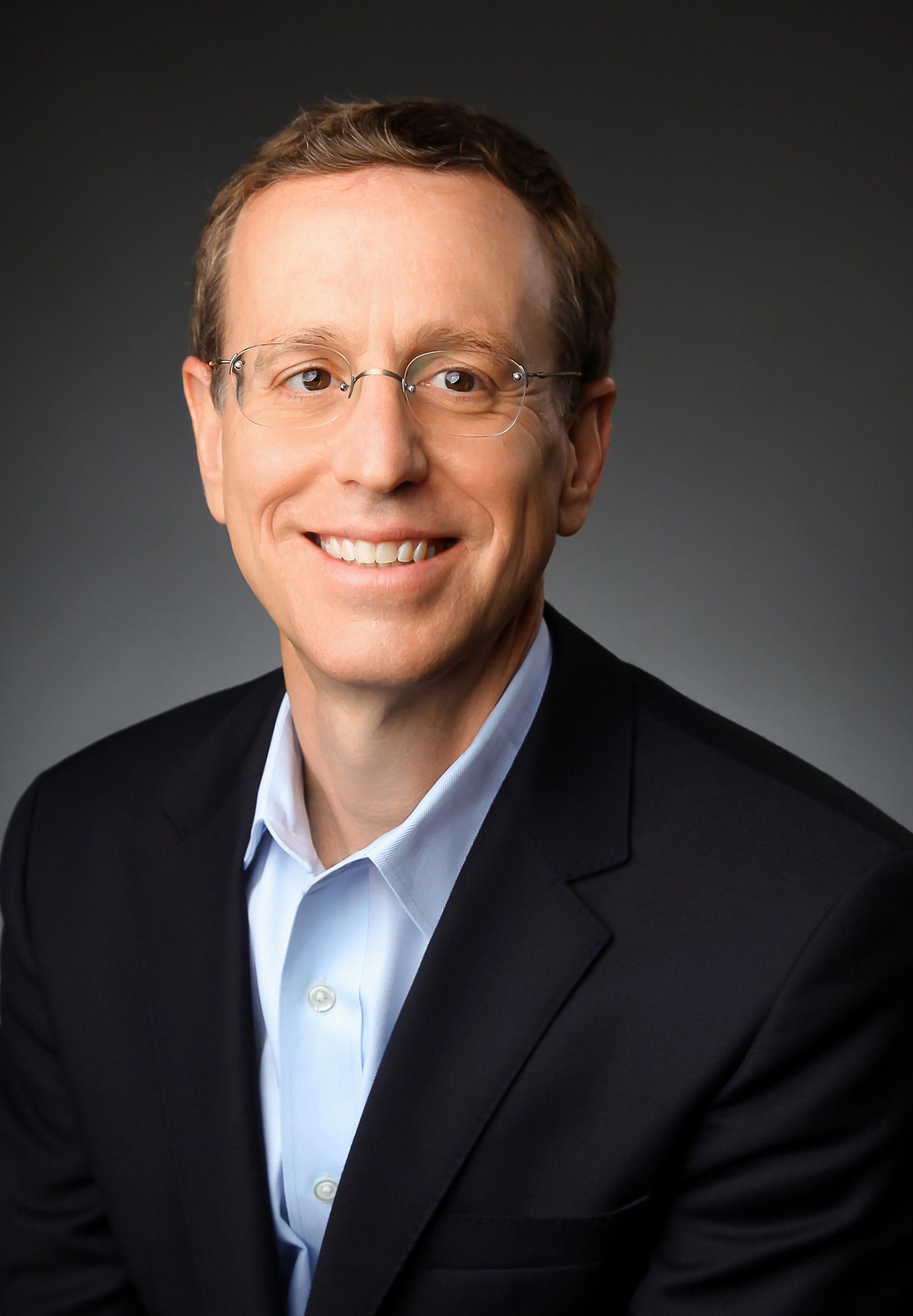 Courtesy of Allan Tananbaum
Courtesy of Allan Tananbaum
Modern Counsel 17
Allan Tananbaum VP and Deputy General Counsel of Product Litigation Trane Technologies
liabilities and free the industrial manufacturer from facing exposure-related lawsuits going forward.”
At the time, Tananbaum had only been in his current leadership role for two months. But he had been with the company for fifteen years, including a decade-long stint as the company’s chief compliance officer.
In his prior role, Tananbaum worked closely with both Trane’s general counsel and the audit committee of the board of directors to expand and strengthen the company’s existing compliance program. He added resources in every geographic region and helped build—and sustain—a strong culture of ethics and integrity. From establishing a global integrity council chaired by the company’s CEO to creating an interactive, values-based, revised code of conduct to conducting professional investigations and training sessions, Tananbaum’s hallmark approach was to proactively partner with business leaders and employees to provide guidance and solve problems.
Deploying this proactive approach to help resolve Trane’s asbestos litigation once and for all was just the challenge and opportunity he’d signed up for.
“There had been a corporate restructuring that created two new legal entities that were allocated the company’s historical asbestos liabilities and associated insurance assets. Aldrich and
Murray also became parties to agreements with larger Trane entities that promised to fund those asbestos liabilities to the extent the subsidiaries’ assets proved insufficient, either in the tort system or via a bankruptcy trust. Aldrich and Murray then took the opportunity to evaluate whether an asbestos bankruptcy was something worth proceeding with,” he says.
“When I took on my current role, a lot of that restructuring work was already underway. Once the restructuring was complete, I became fully seconded to Aldrich and Murray as their chief legal officer, and I assisted the management of these entities and their boards in analyzing whether the filing of the bankruptcy was a good idea or whether they would just stay the course litigating in the tort system, as Trane had for many years.”
In 2005, Tananbaum joined American Standard, one of America’s oldest manufacturers of plumbing and heating products. Back in 1984, it had bought the Trane Company, a leading air conditioning and heating systems manufacturer, which American Standard continued to operate under its own brand. “I previously had been at Honeywell for three years and really enjoyed it,” Tananbaum says. “But I had the opportunity to lead and run the litigation function at American Standard.”
In 2008, after American Standard split itself up and was renamed Trane,
Trane was purchased by Ingersoll Rand. At that point, Tananbaum was appointed to run the litigation function at the combined company, which was renamed Trane Technologies in early 2020, after a divestiture. Both historical Trane and historical Ingersoll Rand had asbestos liabilities, and these were allocated to Murray and Aldrich, respectively.
The goal of the Chapter 11 filings “is to effectuate a full, fair, and final resolution of the companies’ asbestos liabilities,” Tananbaum states. “The asbestos tort system is riddled with inefficiencies and extraneous costs. Some money goes to claimants, but more than half of everything spent goes to lawyers on both sides, experts, and other providers. There are differing outcomes for similar cases that can depend on where cases are filed and which plaintiff’s firm did the filing.”
The section 524(g) asbestos bankruptcy proceeding enables the subsidiaries to attempt to negotiate a consensual trust with creditors, which when funded can streamline the claims-filing process and ensure compensation for both current and future legitimate claimants according to standardized criteria. All of this would be in lieu of individual cases in the tort system. “In setting up a trust, you can have clear and simple instructions about applying to the trust, including filling out a form that includes supporting
Implement 18
“You’ve got to hear everybody, encourage them to make their own contribution, and you have to realize that you don’t have all the answers. By lifting up your people, you’re lifting up the entire team.”
information, and, if the submission qualifies, receiving payment,” Tananbaum says. “It’s good for legitimate claimants, but it’s good for the companies too.”
Tananbaum did not have previous bankruptcy experience (“not many in-house lawyers do,” he says), but he brought to his new role two substantive areas of expertise. “I know my way around asbestos litigation and I have significant experience accessing and monetizing asbestos insurance assets,” he states. “I wanted to overlay a new area of practice on my previous knowledge and skill sets.”
As a team leader, Tananbaum is a strong believer in the maxim that lawyers can learn more from cases where things go less well than planned than the ones that they win handily. “A lawyer isn’t worth his salt if he does not try to take some usable lessons from difficult cases or at least minimize the damages,” he says.

“What were the drivers that got us to this bad place? What can we do differently the next time? Some of the lessons may be tactical ones for the lawyers, but others might be basic lessons for the business. I also learned early on that even when you win in court, sometimes only the lawyers are happy. Internal clients may only see the distractions and the costs of litigation and assume the terrific result was nothing more than their rightful due.”
He is also a strong believer in the “When they look good, you look good” school of mentoring and leadership. He cites one of his own mentors, Mary Beth Gustafsson, his general counsel at American Standard and the current GC of ITT, as an important influence on his leadership philosophy.
“I learned a lot from her about letting people spread their wings and get the job done,” he says. “You’ve got to hear everybody, encourage them to make their own contribution, and you have to realize that you don’t have all the answers. By lifting up your people, you’re lifting up the entire team.” Tananbaum also sees this same philosophy in action from current Trane GC Evan Turtz, whom he has had the pleasure of working with for many years.
“The Claro Group celebrates Allan Tananbaum’s well-deserved recognition by Modern Counsel and applauds a leadership grounded in integrity, intellectual curiosity, and collaboration,”
CONGRATULATIONS
We are proud to recognize Allan Tananbaum, Deputy General Counsel of our client Trane Technologies.
K&L Gates LLP. Global counsel across five continents. Learn more at klgates.com.
19
says managing director Michelle Uddin. “We are honored to partner with him and the entire Trane Technologies team.”


When he’s not busy lawyering, Tananbaum strives to uplift people through his volunteer work. He is involved with Family Connections, which provides an array of programs in Northern New Jersey to combat trauma, mental illness, addictions, domestic violence, and child abuse, and Devereux Behavioral Health, which supports people with intellectual and developmental challenges and specialty mental health needs.
He and his wife of twenty-four years have “three great kids,” he says: a twenty-one-year-old college senior who is circling the legal profession, an eighteen-yearold college freshman and working actress, and a sixteen-year-old high school junior. They enjoy hiking as a family and experiencing live theater. They recently returned to Broadway for the first time since the pandemic’s onset to see To Kill a Mockingbird , starring Jeff Daniels as small-town defense attorney Atticus Finch, one of the most beloved characters in all literature and film.
A lawyer, of course, Tananbaum notes with a laugh.
20 VAST EXPERIENCE IN COMMERCIAL DISPUTES INSURANCE CLAIMS CORPORATE FINANCE & RESTRUCTURING SERVICES FORENSIC ACCOUNTING & TECHNOLOGY SOLUTIONS Expert consultants who strategically Acquire, Organize, Analyze and Clarify complex data.
focus, resolve the issue with
theclarogroup.com
sharper
more clarity

AUS TIN BRUSSEL S DALL AS DUBAI MOSCOW NEW SAN FR ANCISCO WASHINGTON
Baker Botts is pleased to recognize the achievements of Allan Tananbaum and the entire team at Trane Technologies .
In It Together
By Zachary Brown
THE COVID-19 PANDEMIC CHANGED MOST aspects of life, including healthcare delivery around the world, but how has it changed the way animals receive medical treatment? That question has been at the center of conversations at Zoetis, the American company that produces more animal medicine and vaccinations than anyone else.
Scott Mayhew joined Zoetis in 2013 after going in-house at Pfizer. As senior corporate counsel, he is part of a strong legal team that has worked with marketing and other internal groups to help Zoetis push resources and recommendations to veterinarians and others.
Zoetis is supporting its veterinary customers to help limit the financial impact of their practices as they navigate the pandemic together. Legal and others worked diligently to keep Zoetis’ services uninterrupted. “Our supply levels are strong, and we continue to proactively monitor them with our distributors,” CEO Kristin Peck said in a statement.
Additionally, the company staggered work shifts in manufacturing facilities and moved nonessential employees to a work-from-home model to limit possible COVID-19 exposure to essential employees who make and distribute products. The company also stayed in contact with experts to monitor virus spread in animals.
Within months, Zoetis developed the capability to perform rapid PCR testing to detect COVID-19 in companion animals. The company also posted a robust URL and FAQ section on its website, filled with information for clients, links to online learning opportunities, and other important resources. This information educates veterinarians as they manage concerns from their clients regarding the health and wellness of their animals.
How animal health company Zoetis supported its customers and their veterinary practices during the COVID-19 pandemic
22 Implement
Zoetis’s leaders also worked to adjust their company culture in response to these challenges. Peck says workers need increased options. “I would argue we need flexibility policies that flex. Not just allow people to work from home, but also being flexible about when people work. Workers have earned the right to do work differently,” she said in an interview with Fortune . Mayhew and his team helped Zoetis create new legal policies to allow for this increased flexibility.



As the pandemic started to stabilize, Zoetis turned its attention to helping other groups and donated COVID-19 vaccines to zoo animals. The company sent more than eleven thousand doses of an experimental vaccine it developed to help protect one hundred species in almost seven zoos and animal facilities. This initiative came about in response to confirmed COVID cases in the San Diego Zoo’s gorillas.
“Up until now, we have been using public barriers at certain habitats to ensure social distancing, along with enhanced PPE worn by staff to protect our susceptible species from COVID-19,” said Dr. Alex Herman, vice president of veterinary services at the Oakland Zoo, in a press release. “We’re happy and relieved to now be able to better protect our animals with this vaccine and are very thankful to Zoetis for not only creating it, but for donating it to us and dozens of other AZA-accredited zoos across the US.”
Zoetis’s legal team supported the development of its vaccine formulated for animal species, and the company completed its safety studies within just eight months before presenting its findings at the World One Health Congress. “While thankfully a COVID-19 vaccine is not needed in pets or livestock at this time, we are proud that our work can help zoo animals at risk of COVID-19,” said Mahesh Kumar, senior vice president of global biologics at Zoetis.
The COVID-19 pandemic underscored the link between human and animal health, and Zoetis is committed to its ongoing efforts to support the health and wellness of animals.
torys.com
Torys congratulates our client and friend, Scott Mayhew on his recognition in Modern Counsel and his outstanding contributions to Zoetis.
23
Real-Time Decisions
Auste Graham has helped three different business divisions at Essentra make pivotal decisions for COVID-19 protocols on the fly
By Billy Yost
AUSTE GRAHAM LAUGHS WHEN SHE TALKS about her job interview for Essentra. After nearly ten years of extensive and wide-ranging experience at firm Schiff Hardin and almost three years as in-house counsel at AkzoNobel, Graham was interested in what she might be able to bring to Essentra, a FTSE 250 company and global manufacturer of essential components.
In conversation with Jon Green, Essentra’s general counsel, Graham found herself in a peculiar position. “Our GC almost seemed to be challenging me about the issues I would be

facing,” Graham says. “Essentra had just undergone management turnover, and the company was rapidly changing its internal culture. As an added kicker, there hadn’t been a legal function in the Americas for years. I felt like he was asking me if I really wanted this job.”
Contracts and Collaboration
Stepping into her current role as vice president of legal for the Americas for the UK-based Essentra, Graham knew she would be challenged: essentially, she would be building out her function
24 Implement
from scratch. And while the attorney thought she might be getting in over her head, the challenges were too interesting to pass up.
“As an attorney, especially an in-house attorney, taking on legal challenges is the only way you can grow and improve yourself,” Graham explains. “And so I threw myself into it.”
In addition to figuring out what legal issues she would need to tackle first, Graham needed to reach out to Essetra’s external counsel stateside to tell them that all roads now went
through her. At the same time, she was able to do what she does best: build internal stakeholder relationships.
There would be challenges. Her first week on the job, Graham met with a division leader who told her, in no uncertain terms, that he was no fan of contracts. “I knew it was going to be an interesting challenge, because that’s one of the key weaknesses I saw in the company at the time,” the attorney explains. “They weren’t negotiating agreements to their benefit, and I knew that needed to change.”
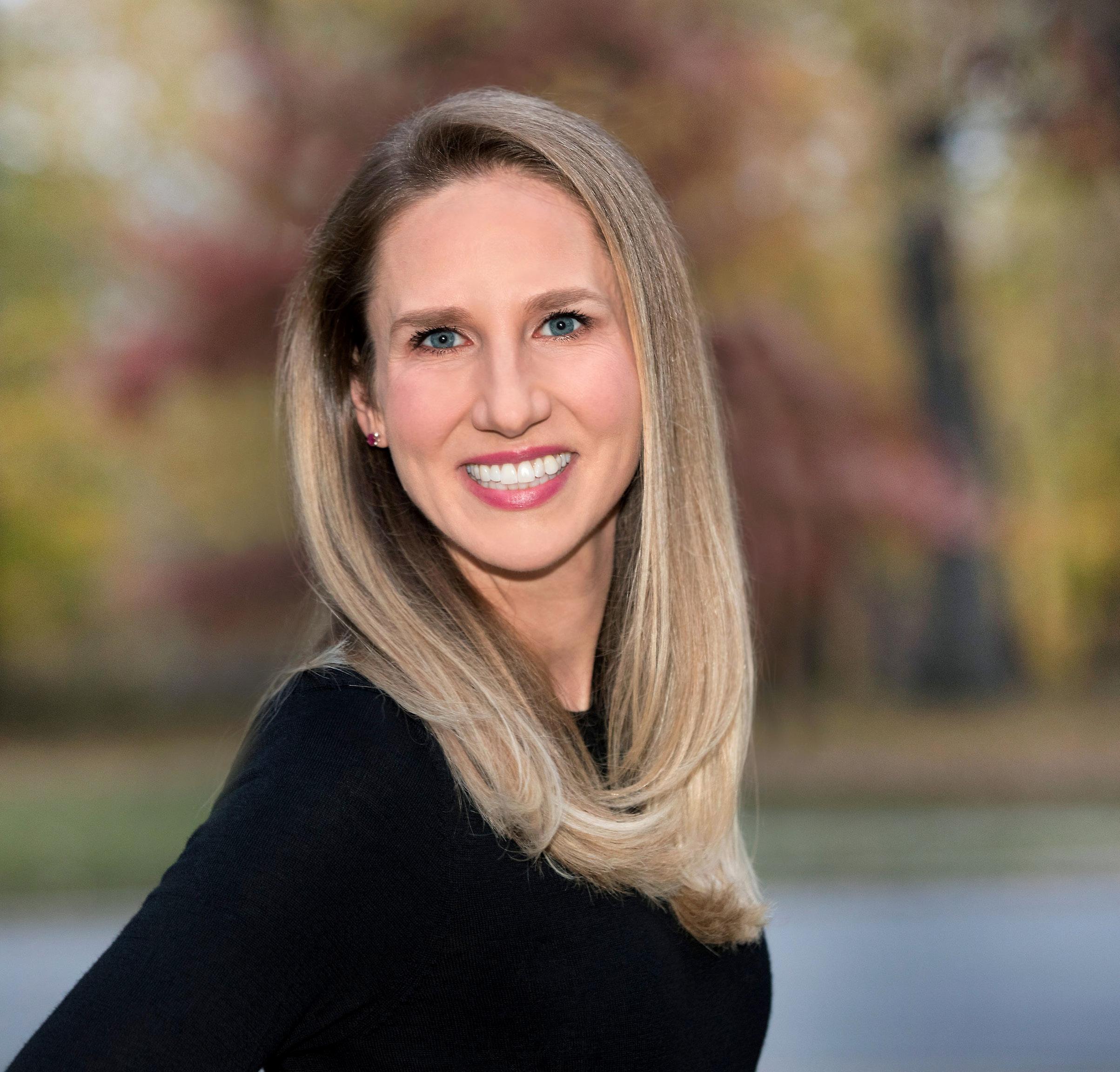
Kristine Kilroy
Auste Graham VP of Legal, Americas Essentra
By the time Graham’s contract-hating colleague left last year, the two had formed a strong friendship and had successfully collaborated for years together. Graham considered it a pivotal win for her career. That hard-won collaboration demonstrated her ability not just to partner with the business but to provide meaningful interaction that strengthened both the company culture and the business.
In-House Essentials
Along with building out her own legal function, Graham says the COVID-19 pandemic provided her with the opportunity to truly show the manufacturing industry just how pivotal the legal team can be in keeping a business running.
Essentra’s business encompasses three separate core divisions, including the manufacturing of components that are used in ventilators and other medical equipment. Graham spent virtually every day at the onset of the pandemic working to determine which parts of the business were considered essential and which parts needed to be halted.
“It was applying changes day-to-day and in real time in three different divisions,” Graham says. “It was truly a test for any legal department—whether they were worth their salt in how they were able to apply those changes and mitigate the risk associated with all the decisions and changes that the pandemic threw at us.”
Graham says she was prepared as well as any firm lawyer could be to go in-house, based on her experience with firm Schiff Hardin. Working in the general corporate group, the attorney was never forced to specialize in a niche transactional area.
“I worked on a ton of M&A, a great deal of private equity transactions, general corporate governance issues, and toward the end of my career there, I worked with the same few clients over and over,” Graham explains. “That generalist corporate role offered me the opportunity to see all these different aspects of corporate transactions without having to specialize in any. It continues to help me now, because if I’ve learned anything by going in-house, it’s the more you’re exposed to early on, the more valuable you are to your company.”
Implement 26
“As an attorney, especially an in-house attorney, taking on legal challenges is the only way you can grow and improve yourself.”
Trusted Legal and Business Advisors
McGuireWoods knows only a collaboration of bright minds and different viewpoints can create the innovative solutions our clients need in today’s marketplace.

We congratulate Auste Graham for her leadership and impactful organizational growth as Vice President - Legal, Americas at Essentra. We value our partnership.
Joanne Katsantonis, Partner | +1 804 775 1017 | jkatsantonis@mcguirewoods.com Gateway Plaza | 800 East Canal Street | Richmond, VA 23219-3916
1,100 lawyers | 21 offices | www.mcguirewoods.com
Powering TDK’S GrowthOngoing
By Zachary Brown
ALTHOUGH TDK ISN’T NECESSARILY A household name, its products are in many homes worldwide. The Japanese electronic components maker, once known as Tokyo Denki Kagaku, was founded 87 years ago by Kenzo Saito. While Saito started the company to produce ferrite, TDK has always been innovating. Since its inception, employees have made cassette tapes, VHS tapes, CD-Rs, DVDs, and an array of electronic devices. In 2005, the company started producing sensors and power components for consumer electronics. That move fueled its growth, and today, TDK has annual revenue of more than $13.56 billion.
A long string of acquisitions has helped TDK execute its ongoing growth plan. Its leaders have closed several important deals since 2016, including ones that brought companies like Chirp Microsystems and Faraday Semi LLC on board. The Chirp deal helped TDK create a US-based business line focused on ultrasonic tracking and rangefinding
technology used in automotive, communications, and other sectors. Chirp’s sensors work in bright and dark conditions and even perform well in direct sunlight. TDK’s scope will help get the products to the mass market.
“We were open to the idea of becoming a part of a larger organization because the opportunity appears to give us the chance to live in the same ecosystem they are already in, and it could become a way for us to scale our business at a much faster pace,” Chirp CEO Michelle Kiang told the EE Times
Although TDK is based in Tokyo, legal teams and other functions across the world help it thrive in key markets. In New York, Daniel Vaillant, associate general counsel and director of corporate compliance, helps TDK USA provide services to TDK’s regional affiliates. Although his team covers big businesses, Vaillant runs a lean operation with just four attorneys who provide legal and compliance services at seventeen companies. As a result, the day-to-day is varied and can
How a nimble regional legal team protects the innovative spirit of TDK
Implement 28
involve compliance, M&A, employment, and other legal matters. “The expectation is that we consider being a general practitioner as a specialty,” he says.
Recently, the entire organization has responded to a mandate from leaders in Tokyo to enhance TDK’s global compliance program. The endeavor includes large-scale compliance initiatives like antitrust and antibribery policies that are critical to any organization of similar size and scope.
In 2020, Vaillant suggested an internal review of these matters in the Americas, which he spearheaded as a major project in collaboration with auditors and outside counsel. These and other projects have cemented TDK USA’s relationship with partners like DLA Piper. Tom Gaynor, the firm’s relationship partner, said, “On behalf of the whole DLA team, it’s a pleasure to support your exceptional efforts on behalf of TDK and its companies.” TDK is using Vaillant’s successful process as the framework for similar steps in other regions.
These efforts are of critical importance as TDK powers the future. The company is manufacturing and developing sensors, parts, and other products used in emerging high-tech applications in numerous fields.
TDK’s high-precision tunnel magneto resistance (TMR) sensors, originally developed for automotive applications, are prepared to equip service robots ready to take over cleaning, security, and customer service jobs once done by humans. The TMR sensors produced by TDK enable natural, fluid, lifelike, and accurate movements to help the robots perform tasks with greater efficiency.
Expertise Spotlight
DLA Piper is a global law firm with lawyers located in more than forty countries throughout the Americas, Europe, the Middle East, Africa, and Asia Pacific, positioning us to help clients with their legal needs around the world.
Our global corporate lawyers are highly experienced in supporting the world’s leading enterprises, as well as emerging start-ups and financial institutions, in their development and investment activities. From M&A and venture capital to private and public equity and debt offerings, we assist companies through all stages of their transactions to ensure successful deal outcomes.
Our knowledge of trends and benchmarks across sectors and geographies allows our clients to make strategic and transactional decisions with confidence.
Please visit us online at dlapiper.com for more information, including recent awards and accolades.
Modern Counsel 29
MAKING AN IMPACT
A VALUED PARTNER

Nixon Peabody congratulates Dan Vaillant of TDK U.S.A. Corporation on this welldeserved leadership recognition, which highlights his outstanding career and bright future.





We are proud to work with Dan, and look forward to many more years of collaboration.
Markets for these robots are expected to grow in two areas: industrial and service. Service robots are designed to work near people in offices or retail establishments while industrial robots work in factories and other similar facilities. TDK’s technology is leading towards wide adoption of both industrial and service robots in many parts of the world, and industry forecasters expect their popularity to grow in the wake of the COVID-19 pandemic. Reliable TMR sensors, which many consumers know from their smartphone’s autofocus device, are used in robotic motors to sense rotation and detect angles. Since they don’t draw much energy, they can do much more than guide robots—the sensors can control many of the devices we all rely upon every day.
The TMR sensors are just one of many products TDK has used to change the world. As the company approaches its one hundredth anniversary in 2035, it is implementing a new corporate motto called “Vision 2035.” As it moves forward, TDK is committed to finding new ways it can “contribute to culture and industry through creativity.”
30
Nixon Peabody LLP | 799 9th Street NW | Washington, DC nixonpeabody.com | @NixonPeabodyLLP
DLA Piper is proud to recognize the accomplishments of Daniel Vaillant and TDK USA Corporation.
We salute your steadfast commitment to innovation and the creation of new technological frontiers with the capacity to change the future.
TDK U.S.A. Corporation
dlapiper.com
Saluting innovation. Thomas E. Gaynor, 555 Mission Street, Suite 2400, San Francisco, California, 94105 | Attorney Advertising | MRS000174179
Building to a Renewable Future
After working as a consumer advocate, Joaquina Borges King found her niche in energy. As senior counsel at Eversource Energy, she now keeps her company and its clients connected to cleaner power.
By Zach Baliva
IT WAS LATE AT NIGHT IN HAITI, AND AS HER group travelled back to their mission house Joaquina Borges King couldn’t help but notice groups of kids were huddled under a lone streetlight. Ten or fifteen of them gathered in a circle engaged in some sort of activity. At first, Borges King thought they were playing a game or even maybe fighting. But her guide explained that the streetlights were the only power source available. And the children—students—were all doing their homework.
The moment was especially meaningful given Borges King’s career. She’s a lawyer at Eversource Energy, a publicly traded energy company located in Boston that, with 3.7 million electric and natural gas customers, serves as New England’s largest energy provider.
As senior counsel, Borges King arms the company’s corporate officers with the legal regulatory strategies they need to succeed. She also helps create agreements and partnerships for energy procurement and renewable energy programs. What she saw during her mission trip to Haiti made her a bigger advocate for these issues. “The need for reliable and renewable energy is big at home and can have a critical impact in remote and underdeveloped parts of the world,” she says. “The infrastructure has to be developed, maintained, and protected.”
In 2013 Borges King helped Eversource create a new program to take advantage of incentives the state of Connecticut made available to electric customers who install rooftop solar panels, fuel cells, and other renewable energy distributed
Implement 32
Senior Counsel Eversource
generation. Starting up the Eversource low and zero renewable energy credit program team took a lot of behindthe-scenes maneuvering. Borges King collaborated with colleagues, stakeholders, and other public service utilities to write the rules and guidelines to start and solicit competitive bids for what is now a nationally recognized program in its tenth year.
Getting the program off the ground was a good fit for Borges King, who is always looking to make a positive impact. “I was raised on the precepts of faith, family, and giving back,” she says. “And I was taught that it’s important to offer something to one’s community.”

Borges King is a first-generation immigrant who traces her origins to the Cape Verde islands. When a tragic construction accident took the life of her father, her mother raised her with the help of an older brother who’d become an attorney. She remembers watching him assist her mother—who lacked formal education and command of the English language—in a court proceeding. “I saw the importance of judges, lawyers, and the judicial system in the life of an immigrant family that needed help,” she says.
These events, as well as her undergraduate experiences, inspired Borges King to enroll at Georgetown University Law Center. Before joining Eversource in 2008, she worked at law firms and in various state and municipal positions. Along the way, Borges King spent time as a consumer advocate, which she says is an asset at Eversource because the public service utility company truly cares for those it serves.
Nicole Maddox
Modern Counsel 33
Joaquina Borges King
Energy
“I’m here to make sure we are compliant in creating and implementing renewable energy initiatives that allow the utility and all stakeholders to partner in ways that introduce renewable technology and also maximize distribution grid reliability, resiliency and safety,” she explains. “Because of my background I have extra sensitivity to how important it is to ensure our customers understand their rights and know how to maximize the value of our services.”
The role has additional significance for someone who remembers watching her own immigrant mother struggle.
Borges King’s unique personal and professional background has helped Eversource find creative solutions to the problems it faces, and she is on a mission to help increase diversity on her teams, in the company, in leadership positions, and throughout the entire industry. She has served as her legal department’s diversity intern supervisor, led a statewide nonprofit dedicated to diversity and inclusion of attorneys of color as board chair, and moderated and been on panel discussions on corporate DEI initiatives.
As Eversource moves forward, Borges King is focused on new measures to help customers understand their bills, improve energy usage, and save money. The
company is launching an energy storage pilot program for those who can generate power and store it for use when loads are at peak demand.
Legal work in energy can be demanding. Borges King has seen COVID-19 devastate customers, and she’s worked to arrange longer payment programs and avoid terminations. She leads with positivity and knows that every problem has a solution. “Bad things might happen, but the right attitude makes a big difference,” she says.
“I try to model that for those I work with and my clients: stay grounded, do the right thing, work hard, and treat everyone with respect.”
Carmody Torrance Sandak & Hennessey LLP:
“Joaquina is not only a fierce advocate who quickly provides pragmatic advice on complex issues but is also genuinely kind and thoughtful. She is an excellent mentor and inspiration to junior attorneys.”
Keegan Werlin LLP:
“Working with Joaquina Borges King has been a privilege. As regulatory counsel for New England’s largest utility company, she is the consummate professional. She is also a working mother who has successfully paired her home and work roles. Our admiration and respect for Jaqui as a work partner is only outdone by her ability to represent our mutual client.”
“The need for reliable and renewable energy is big at home and can have a critical impact in remote and underdeveloped parts of the world. The infrastructure has to be developed, maintained, and protected.”
–Sarah S. Healey, Partner
–Cheryl Kimball, Managing Partner
Implement 34
Specialization and Security
As deputy general counsel, Marcie Getelman balances legal support across the eastern region and strengthens Lennar’s cybersecurity measures
By Billy Yost
THE TWO PRIMARY HATS DEPUTY
General Counsel
Marcie Getelman wears for Lennar’s eastern region, just two larger hats of the countless others worn by in-house counsel for a national, publicly traded company, would be far more difficult to pull off were it not for her thirty years of legal expertise. Getelman’s role is paired with a national e-discovery and cybersecurity role that has only become more important with the passing of each year.
Getelman’s focus on reducing costs for all aspects of the company’s legal expenses, while tightening up protection against potential data breaches, is impressive considering her talent for finding just the right lawyers and professionals for achieving successful results. Despite the intense pressures of these critical roles for Lennar, she is able to adapt to meet the varying needs
of Lennar’s multiple divisions across the nation.
The intricacies of Getelman’s practice are notable in Lennar’s company structure. The home construction and real estate company operates nationally, and that means that its approach to the construction and selling of its products require it to be flexible and tailored to its regions and divisions. “What would be a great selling point in Delaware is not going to be the same in Florida,” she explains.
That region-specific flexibility is reflected in how the company is structured. Lennar divisions operate almost as independent companies, and it means that Getelman encounters each division on its own terms. She provides unique support for those divisions in a personalized and effective way that can only be earned after deep interac-
tion with those different leaders, styles, and methodologies.
“It can be a challenge because you have to learn to pivot from one division to the next,” the deputy general counsel explains. “It affects not just the way I might handle a case, but even the way I communicate with the division. I need to be able to come in when they need me, adjust, pivot, and do the same thing all over again in a different environment.”
In addition to her own approach, Getelman leads a team of lawyers whose expertise and experience may make them much more effective in such regions than others. The DGC says that when considering which lawyer to put on a case, she’s not only weighing their personality and strengths but those of the division heads they’d be supporting.
The same goes for outside counsel. “I pick my outside counsel oftentimes
Modern Counsel 35
not just based on their obvious expertise and skills, but on who I think will fit the best in the division and who would work well together,” Getelman explains. “If I find an outside counsel that really hits the mark on a particular issue, I won’t hesitate to move them across divisions and work with other teams.”
There’s really no other way this matchmaking could be done without deep institutional knowledge of one’s business and concerted effort put into understanding the motivations, pain points, and needs of dozens of different teams and operations. Getelman says it wasn’t something that necessarily came naturally to her, but it’s been perfected over a few decades in law, first at Turnberry Associates and now at Lennar.
Getelman’s national efforts on the e-discovery and cybersecurity front also deserve a closer look. The DGC endeavors to reduce the often widely expensive e-discovery process while also making the practice more secure than ever. It’s a win-win at a moment when data breaches seem to be an “if, not when.”
“We’re working toward really sharpening up our e-discovery program to better control all of our information in order to significantly reduce the possibility of a cybersecurity breach,” Getelman explains. “We’re working to look to bring it all in-house so that when different law firms and outside counsel need access to
information, it will never have to leave our environment.”
Additionally, if e-discovery searches have already been conducted on one particular issue, the potential for redundancy will be greatly diminished by maintaining those searches in one repository. And once the matter is closed, Lennar won’t have to go to multiple firms with requests to delete the information.
“This move to do it all in-house will not only better protect our information, but it will reduce significant costs,” the DGC says.
Getelman says Lennar’s cybersecurity position is strengthened by an incident response plan that is ready to go at a moment’s notice. In fact, its vulnerability is most exposed when information has to leave the confines of the company, like when third parties need access.
“That’s why it makes sense to have fewer hands-on information in an environment that we can’t control,” Getelman. “In this case, the fewer locations the information is in, the better.”
Cybersecurity firm Check Point Research reported that 2021 was a record-breaking year for cyberattacks on businesses.
“Last year, we saw a staggering 50 percent more cyberattacks per week on corporate networks compared to 2020—that’s a significant increase,” reported Check Point Research data research manager Omer Dembinsky.
The uptick in attacks has only made cybersecurity a more
“I need to be able to come in when they need me, adjust, pivot, and do the same thing all over again in a different environment.”
36 Implement
pressing issue for organizations both big and small. Getelman’s approach follows sound logic when it comes to reducing any and every potential for breach that can be made without impacting operations.

“Marcie’s extraordinary success is grounded in her passionate and thoughtful approach,” says William L. Ryan, partner at Archer & Greiner. “This approach, infused with a unique and creative strategic insight, makes Marcie a dynamic and highly effective litigator and partner. Archer congratulates Marcie on this well-deserved recognition.”
Whether Getelman is working on the cybersecurity issues for the entirety of Lennar’s operations or helping provide support for Lennar’s eastern region, her investment is evident. The lawyer goes to great lengths to understand the inner workings of both the people and operations that help fuel Lennar’s business. She serves as a perfect illustration of what it looks like to enable business from the legal department.
As the public health crisis continues to unfold, Archer is here to help you through unforeseen challenges. Our COVID-19 task force spans dozens of practice areas and industries, and is helping companies through a host of issues as they conduct business during this unprecedented time. From employment, health care and insurance to business counseling, family law and more, our attorneys are up to date on the latest regulations, legislation and developments, and will continue to provide the excellent client service that you have come to expect from us.
Foley & Lardner LLP:

“Marcie brings exceptional innovation, direction, and a relentless will to confront the most difficult litigation challenges while consistently achieving unparalleled results. Foley & Lardner is a proud member of the Lennar team and applauds Marcie’s success.”
–David Harper, Partner
37 Haddonfield, NJ | Hackensack, NJ | Princeton, NJ | Red Bank, NJ Harrisburg, PA | Philadelphia, PA | New York, NY | Wilmington, DE YOU’RE NEVER FAR FROM EXCELLENT LEGAL COUNSEL
Our Community to Emerge Stronger
Helping
archerlaw.com | 800.927.0042
A Shift in Mindset
Christian Callens blends law and business at Insperity, where he has taught his sales team to understand contracts from a business perspective
By Claire Redden
IN THE LATE 1990S, AS THE COUNTRY TRANSITIONED into the information age, an exaggerated speculation of internet-based companies generated a stock market bubble that ultimately created the dot-com bust. Still, Christian Callens, who had recently stepped in as the CFO of a wireless data company, looks back at it as one of the best times of his professional life.

Callens can still remember the day he sat down with Mel Goldman, the founder and CEO of Diverse Networks, during a negotiation with a big prospective client. Coming from private practice, his job was always to ensure that his clients understood the risks. But after Callens presented the liabilities of the deal, the CEO looked at him and said, “Christian, you’re thinking like a lawyer again.”
Goldman didn’t want ivory tower advice. He wanted help quantifying and weighing the risks against the benefits so he could make an informed decision in that moment. He understood that would require a shift in the young CFO’s mindset.
Callens was raised by two small business owners in the suburbs of New Orleans, Louisiana. His dad was an independent consultant for a large oil company, and his mom owned a women’s boutique. After studying government at the University of Texas, he returned to New Orleans to attend law school at Tulane University.
Implement 38
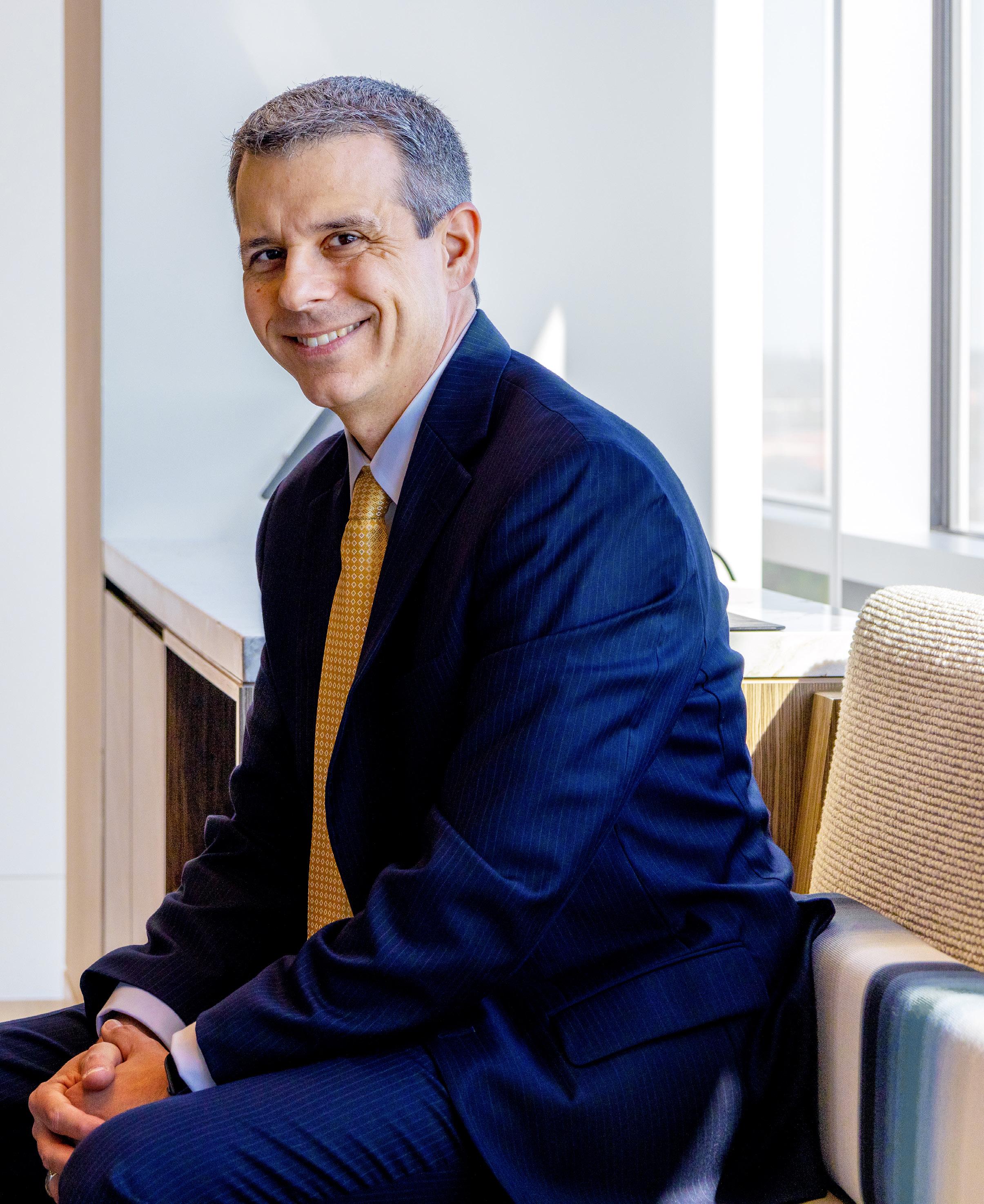 Rigel Crow/Insperity
Rigel Crow/Insperity
Modern Counsel 39
Christian Callens Managing Counsel of Transactions & Corporate Law Insperity
The summer after his first year of law school, Callens clerked for the New Orleans City Attorney’s Office during a very high-profile litigation. It should have been exciting, but Callens was bored out of his mind. What intrigued him much more was the transactional work. After clerking for Judge Minor Wisdom on the Fifth Circuit Court of Appeals, he moved back to Houston with his wife and kids to practice at Mayer Brown. A year later, he joined Skadden as the first lawyer hired for its new corporate practice group in Houston.
At some point during his first years at Skadden, the client turnover of private practice began to feel anticlimactic. Callens aspired to do more. “I had this desire,” he says. “If I’m going to do these deals, wouldn’t it be great to help select the deal and then execute on the business plan for it?” With that in mind, Callens began looking to see what opportunities were out there.
A few years and a few venture capitalist investments for Diverse Networks later, Goldman invited Callens to join Diverse Networks as its general counsel. Founded in the 1990s, the company began by operating wireless data networks for Palm, which was manufacturing the first mobile devices with wireless internet. As the first lawyer at Diverse Networks, Callens worked closely with Goldman to grow the company, eventually moving into the CFO role to help run the business.
After four years at Diverse Networks, Callens rejoined Skadden with a fresh set of eyes to help build a corporate finance practice in Houston. While there, he was introduced to the Houston Pro Bono Joint Initiative (HPBJI), a group that helps engage law firms and corporate law departments in pro bono work, and another organiza-
tion that paired lawyers with start-up nonprofits needing legal assistance. Through these pro bono cases, Callens again had an opportunity to work with a different type of entrepreneur: those seeking to build a “business” that would achieve their charitable mission. As of November 2021, he has been involved with the HBPJI for more than fifteen years.
Even though Callens was happy at Skadden, he missed the days of building a business. But he wasn’t going to leave for just any opportunity. “It’s the age-old adage that wherever you’re going, [you should] run to it,” he says. “Don’t just run away from where you are, because if it’s not something you’re really excited about, you’re going to be just as unhappy.” Callens spent nine years waiting patiently for the right fit until Insperity, a company he drove past every day on his way to work and one that focuses on the small businesses that is part of his DNA, began hiring for the position he currently holds.
In 2014, Callens became the first lawyer with traditional M&A/corporate finance experience to join the legal team at Insperity, which provides HR services to small and midsize businesses. Just a few weeks into his new role as the managing counsel of the transactions and corporate law division, an activist firm came through.
“Suddenly, I’m working side by side with the general counsel on an hourly basis and interacting with the CEO and CFO—all things I expected to happen, but not at that level of intensity and importance a couple of weeks into the job,” he recalls. The situation would prove to be a crucial learning experience and a crucial component of Callens’s success when a leading activist firm, Starboard Value, came to Insperity a year later.
Implement 40
“It’s the age-old adage that wherever you’re going, [you should] run to it. Don’t just run away from where you are, because if it’s not something you’re really excited about, you’re going to be just as unhappy.”
Once Callens took the lead of the transactions group, he noticed that many salespeople were asking the legal department to explain Insperity’s contracts to their prospective clients. “My view was that if legal is involved in the sales process, the process hasn’t gone as smoothly as we’d like. We’re encouraging prospects to hand their HR functions over to Insperity. That takes a lot of trust, but we’re losing credibility if our sales team cannot discuss the contract with the C-level executives of these businesses.”
Callens also knew that this process was not sustainable given the growth projections for the sales organization. At the same time, the company was accelerating its strategy towards its midmarket clients—companies with 150 employees or more that often had their own counsel and asked more questions. Callens’s solution was to train the new business consultants who were focused on this target market to understand and be able to discuss the company’s contract from a business perspective.
“Before we made these changes, every single midmarket client was a huge negotiation,” Callens says. “Now I find out about most midmarket deals when I get internal emails announcing that they signed a new client.” His team has been expanding this approach to the rest of the sales organization.
As a company, Insperity has made significant strides to eliminate manual processes. In his quest for efficiency, the managing counsel’s goal is to implement a contract life cycle management system. The system will help further reduce the involvement of the legal department in the day-to-day sales process and maintain timely transactions.
Thinking less like a lawyer and more like a businessman is what has led Callens on his career path from CFO to private practice and now to Insperity. To this day, his former CEO’s advice remains at the forefront of his mind as he leads his team and helps Insperity make the best choices possible.
Saluting his success. DLA Piper is proud to recognize the accomplishments of Christian Callens and Insperity. We salute your steadfast commitment to delivering exceptional human resources solutions that improve business success. J.A. Glaccum, 1000 Louisiana Street, Suite 2800 Houston, TX 77002 DLA Piper llp (us) 1251 Avenue of the Americas New York, NY 10020 Attorney Advertising | MRS000180366 dlapiper.com DLA
–J.A.
Piper: “I’ve worked with Christian for over a decade, and he possess the invaluable trait of always distilling down legal issues into business practical strategic advice.”
Glaccum, Partner
41
Featuring eight legal leaders who have overcome obstacles and uncertainty by shining in the face of adversity
Kia Williams Mattress Fir m 44 // Adriana Suringa Luedke Lockheed Martin 48 // Alyssa Schindler Chevron 52 // Kellin Chatfield Dexcom 56 // Joseph Zwicker PNC 59 // Adam Schloss The Hertz Corporation 62 // Jennifer Chin University of California 65 // Elizabeth Abbene Coleman Uber 68 //
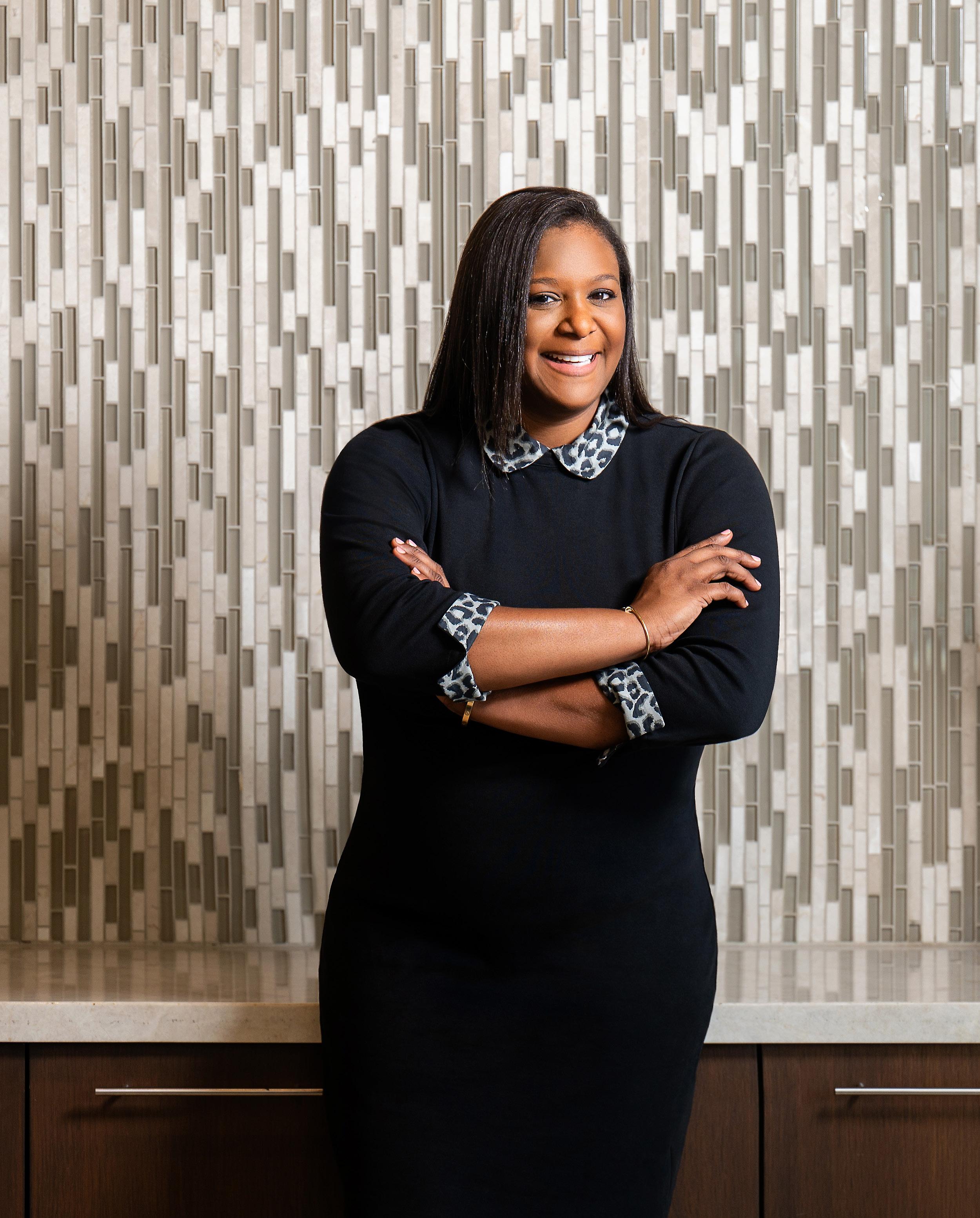
44 // RESILIENCE
Kia Williams Director, Litigation Counsel— Labor and Employment Mattress Firm
David Baker
BEYOND THE COURTROOM
Kia Williams once lived for the thrill of trial, but at Mattress Firm, she is excited to contribute to the strategy that makes the Houston-based company a top national retailer
 By Zach Baliva
By Zach Baliva
ia Williams realized early in life that it was impossible to lie to her mother. Her mom, a family law attorney, always seemed to know when her daughter was being less than honest about anything from friendship to homework.
Growing up with a litigator for a parent brought both challenges and opportunity. In her teens, Williams became a de facto paralegal who helped her mom type motions and prep for cases. The process birthed in Williams a lifelong passion for litigation, which has taken her to top in-house spots at two of the nation’s biggest retailers.
Williams loves applying logic to piece together an argument and try a case. “Some people love skydiving, and others jump off cliffs or ski down a mountain. I chase that same adrenaline rush in the courtroom,” she says, adding that her early career goal was to try as many cases as possible.
She got that chance in St. Louis at Bryan Cave (now Bryan Cave Leighton Paisner), where she eagerly volunteered for every task. Soon, she was taking depositions—and even landed a personal appointment from a federal court to try her own case as a young associate. Once the firm’s partners realized Williams’s energy wasn’t fading, they placed her on important commercial litigation and labor and employment cases, where she started supporting major actions. In just three years, Williams handled multiple depositions and made numerous court appearances.
45 MODERN COUNSEL //
Driven by her hunger to try even more cases, Williams moved to government administration as assistant counselor for St. Louis County. As in-house counsel for Missouri’s largest county, she created employment policies and coordinated all aspects of a high-volume litigation practice.
Williams then returned to the private sector, going in-house to defend Liberty Mutual insureds against liability claims. Two years later, she took a job with Macy’s, the largest department store in the United States.
The move ushered in a new era in her career, as she started advising business leaders and adding related skills and experience to her growing résumé. “I love working in-house at large companies because in-house lawyers aren’t just putting out fires. We’re also preventing fires from happening in the first place,” she explains. The shift, however, was bittersweet. As Williams worked hard to negotiate and settle matters for her one client, she often lost the opportunity to step inside the courtroom.
Williams started looking for another hybrid role where she could stay active in litigation but also create the labor and employment policies that protect employees and help companies thrive. That led her to Mattress Firm, a company
with 2,300 locations and more than eight thousand employees, where she advises business leaders and manages labor and employment litigation.
It didn’t take Williams long to realize she had found her home. “Mattress Firm is special because it has an inviting energy and a welcoming culture,” she says. “I get to be the partner that I want to be here.” Leaders designed the company’s Houston “BEDquarters” to reflect its culture and inspire both collaboration and creativity. The space features an open workspace, a ping-pong table, a graffiti mural, and, of course, a nap room.
Mattress Firm is one of the relatively few large retailers in America with a female general counsel. Williams says that fact demonstrates the company’s commitment to diversity and inclusion, but that commitment goes beyond surface level. Mattress Firm looks for opportunities to integrate diversity and inclusion into everything it does with its people, practices, and how it interacts and engages with its customers. Mattress Firm has employee resource groups and a diversity and inclusion council, where its employees can directly contribute to the organization's diversity plan and make a real impact.
While she’s progressed in her career, Williams has maintained her continuous
learning mindset and still volunteers for stretch assignments. As technology and innovation continue to push labor and employment law forward, she’s learned more about data privacy and related areas. A supportive general counsel, Kindel Nuno, has supported Williams while she has earned certifications in US and EU privacy and data protections. Those certifications have, in turn, led to work on the data governance committee and in developing data management and privacy policies.
Williams is leveraging what she’s learned to help her department and Mattress Firm’s human capital team harness the power of technology and automation. “Some leaders are scared of artificial intelligence, but that fear is misguided,” she says. “AI is going to be a support and not a replacement.”
According to Williams, advanced tools can streamline processes, reduce repetitive tasks, and increase job satisfaction, as employees no longer have to manually comb through layers of data. Chatbots and other implementations make the hiring process easier for prospective employees.
Within the legal department, Williams hopes to use AI in a variety of ways. She says it won’t be long until computer programs input data and spit out settlement
I love working in-house at large companies because in-house lawyers aren’t just putting out fires. We’re also preventing fires from happening in the first place.”
46 // RESILIENCE
numbers at multiple points in a case. For now, she’s capitalizing on every opportunity technology presents while shaping Mattress Firm’s data privacy and cybersecurity controls to match state-led laws until the day a federal standard emerges.

Although Williams has taken on a growing list of roles and responsibilities, she still gets the occasional opportunity to work as the lead in litigation. While serving as first chair and winning a jury verdict may always be her true passion, Williams has made herself into more than a talented litigator—she’s a leader, advisor, strategist, and true business partner.
Akerman LLP:
“Given Kia's track record at two of America's largest retailers, it’s no surprise that she's being recognized as a strategic player in our industry. She is a demonstrated problemsolver and top-notch litigator. Most importantly, she gets things done.”
–Erica Mason, Partner
47 MODERN COUNSEL // Akerman
Kia Williams
Mattress
opportunities,
barriers to innovation and growth. Erica
Atlanta, GA 404 733 9800 erica.mason@akerman.com
Lawyers 24 Offices akerman.com
Akerman LLP. All rights reserved.
applauds
for her visionary leadership and impressive career. We are proud to work with Kia and
Firm. We
help the world’s most successful enterprises to navigate change, seize
and overcome
V. Mason
700+
©2021

48 // RESILIENCE
Elliott O'Donovan
Adriana Suringa Luedke knows how to engage, negotiate, and turn on a dime at Lockheed Martin
By Billy Yost
driana Suringa Luedke, director and associate general counsel of IP and technology law at Lockheed Martin, is very detail-oriented. But the sheer diversity of legal matters on which she works makes it sometimes difficult to play back everything her workday involved around the family dinner table.
“There are days that I couldn’t tell you a single thing that I did,” Luedke says, laughing. “I work with a lot of different people on a lot of different projects, and as a result of that, I’ve learned to change channels a lot.” It’s a metaphor the lawyer has coined over the years as it’s become abundantly clear that her ability to switch focus on a dime is both her superpower and an absolute necessity for an in-house role at a company whose interests are as varied and complex as Lockheed Martin’s.
In discussing what’s currently on her docket, Luedke has to stop herself; listing the types of matters she’s currently working on could take over the entire conversation. There is just that much.
Luedke is Lockheed Martin’s legal point of contact for large vendor contracts with companies like Microsoft and Amazon Web Services. These contracts are complicated and include intellectual property and data security issues that need to be overseen by someone who can provide legal guidance on finding common ground.
In addition to providing support to Lockheed Martin’s enterprise business and digital transformation and data governance functions, she also advises teams working to harness the latest technologies in areas such as 5G networking, advanced computing, and artificial intelligence (AI).
In a recent example, the AI team is developing a cognitive model to help analyze and forecast the spread of forest fires. “We want to try and predict and contribute to local, state, and federal firefighting entities to analyze data and help predict where future fires may occur,” Luedke says. “I’ve been supporting the third-party relationships we’ve enlisted in that endeavor.”
The lawyer also supports the company’s active relationship with the Aerospace Industries Association, a collection of stakeholders in the industry that do business with the United States government. Luedke currently serves as vice chair of the AIA’s IP Committee. The week before this interview, she participated in a virtual workshop held by the Air Force Material Command on improving ways of working in digital development and delivery environments.
“Whenever new regulations are proposed, or we need to address evolving challenges as in this instance, or if there is something we want to communicate across the industry, this forum allows
49 MODERN COUNSEL //
Adriana Suringa Luedke Director and Associate General Counsel, Intellectual Property & Technology Law Lockheed Martin Corporation
the government and industry to work together,” she explains. “When it comes to issues like digital delivery, we’ve gone from a situation where deliverables used to be discrete items that you could box and hand over, and now we have fully interactive digital environments being accessed in real time by multiple parties with differing interests and levels of access. It’s a big challenge for the government to accommodate these environments, and we’re helping them figure out how to make it work.”
Luedke also has a deep interest in mediation, which, together with her wealth of IP and technology experience, may explain why she’s so effective at tackling so much. In 2018, the attorney completed Harvard Law School Negotiation Institute’s Dispute Mediation Program as well as advanced mediation training by the American Bar Association.
“These skills are very helpful in getting parties in a room to talk about what their needs are and getting them to mutually invest in solutions,”

You want to engage people in discussion so you can see where their issues are. Sometimes it takes a bit longer, but then it becomes a true conversation among stakeholders.”
50 // RESILIENCE
Elliott O'Donovan
Luedke explains. “I really enjoy it because I find that I’m able to facilitate those discussions and get two parties to find a way forward together. It’s something I take a lot of pride in and something that motivates me.”
This also speaks to Luedke’s skill as a listener, which she relies on to engage with those bringing her questions. “To solve complex issues and problems, it has to be an interactive discussion,” the lawyer says. “It’s not a situation where people come to you for an answer, you give it, and they go away. It is really important to talk through issues and possibilities and build a solution together.”
Even with her depth of expertise, Luedke says that she frequently asks what may seem like rudimentary questions to get perspective, learn more, and help create a relationship that can ultimately lead to positive outcomes.
“I’ve learned that I need to ask basic questions to get people aligned, and I often repeat back what I’ve heard to make sure that I’m understanding it correctly,” Luedke says. “It opens up an iterative process that, many times, allows the participants in the conversation to develop some new insight as to where others are coming from. You want to engage people in discussion so you can see where their issues are. Sometimes it takes a bit longer, but then it becomes a true conversation among stakeholders.”
Hogan Lovells:



















“Adriana has a deep understanding of intellectual property and technology issues that are critical to Lockheed Martin’s operations and strategic plans. She is an ideal partner to internal clients and outside counsel alike.”

–Meryl Bernstein, Partner







in recognizing Adriana Luedke on the many accomplishments during her distinguished career. Hogan Lovells is proud to join Modern Counsel Hogan Lovells is an international legal practice that includes Hogan Lovells International LLP, Hogan Lovells US LLP and their a liated businesses. Images of people may feature current or former lawyers and employees at Hogan Lovells or models not connected with the rm. www.hoganlovells.com © Hogan Lovells 2021. All rights reserved.
THE EXPAT
Senior
Counsel
Alyssa Schindler
has adventure in her veins. Now, she’s helping Chevron open new oil and gas opportunities in the booming African town of Lagos.
By Zach Baliva
ATTORNEY
t takes six attempts (and several call failures) to reach Alyssa Schindler for her Modern Counsel interview, as the senior counsel has just arrived in Lagos, the largest city in Nigeria, and is still in quarantine. She’s not there to experience the Calabar Carnival, to explore breathtaking landscapes, or to go on a safari—she’s in West Africa to negotiate government contracts on behalf of Chevron.
While the expatriate assignment would intimidate some lawyers, Schindler calls it a dream job. She’s been a traveler and selfproclaimed wanderer her whole life. It’s in her blood. Schindler grew up in Reno, Nevada, as the daughter of a single mother who was always in search of a better life. That search took Schindler from Nevada to California to Hawaii to Louisiana, all before her high school graduation.
Schindler didn’t grow up with the latest gadgets and luxuries, but she did have a TV. She remembers watching Corbin Bernsen and Jimmy Smitts on LA Law. “I decided early on that I wanted to go to law school because I saw the opportunity to change the trajectory of my life through education,” she says.
Few in Schindler’s family had been to college, and even fewer had pursued advanced degrees, but nothing could deter her. She completed her undergraduate studies in French (which included a year abroad), applied to the George Washington University School of Law, and hit the streets of DC with nothing but five hundred dollars in her pocket.
While her classmates settled into apartments and dorms, Schindler took shelter in a local hostel. Days later, she discovered bed bugs. Suddenly, the young and determined
52 // RESILIENCE
Alyssa Schindler Senior Counsel Chevron
student was homeless. After a few nights spent sleeping in a chair and losing herself in legal textbooks, she found a roommate and settled into the college experience.
In her third year (while also managing the front desk of her building and working as a research assistant), Schindler clerked for Joel Greene, an attorney who represented a large public power utility in natural gas pipeline contract proceedings. Working for a solo practitioner helped her learn everything from client management to billing to the day-to-day of running a legal practice. She followed Greene to a firm, gained more experience in natural gas litigation, and later went in-house with NiSource, where she negotiated large commercial agreements, led compliance training programs, won settlement agreements, and helped form core business strategies.

I decided early on that I wanted to go to law school because I saw the opportunity to change the trajectory of my life through education.”
53 MODERN COUNSEL //
Calvin Pennick, Jr.
In 2015, Schindler joined Chevron for the chance to work for a multinational organization. She started as the lead attorney for regulatory and commercial matters for Chevron Pipeline Company’s assets in the Gulf of Mexico before moving to the organization’s midcontinent business unit, where she’s coordinated several multimillion-dollar midstream transactions.
Schindler was growing in her career and flourishing as an in-house attorney, but her hunger for adventure never faded. “I’ve always wanted to see the world and experience new cultures, and I don’t think we have to save that to do strictly on our off days or upon retirement,” she says. “I wanted my love of travel to come into my professional life, and I made that desire known.”
Department leaders and immediate supervisors supported Schindler’s goal and helped her prepare. “I knew that if I wanted an international assignment I would have to work harder, so that’s what I did,” she says. She pushed herself to study all facets of the business from pipeline to production, raised her hand for projects with cross-functional teams, bulked up on
knowledge about upstream gas and oil exploration, and volunteered to chair an internal pro bono committee.
Although Chevron has been active in the region for six decades, the Nigerian government just passed the Petroleum Industry Act (PIA), which created a whole new legal, governance, and regulatory framework. Chevron needed a new legal leader in the field, and Schindler was ready. She’s now getting in place to understand PIA’s impact, support regional colleagues, facilitate connections with other business units, and bring the operational expertise necessary to produce the energy that will propel local communities forward.
Schindler expects life in Lagos—a metro area with twenty-four million people—to be challenging and rewarding. She’s planning to remain flexible in both her personal and professional lives. “People working abroad shouldn’t expect to duplicate their normal routines, and I see this as a chance to make my role into something special,” she says, adding that she’s less focused on herself and more focused on helping Chevron reach its goals and supporting her direct reports. She
I wanted my love of travel to come into my professional life, and I made that desire known.”
54 // RESILIENCE
also hopes to find unique opportunities to offer pro bono legal services in her host country.

In companies like Chevron, foreign assignments typically last three or four years. Schindler doesn’t know exactly what projects she’ll be working on or even how long she’ll be in Africa. She’s OK with the uncertainty. “Narrow expectations often lead to disappointment,” she says. “If your eyes are fixed on just one destination, you might miss some really interesting detours along the way.” Schindler’s eyes are wide open, and she plans to travel the road less taken.






MODERN COUNSEL // 55 Baker Botts is proud to recognize the accomplishments of Alyssa Schindler and the entire Chevron legal and commercial team. AUSTIN BRUSSELS DALLAS DUBAI HONG KONG HOUSTON LONDON MOSCOW NEW YORK PALO ALTO RIYADH SAN FRANCISCO WASHINGTON Adam Rankin 505.954.7294 110 North Guadalupe, Suite 1 Santa Fe, NM 87501 WE ARE PROUD TO PARTNER WITH ALYSSA SCHINDLER CHEVRON AND THE TEAM
Baker Botts L.L.P.:
Alyssa is a top-notch lawyer. She quickly converts the analysis of complex legal issues to practical solutions for her team. Alyssa is an overall positive person and a joy to work with.
“YOU HAVE TAKES” WHAT IT
As vice president and general counsel of international business at Dexcom, Kellin Chatfield Nicoletti helps push out new products, increase innovation, and expand into new markets.
By Zach Baliva
ccording to the Census Bureau, more than one in three lawyers working in the United States are women. While their numbers are increasing, male lawyers still earn more than their female counterparts. But Kellin Chatfield Nicoletti isn’t concerned about the stats— Dexcom’s divisional general counsel is willing to let her performance speak for itself.
Nicoletti dropped her daughter off at school and rushed back to her home office to talk with Modern Counsel about her experience as an accomplished woman litigator turned trusted in-house advisor. “Things are changing for women in law firms and corporate positions,” she says. “You no longer have to choose between career and family.”
Nicoletti was a history major and collegiate athlete at UCLA and later earned a JD at Harvard Law School. Before going in-house, she started her career at two major firms and remembers talking to friends who faced the repercussions associated with getting preg -
nant. “Their coworkers assumed they would go out on leave and never come back. Others were removed from trial teams and stripped of duties on interesting projects and cases,” she says. Nicoletti even substituted for others who found themselves in those situations.
Dexcom, by contrast, has been supportive of Nicoletti’s dual roles as general counsel and mother. She joined the organization in a more junior role and was promoted twice in three years. Two of those moves happened while she was expecting, and she’ll welcome another in 2022. “I’m grateful to be part of an excellent company, and I’m glad that we’ve made progress as a profession and as a society,” Nicoletti says.
She’s leading a legal team that’s built to keep up with a fast-paced company. Advanced technologies like an innovative continuous glucose monitoring (CGM) device have made Dexcom into a leader in diabetes care. The company’s CGM system increases efficacy
56 // RESILIENCE
and quality of life for patients who no longer need to use the outdated and painful finger prick to measure their glucose levels. Dexcom’s small sensors collect robust datasets medical professionals can analyze to improve treatment plans. These benefits, together with a ubiquitous marketing campaign featuring musician Nick Jonas, have attracted a loyal customer base and increased popularity. In 2018, the relatively young company founded in 1999 had 3,900 employees and over $1 billion in revenue.
Nicoletti originally came to Dexcom to evaluate new markets and support the medical device company’s expansion into Europe. She mastered the European Union’s General Data Protection Regulation and other international guidelines to advise Dexcom while building the teams and legal framework behind a new construction facility in Malaysia and new business centers in Lithuania and the Philippines. Just three years after Nicoletti’s arrival, Dexcom has expanded its direct sales footprint and has strong partnerships with distributors who are selling its products throughout APAC, Europe, and the Middle East.
A small internal team of three lawyers, two contract managers, and one paralegal—together with an effective network of outside firms and advisors—help Nicoletti manage all legal matters involved with these and other important initiatives. She’s also building out international teams that will take on an increased role as Dexcom invests more in global markets. As the company increases in size and the department increases in volume, automation of routine forms

57 MODERN COUNSEL //
Kellin Chatfield Nicoletti General Counsel, EMEA, LATAM, APAC, Litigation & Employment Dexcom
Mike Wolf Soriano
and other improvements will bring efficiencies of scale.















The size of the team and the scope of the work provides many opportunities for everyone in the department to grow as they take on new challenges and acquire new skills. Nicoletti works to make sure she and those on her team maintain good relationships with their counterparts in various business units. “We have to really dig deep and understand the timelines, challenges, requirements, and priorities of our colleagues,” she says. “If we don’t do that well, we are missing the chance to provide the kind of strategic advice that can drive results.”
The ongoing COVID pandemic makes collaboration more difficult, especially for a large company with a global footprint. Nicoletti is painfully aware of “Zoom fatigue” as employees enter their second year filled with remote meetings. In response, she’s shortening online sessions and restructuring meetings to cover specific topics in a focused way.



Nicoletti’s leadership has helped Dexcom achieve its important growth goals over the last three years. She’s thriving as an in-house legal leader when there are just 136 women GCs in the Fortune 500. However, most US law students are female. For them, Nicoletti has some simple advice. “Say yes to every opportunity that comes your way,” she says. “And know that you have what it takes.”






58
// RESILIENCE
Things are changing for women in law firms and corporate positions. You no longer have to choose between career and family.”
One thread has connected Joseph Zwicker’s journey from private practice to legal services to federal government to PNC—a commitment to ethical treatment and fair play for all
By Zach Baliva
oseph Zwicker was traveling on the night of May 17, 1990, when, shortly before midnight, the young attorney stopped to make a phone call. He dialed the Louisiana State Penitentiary, a maximum-security facility in Angola, and was put through to Dalton Prejean, who was scheduled to be executed in an electric chair moments later.
Zwicker was one of several callers. Prejean had already talked to Buddy Roemer, the governor who rejected his own state pardon board’s recommendation for a commutation. The inmate was only seventeen years old when he shot and killed a state trooper during a traffic stop.
Zwicker and other defense lawyers argued for ineffective assistance of counsel. Prejean, they said, suffered brain damage due to childhood trauma and had an IQ of just seventy-one.
The Louisiana Supreme Court and the US Court of Appeals turned down challenges to Prejean’s conviction. The US Supreme Court voted seven to two to deny a stay. Zwicker, who had become friends with the man he had worked so hard to defend, had no choice but to say his goodbye. Prejean was pronounced dead at 12:21 a.m.
Fast-forward thirty years, and Zwicker’s career looks a little different. He’s no longer defending individuals or
59 MODERN COUNSEL //
working in a law firm; he’s defending the interests of the fifth-largest bank in the United States. Zwicker is PNC’s deputy general counsel of government and regulatory enforcement, litigation, data security, privacy, and investigations.
Those looking on might assume the role stands in contrast to the work Zwicker did earlier in his career, but he would disagree. “PNC is an ethical institution that cares about its customers, and it’s important to have someone in my role who can stand up to ensure fairness, fair play, and fair processes in any venue,” he says. “Those values have guided me throughout my entire career.”
It’s been a natural evolution. Zwicker studied law at New York University, clerked for the Honorable Max Rosenn in the federal appeals court, and spent time in private practice before moving to Boston to litigate civil rights cases on behalf of state prisoners. He won sentencing credits for prisoners who went through substance abuse programs and stacked up other accomplishments in the low-paying but fulfilling job. When his funds were depleted, Zwicker returned to private practice before joining the US Attorney’s Office for the Central District of California, where he spent six years prosecuting major fraud cases before federal juries. In 2005, Zwicker returned to his East Coast firm before PNC recruited him in 2012.
Zwicker has always identified with the outcasts and the outliers in society. “I may be a lawyer at one of the biggest banks in the nation, but I still try to speak for the underdog,” he affirms. His work at PNC is designed to ensure that everyone the bank interacts with plays by the same rules so that no groups, clients, or individuals are mistreated.
Ten years ago, PNC was a smaller financial organization navigating the global financial crisis that dominated 2008 and
2009. During that time, PNC acquired a regional midwestern bank known as National City Corporation. The deal gave PNC a bigger footprint, catching the attention of regulators who had concerns related to antitrust issues in markets where both legacy companies had a presence. The Department of Justice forced PNC to sell certain branches before the deal closed. With the integration complete, PNC was on a new path as a national player.
Faced with increased risk and scrutiny, the bank needed someone who understood regulations. It needed someone who understood government agencies. It needed someone capable of defending the underdog. It needed someone like Zwicker. He stepped in to build a new function to respond to outside investigations and manage government and regulatory enforcement.
Previous experience and knowledge of the SEC and regulators guided Zwicker from the start. He established a tone of honesty and transparency in the group and cultivated the right outside relationships to position PNC as a good corporate citizen. Zwicker credits PNC’s leaders with establishing a clear vision and clear expectations. “Everyone will tell you that culture starts at the top. Our CEO is a relentless advocate and believes that PNC is an institution we should all be proud of,” he explains.
Jonathan Moses, a partner at Wachtell, Lipton, Rosen & Katz, firmly believes that Zwicker’s abilities have benefited the company. “Working with Joseph and his team is truly a collaborative effort. Joseph brings extraordinary judgment and experience to bear on every matter, with a focus on making sure that PNC is doing what is right for its customers,” Moses says. “I have been lucky to work with him since he joined PNC.”
Zwicker has grown his team to include thirty people whose various backgrounds
drive overall results. “I don’t lead with a predetermined idea about what kind of historical experience will necessarily make someone successful here,” he says, adding that he makes an effort to identify talent and move people into positions where they can uncover new opportunities. Some former civil litigators are leading investigations. A younger lawyer now oversees many other lawyers and operates as one of Zwicker’s key managers.
It’s a merit-based team where high performers are rewarded for their hard work. That’s important for a group that needs to keep pace with an evolving bank. Zwicker’s own role has grown beyond internal investigations, reviews, and regulatory matters to include data security, privacy, and litigation. He therefore must trust others to handle many of the day-to-day operations.
In June 2020, PNC finalized the acquisition of BBVA’s US banking subsidiary. Zwicker is now helping the institution complete a successful integration. He’s analyzing legacy litigation portfolios, onboarding new lawyers to PNC’s culture, and monitoring any issues that arise from plaintiffs, FINRA, the SEC, the DOJ, and other bodies.
Zwicker never lost his passion for the underdog. He makes time for pro bono work and sits on several nonprofit boards, including one that supports recently resettled refugee and immigrant families. The job at PNC is a demanding one, and although Zwicker doesn’t have much time to watch TV, he did happen to catch a recent episode of a Dateline NBC show called Life Inside in which Lester Holt visited Angola Prison. Zwicker watched with amazement as Holt interviewed someone who Zwicker himself met thirty years ago. Dalton Prejean, Jr. is serving fifty years for manslaughter. Zwicker plans to visit him as soon as the facility’s COVID19 restrictions are lifted.
60 // RESILIENCE
WACHTELL LIPTON THANKS THE AMERICAN LAWYER FOR HONORING US AS A FINALIST FOR CORPORATE DEPARTMENT OF THE YEAR. WE CONGRATULATE THIS YEAR’S HONOREES. 51 WEST 52ND STREET, NEW YORK, NY, 10019 | TEL: 212.403.100 | WWW.WLRK.COM Wachtell Lipton congratulates Manav Kumar of AECOM on his leadership, accomplishments and recognition by Modern Counsel. We are proud to partner with Manav and his team on transformative transactions. 51 WEST 52ND STREET, NEW YORK, NY, 10019 | TEL: 212.403.100 | WWW.WLRK.COM Wachtell Lipton congratulates of PNC on his leadership, accomplishments and recognition by Modern Counsel. We are proud to partner with Joesph and the PNC team on transformative matters. Wachtell,Lipton,Rosen & Katz
n October of 2021, Hertz announced a partnership that made news far beyond the auto industry—and for good reason. The car rental company placed an initial order of one-hundred thousand new Tesla electric vehicles, a move that will eventually make EVs a significant part of Hertz’s entire fleet. The company teamed up with superstar quarterback Tom Brady to publicize the campaign.
Hertz also announced that the EV investment entails installing thousands of charging stations in more than one hundred markets by the end of 2023 and will create expedited booking processes through its app for electric vehicles.
The move is a landmark moment both for the rental industry and for the future of electric vehicles across the world. Assistant General Counsel Adam
By Billy Yost
Schloss says it’s the perfect time for the company to continue to redefine the future of mobility.
“Hertz has always been a leader in the rental car industry,” Schloss says. “As the company continues to become even more customer-focused and technology-focused, the industry has certainly taken note. These new investments and partnerships represent just one more example of Hertz leading into the future and helping shape what the new mobility space is going to look like.”
Schloss came to Hertz at another pivotal moment in the company’s history. When the company relocated its Park Ridge, New Jersey headquarters to Estero, Florida, it brought a fresh injection of new blood and ideas (while maintaining critical institutional
knowledge). The law department was no different, and Schloss says it’s been an ideal environment to learn the nuances of the rental car industry while being a proactive litigator and business partner.
“I love being an in-house attorney and being part of the business,” Schloss explains. “I get to see disputes and strategic projects from inception all the way through, and it’s typically as part of a cross-functional team. It’s always imperative to help work through issues at the outset rather than waiting for an email or phone call about a problem that’s come up at crunch time.”
The lawyer says that being proactive is where a true in-house professional adds value. In an industry with millions of customers in hundreds of thousands of vehicles across the US and worldwide,
Adam Schloss is helping Hertz keep up with rapidly changing laws around technology while redefining the rental car industry
62 // RESILIENCE
the idea of proactivity may seem all but impossible. But Schloss says that by putting his past experience to work while continuing to build out professional relationships that will help him learn the complex industry even better, he’s accomplished just that, but he still learns something new every day.
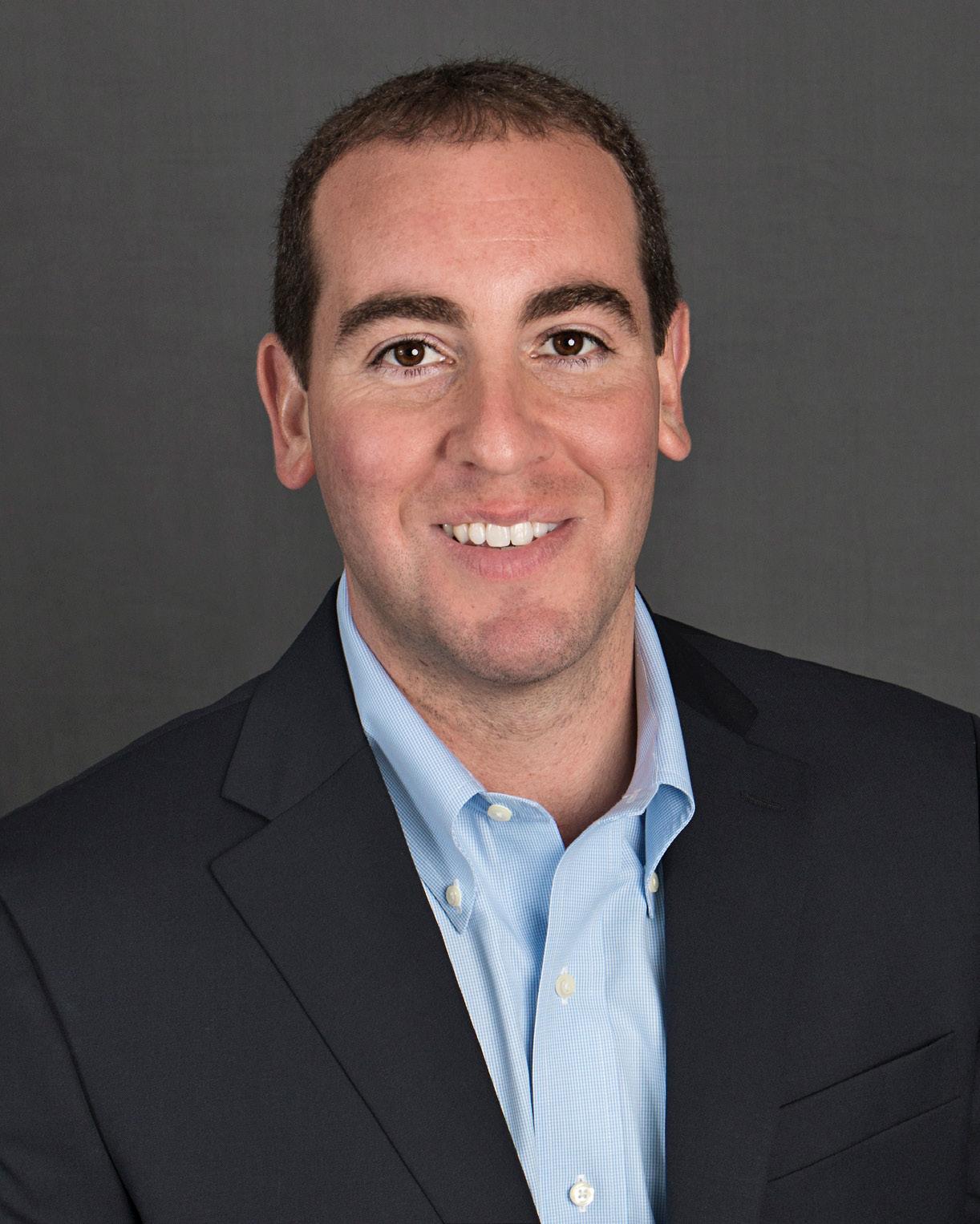
Schloss’s early experience at a boutique law firm was almost like a prep course for in-house work. He worked on everything from litigation to transactional work, driving up and down the I-95 in South Florida for court dates but still managing to build out expertise that would make him an ideal fit for an in-house leader.
“I was lucky enough to be at a small firm that had pretty significant clients with diverse legal issues,” he says. “I was able to become somewhat of a generalist; you just have to learn to take on a lot of different things all at once.”
After moving on to a large firm for a couple of years and a short stint in the Washington, DC area, Schloss came
These new investments and partnerships represent just one more example of Hertz leading into the future and helping shape what the new mobility space is going to look like.”
63 MODERN COUNSEL //
Adam Schloss Assistant General Counsel The
Hertz Corporation
Courtesy of Adam Schloss
to Hertz in 2015. There, a variety of challenges keeps him engaged and excited about his role. As tech continues to play a more and more prevalent role in transportation, evolving data and privacy laws are keeping Schloss and the entire legal team on their toes.

“Hertz is at an intersection with millions of customers, hundreds of thousands of vehicles, and an increasingly large amount of data and complexity,” Schloss explains. “There are so many interesting legal questions here, and there are so many cutting-edge legal discussions happening right now around mobility, data collection, biometrics, and how they apply to different standards around the world.”
Schloss says he starts work every day with a list of ten to fifteen items he’d like to prioritize. “Once the emails and Microsoft Team chats get started, I’m lucky if I get to a quarter of the list,” he says, laughing. “There are so many challenges coming through the door, and we’re not just an organization that likes to move fast, we’re one that’s operational 24/7, 365.”
Schloss is used to moving fast. He’s got three kids under the age of seven. When he’s not contemplating pending litigation or the future of mobility, the AGC is likely outdoors with his family or catching a quick run or bike ride. One gets the impression that he was born to juggle a million things at once, both on the clock and at home.
NORTH AMERICA EUROPE ASIA winston.com
Winston & Strawn applauds Adam Schloss for his vision, leadership, and commitment to Hertz .
// RESILIENCE
Jennifer Chin spent the beginning of her career searching for a legal role that was the right fit. She’s found it at the University of California, where she works to keep the campuses safe and healthy.
By Keith Loria
lthough she’s now a legal eagle serving as principal counsel, labor and employment for the University of California, there was a time in college when Jennifer Chin wasn’t sure what she was going to do with her life.
“I didn’t set out to be a lawyer at all,” she admits. “I was thinking of going to grad school in psychology, and I think what I’m doing now is a really good blend of being a lawyer and working with more basic social and cultural issues.”
She loves what she does now, but it was never a goal she set for herself. “When I look back on my career, I took a winding path to get here,” Chin explains. “Along the way, I reevaluated what it is that I enjoy spending my time doing.”
After graduating from Stanford and getting her law degree from the University of Michigan in 2000, Chin worked as a law clerk for the US District Court in the Northern District of California under the Honorable Martin J. Jenkins and then spent four years as an associate at the firm Thelen Reid & Priest. But she found she wasn’t getting the satisfaction she was looking for.
“Being a litigator wasn’t a good fit for my personality; I felt like I was fighting with people all the time,” Chin says. “I decided I wanted to go into public service because I wasn’t motivated by the monetary compensation of the career. At the end of the day, I wanted to look back and know it was something I enjoyed spending my time doing.”
So she joined the Oakland City Attorney’s Office as a deputy city attorney and spent the next six years working to help people. “I had a former colleague who was working there who I knew, and she was really enjoying it. We shared the same interests in public service and public policy, so I thought it would be something to try,” Chin says. “I ended up really enjoying it.”
Chin had applied to the University of California, Office of the President, a few times through the years, impressed by the institution’s reputation and appreciating the convenience to where she lived (she grew up in the Bay Area and has been based there since college). She eventually got the call in 2012 to be a part of the labor and employment team.
65 MODERN COUNSEL //
Chin Principal Counsel, Labor & Employment UC Legal—Office of the General Counsel University
“They have hundreds of thousands of employees—it’s a huge institution, so being able to work in an environment with the breadth of jobs and roles they have, all the people who make the campuses run; it was just a great opportunity,” Chin says. “No two days are alike, and I like that.”
She works in the Office of the President alongside several other lawyers, and the team collaborates with and supports different UC campuses; each has multiple subject areas of expertise and supports labor relations in working with systemwide labor unions. “I’ve had the opportunity to work with all the different attorneys on campuses and at the Office of the President, so I feel like I’ve learned so much,” she says. “I’m now one of the more senior people in the office, so in terms of institutional knowledge, I feel I’m someone who people turn to when they need the history on a particular policy or how a collective bargaining agreement has evolved.”
In her system-wide role, Chin works with people all through the state of California. When the pandemic hit, things became even more virtual. Still, the job didn’t change too much because a lot of her communication was already through calls.
However, she does admit it feels strange not going into the office and seeing people face-to-face. “A lot of people I consider friends, as well as colleagues, and it’s been a challenge for everyone,” Chin says. “But we’re fortunate we can work remotely.”

I decided I wanted to go into public service because I enjoy supporting a mission-driven organization, and I wasn’t motivated by the monetary compensation of the career.”
66 // RESILIENCE
Jennifer
of California, Office of the President
Larry Zhou
The University of California also has its own health system and medical centers, with UC Health being at the forefront of caring for patients, pandemic mitigation efforts, and research. Therefore, the vaccine policy for the system was developed in close partnership with those in the health system and leadership at the campuses, where the policy would ultimately be implemented. In terms of implementation, Chin has worked closely with her UC Legal teammates in working with the campuses in terms of policy enforcement and compliance. The compliance rates with the vaccination policy have been high.

Early on in her career with the university, Chin worked with the campus Title IX Offices, responsible for addressing sexual harassment and sexual violence complaints, and there was a lot of activity in the Title IX space at the time. Although it wasn’t something Chin had a lot of experience in on the education side, she had done plenty of training on sexual harassment prevention when she was at the City of Oakland.
“I jumped right in and felt it was important work,” she notes. “In 2013, the Clery Act was revised through the reauthorization of the Violence Against Women Act and there was huge change in regulations, which resulted in improved policies and training, and how we handle complaints.”
That’s one of the things she’s most proud of during her career, and she continues to make a difference in that work. “I really like what I do,” Chin enthuses. “I enjoy supporting the mission of the university; there are so many ways an educational institution gives back, and I really enjoy supporting those goals.”

67 MODERN COUNSEL //
info@sloansakai.com sloansakai.com AREAS OF PRACTICE: • Employment • Environmental/CEQA • Government • Investigations • Labor Relations & Collective Bargaining • Litigation • Workers Compensation Carve-Outs • Nonprofit Services • Consultant Services
At Sloan Sakai Yeung & Wong LLP, our goal is to help you solve the complex problems facing your organization so that you can accomplish your mission.
Because Uber’s technology and services are so innovative, they sometimes aren’t covered by existing law. Elizabeth Coleman helps keep the company on solid legal footing.
 By Frederick Jerant
By Frederick Jerant
urning from psychology to law was a natural progression for Elizabeth Abbene Coleman.
“I took some time off after receiving my undergraduate degree, and I had been leaning toward getting my doctorate in that field,” she explains. “During my break, I worked at the Center for Conflict Resolution, a nonprofit in Chicago that offers alternative dispute resolution services. One of the programs that I worked on focused on diverting juvenile offenders from the court system into more productive outcomes.”
But that experience also exposed her to the workings of the legal system, “and that really
Elizabeth Abbene Coleman
68 // RESILIENCE
Associate General Counsel—Litigation, Global Competition, Government Investigations & Special Matters, and IP Uber Technologies Inc.
Susan Andrews
changed my perspective,” she notes. “I realized there’s an intersection between psychology and the law—both fields involve counseling and both have a serious human connection.”
Coleman says that it’s good to take a step back instead of going straight to grad school and some law schools won’t admit students on that direct path. She later earned her JD from Loyola University’s Chicago School of Law. She spent the next twenty-two years at Jenner and Block, the last fifteen years as a partner in the firm.
Jenner and Block handles a variety of commercial litigation cases, including on behalf of many tech companies. Oddly enough, the law firm represented Uber at the time—but Coleman never worked on any of those cases.
She adds that then-chairman Tony Valukas was one of her key mentors. “He supported me and brought me in on so many interesting and challenging cases,” Coleman recalls, “and I learned so much from him. He is an amazing leader and mentor, with a strong sense of ethics and a ‘do the right thing’ approach to every matter. His approach to leadership and values mirrors that of Tony West, Uber’s chief legal officer, which is one of the things that attracted me to the company.”
With nearly a quarter-century of experience at Jenner, Coleman wasn’t particularly interested in leaving the firm. Then a former colleague who was at Uber Technologies Inc. offered to pitch Coleman as a potential candidate for Uber’s associate general counsel. She casually green-lit the referral because after all, “it never hurts to talk.”
Uber contacted her and, as discussions evolved, Coleman realized she’d have a chance to build a legal team in an exciting, innovative industry. While Uber is perhaps best known for its ride-hailing platform, the company is also involved in food delivery, package delivery, couriers, freight transportation—even electric bicycle and motorized scooter rental through a partnership with Lime.
While private-practice attorneys often develop a yen for in-house work, Coleman’s initial reaction was the opposite. “At Jenner, I was accustomed to having clients in many different industries—tech companies, healthcare firms, energy suppliers— and I really liked having a birds-eye view into the businesses and operations of a wide range of industries,” she says.
Turns out that having a single client isn’t boring at all.
“Now I feel like I’m an extension of the business, helping it realize its vision across all of its business lines and products,” she says. That broad business base means her job is complex and challenging: “Even after two decades of practice, I’m still growing, and in ways I would not have if I’d stayed with a law firm.”
As associate general counsel for litigation, global competition, government investigations & special matters (GI&SM), and intellectual property, Coleman’s plate is filled with commercial litigation, antitrust and competition matters, agency proceedings, compliance, and counseling. She also is responsible for protecting Uber’s various technologies and brands, and the company’s GI&SM team oversees government investigations and inquiries.
69 MODERN COUNSEL //
Diversity, equality, and inclusion are part of Uber’s DNA, and it’s important that our vendors represent our values.”
“Elizabeth is a fantastic partner who is smart, resourceful, and brings real practical insight to the job,” says Andrew Finch, co-chair of the Antitrust Practice Group and a partner in the Litigation Department at Paul, Weiss, Rifkind, Wharton & Garrison LLP. “She has a terrific sense of judgment and is always open to exploring the most creative solutions to seemingly intractable problems.”
Coleman’s staff of fifty is mainly comprised of attorneys, with key support from paralegals, applied scientists, operations, and related functions. Uber also relies on about two dozen carefully vetted outside law firms within its “preferred counsel” program, which requires firms to consistently meet a high bar when it comes to DE&I.
“Diversity, equality, and inclusion are part of Uber’s DNA,” Coleman says, “and it’s important that our vendors represent our values. That’s why we insist on outside counsel making DE&I a priority at their own firms.”
Coleman says Uber’s goal is to drive practically all of Uber’s outside counsel work to these firms. “The feedback from them has been amazing,” she says. “In many instances, our preferred counsel program has driven systemic internal changes at law firms—more diversity in
leadership, for example, and a more inclusive approach to staffing.”
While risk assessment is common for in-house legal teams, Coleman’s group often faces a shifting vista of uncertainty.
“We aren’t dealing with technology or programs that have been around for a hundred years,” Coleman says. “Because innovation often occurs ahead of laws, we frequently operate in a novel space, relying on parallel situations in other industries. And the outcomes of such ‘first impression’ legal matters can affect the creation of new laws that will affect us and our competitors.”
Uber’s atmosphere is refreshing, too. “At a law firm, you focus on your own progression—work hard, climb the ladder, make partner,” she says. “But I felt the focus shift at Uber. Now my team’s success is more important than my own. And that ethos comes from Tony West. He is vigilant about identifying growth opportunities, and is laser focused on the team’s development and progression, and that mindset flows through the entire organization.”
Jenner & Block:
“Elizabeth is a champion of women and diversity, and a great leader of her diverse and talented team. It has been my pleasure to work with her both in private practice and now at Uber.”
–Katya Jestin, Co-Managing Partner
In many instances, our preferred counsel program has driven systemic internal changes at law firms—more diversity in leadership, for example, and a more inclusive approach to staffing.”
70 // RESILIENCE
Lead
Portraits of today’s top legal executives, the remarkable careers they have cultivated, and the management strategies and best practices they employ to succeed both individually and collaboratively
tktktktktktktktkt
Education for Everyone
By Zachary Brown
DURING THE HIRING PROCESS FOR A NEWLY created position in Laureate Education’s legal department, Rick Sinkfield talked to eight people, each of whom described the job differently. Sinkfield viewed the ambiguity as a good thing. “I walked away knowing they wanted me to use my law degree to make quality education more affordable, and I liked the sound of that,” he recalls. Sinkfield took the job.
Laureate is a public benefit corporation that operates higher education institutions in Mexico and Peru that offer undergraduate, graduate, and specialized degree programs.
The organization’s vision is “to transform the lives of students and communities by providing access to quality education.” Sinkfield was drawn to Laureate, in part, for the chance to make an impact. Today, the organization has more than 350,000 students, and those students go on to effect positive change.
There was a time when Sinkfield didn’t want to become a lawyer. In fact, he wrote his Georgetown admissions essay about it. The paper, entitled “Why Law Doesn’t Suit Me,”
earned him a spot in the prestigious Walsh School of Foreign Service.
Why was Sinkfield so opposed to becoming a lawyer? His parents both spent their careers in law—his mother as a lawmaker and his father as a litigator. His mother, Georganna Sinkfield, retired from the Georgia House of Representatives in 2011 after twenty-eight years of service. “I just thought it was boring when I was a kid,” the younger Sinkfield recalls, adding that he once fell asleep watching his father argue a case in front of the state supreme court.
Sinkfield studied international relations and completed a high school summer semester abroad. When he stepped outside his culture and experienced the world, something changed. As he grew more interested in advocating for civil rights issues, he saw the power of policy making. By the time Sinkfield completed his undergraduate degree, he had changed his mind about lawyers and applied to Harvard Law School.
Before Sinkfield applied at Laureate, he had gained experience in securities and
Rick Sinkfield of Laureate Education is on a mission to make affordable, high-quality education a reality for all
Lead 72
 Rick Sinkfield Chief Legal, Ethics & Compliance Officer Laureate Education Rodrigo Varela
Rick Sinkfield Chief Legal, Ethics & Compliance Officer Laureate Education Rodrigo Varela
international law through work in the federal government and at two large DC-area firms. He spoke three languages, including Spanish, so working for an organization which at the time had operations in Mexico, Panama, Costa Rica, Peru, Ecuador, and Chile was a good fit. He learned Portuguese after becoming regional general counsel for Laureate’s then Brazil region, and later served as general counsel for thirty university operations across Latin America. In 2020, he was promoted to chief legal, ethics, and compliance officer.
Laureate focuses on providing quality education at affordable prices, and Sinkfield supports that work by leading a small, sharp, and diverse team of lawyers that solve local and cross-national problems daily. That team works to keep its students at the heart of every decision it makes.
“People want advanced degrees to improve themselves and the lives of their families,” he says. “We try to fashion rules that make sense for us as a business and allow these people to flourish so they can change society.”
Sinkfield cochairs Laureate’s diversity and inclusion committee and looks to instill these values in all he does. “I really believe we are better off when we come from different perspectives,” he says, adding that he promotes diversity of gender, race, age, professional background, and ethnicity. Women comprise more than 70 percent of Sinkfield’s team.
Several influential mentors, including his father and the late Vernon E. Jordan Jr., were instrumental in helping Sinkfield define his path and develop his skills. Now that he’s reached the chief legal officer seat,
Lead 74
“People want advanced degrees to improve themselves and the lives of their families. We try to fashion rules that make sense for us as a business and allow these people to flourish so they can change society.”
he’s looking to provide similar men toring and development opportuni ties to everyone on his team.

When it comes to management style, Sinkfield leads by example and tries to find a way for each person to learn. “If someone should leave this organization, we want them to have gained a lot from their time with us and then move onto something new. I want my legal department to be a springboard,” he explains.
Both the team and organization are changing in the wake of the COVID-19 pandemic, which Sink field believes has opened up new opportunities to increase access to quality and affordable education. In 2018 and 2019, Laureate was already investing in its online catalogue and pivoted to remote learning within forty hours of shelter-inplace orders. While students have returned to the classroom, Laureate is looking to do whatever it can to make sure learners can connect to content in person or at home.

Recently, a group of Laureate students in Peru designed a portable shower that improves the quality of life for people living in low-income areas. Others developed functional, low-cost ventilators for COVID19 patients. Those students and others inspire Sinkfield to continue the work that he does each day. For nearly twenty years, his work has made an impact on Laureate students, and those students have made an impact on their families, their communities, and the world.

This Is Who
H.B. Fuller Company’s Joan Steinmann explains how leading with authenticity has helped her find success
By Maggie Lynch
ASSISTANT GENERAL COUNSEL
Joan Steinmann experienced many twists and turns—personal and professional—in her journey to H.B. Fuller Company, a leading adhesives manufacturing company. But she has found success thanks to her decision to show up every day as her authentic self. “You wind up being more powerful, influential, and effective when you’re not attempting to be something you’re not,” she says simply.
Steinmann started as a litigator at a large firm in Los Angeles after graduating from the University of Minnesota and continued in private practice for about eighteen years. “That experience will always shape my practice,” she says, “in my way of thinking about law, my way of handling situations, my writing, and all the skills and patterns that I developed as a big-firm litigator.”
When Steinmann’s son reached middle school age, she made the decision to leave LA and return to Minnesota. Steinmann’s son is on the autism spectrum, she explains, and
she hoped to leverage more family support by moving back home.
“[My son’s diagnosis] took additional energy, thought, and time,” Steinmann says. “To keep leading the big-firm life, I would have had to focus a lot more on generating business, as that becomes really important as an add-on to all the hours you’re putting in. I just didn’t have the bandwidth.”
In addition to having more support at home, Steinmann also found a different workplace culture in Minnesota. “The law firm culture in LA is exciting but hard-charging,” she remarks. “It’s difficult to advance unless you commit yourself to a lifestyle in which personal and family needs take a back seat.
“The legal culture in Minnesota is a lot more congenial to work/life balance,” she continues. “I found my colleagues in private practice here, even at a big firms, didn’t seem to be working unreasonable hours, and it’s accepted—even expected—that an attorney will also ‘have a life.’ It’s still

Lead 76
Heather Bacigalupo
I Am
 General
General
Modern Counsel 77
Joan Steinmann Assistant
Counsel H.B. Fuller Company
A Leader Among Leaders
At Faegre Drinker, we pride ourselves on highly responsive and pragmatic support for our client businesses worldwide. Joan Steinmann brings that same commitment and global perspective to H.B. Fuller. Through the years we have enjoyed a first-row seat observing Joan advance strategic initiatives. We applaud her uncommon ability to match leading practices with business needs and local cultures. We’re proud to join Modern Counsel in recognizing Joan as the quintessential leader and legal talent that she is.

very professional here, but a little more low-key, to a degree that surprised me.”
The improved work/life balance Steinmann found in Minnesota became invaluable as the attorney began navigating legal challenges related to her son’s experience in special education. “He has Asperger’s syndrome, and what we found was a lot of legal regulatory challenges around the rules for special education and therapies,” she says. “For the first time in my life, I had my own personal legal challenges, parallel to practicing as a lawyer.”
At the same time, Steinmann was making another transition: taking on her first in-house role when she joined the team at H.B. Fuller. “That was a welcomed new challenge for me after taking over a year off to focus on my son and get him situated in middle school.” Eventually, she was promoted to a leadership role supervising compliance and litigation globally.
Throughout all of this, Steinmann remained true to herself and transparent about what she needed to help her son thrive. As she explains, one of her former colleagues in private practice had set a strong example in this regard, bringing her full self to work every day as a big-firm partner, down to her one-time life as a Radio City Rockette.
“[She was] a real go-getter in litigation, really a fighter,” Steinmann recalls of her colleague. “She set a good example of incorporating your personality and infusing that into how you behave as a leader—laying that on the table for your colleagues, for your reports, for everybody who you work with—and not trying to brush it under the carpet or pretend to be somebody that you’re not but making it part of how you do your job and how you interact with people.”
That approach to authentic leadership is a lesson that Steinmann applies today as assistant general counsel. “I let people know who I am and use that in my interactions with my peers and those who report to me,” she explains. “Part of the reason for that is I want to set an example for my reports to be themselves with me and in their jobs, to bring that authenticity into their roles, and not be afraid to mesh their stories and perspectives into how they do things and how they accomplish their goals and objectives. Doing it this way creates a greater level of energy in my team.”
www.drinkerbiddle.com
faegredrinker.com
© 2021 Faegre Drinker Biddle & Reath LLP. All Rights Reserved.
78
No Excuses
By Zach Baliva
YOU MAY NOT HAVE HEARD OF DENTSU INTERnational—at least not yet. Originally founded in Japan, the massive network of marketing, advertising, and public relations agencies is behind some of the biggest media campaigns in history. The company works with eighty-five of the world’s top one hundred advertisers and has more than eleven thousand clients in nearly 150 markets. Despite those numbers, dentsu is pursuing continued growth in a competitive environment—and turning to veteran legal leaders like General Counsel of the Americas Kamla Alexander to reach its lofty goals.
Alexander joined dentsu international in 2021 to scale the department in response to overall organizational growth. She coordinates ethics and compliance, mergers and acquisitions, privacy, employment, litigation, commercial contracts, and all other legal matters in the United States, Canada, and Latin America. It’s a big job that requires both a robust team and strong leadership. And although Alexander is up for the challenge, the ongoing COVID19 pandemic adds new obstacles to an already demanding role. Alexander leads a team of forty-seven people and has yet to meet most of them face-to-face.
Stepping into an important leadership position with a massive global company during the height of the pandemic is a difficult task, but Alexander prefers to focus on the many associated benefits of doing so. “COVID has been hard, but it’s also uncovered new opportunities, and leaders who focus on those things will take their teams far,” she says. Alexander herself is a good example of such a leader. The fifteen-year veteran of the Coca-Cola Company accepted the position at dentsu without relocating from Atlanta, even though most of her colleagues in the United States work in New York and Maryland.
New and emerging technologies have helped Alexander get to know the team she leads. For instance, when she started, she set up one-onone video calls with everyone from the newest analyst to her deputy general counsel. “I wanted to hear each person’s story and make sure they know that they matter to me,” she says. “If you don’t hear their stories, you’re going to make wrong decisions as a leader because you’ll be relying on assumptions.”
The information Alexander received helped her decide how to move forward in dentsu’s hybrid return-to-work model. The team also enjoys optional digital meetings, more formal
Kamla Alexander increased her efforts to establish good relationships and build on a solid foundation for dentsu’s Americas legal and compliance team during the COVID-19 pandemic
Modern Counsel 79
 Jacqueline Hicks
Jacqueline Hicks
Lead 80
Kamla Alexander General Counsel, Americas dentsu international
online presentations with guest speakers, and scheduled biweekly watercooler social times. Alexander is also always available during her biweekly “spill the tea” office hours.
Alexander has realized that many employees need more time than ever to unwind and find enjoyment in their day-to-day. “It’s easy to burn out in the remote and COVID environment,” she says. “We need to build in time where people can be themselves without always thinking about the important work we’re doing.”
While Alexander pushes her team to produce great work product, she also makes sure they have time to laugh together. She has added some special events to break up their workdays, including a Halloween costume party.
With strong relationships and a foundation of trust in place, Alexander has turned her attention to what the team can accomplish together. They keep dentsu operating in a compliant manner and serve as strategic advisors. Dentsu’s business and legal teams have also partnered to take the organization from 160 brands to six global flagship brands by the end of 2022. The move allows dentsu to focus on deep, holistic capability in three areas of service (media, creative, and customer experience management) while providing efficient, data-driven solutions.
Alexander studied law at Duke University and started her career at a large firm in the greater Atlanta area. After nearly five years, she transitioned to an in-house role at Coca-Cola. First, Alexander worked for the bottler and enjoyed handling a variety of legal matters that came through the door, from antitrust training to college sports partnerships. During that time, Alexander also supported CocaCola Enterprises’ efforts to merge its multibillion dollar business with the Coca-Cola Company.
Those projects put Alexander on a new path, as she learned to apply her legal training to help solve business problems. She took on several diverse roles in partnership with Coke’s marketing and business teams, and in 2018, she accepted an international assignment in Canada to gain international experience with the company. For Alexander, who was born in Canada and left at age two, the experience was especially meaningful.
When she returned, Alexander took on a leadership role managing the company’s global sports legal work, which included renewing its century-plus sponsorship of the Olympic Games. She also began leading the US team, formed to create the framework to comply with the impending California Consumer Privacy Act. Later, she took on a lead-
ership role managing the legal team, handling the company’s global bottling, supply chain, and customer agreements, which included evaluating and implementing legal technology solutions to increase operational efficiency.
Exposure to international business and global privacy laws helped prepare Alexander to lead as part of a company with headquarters in London and a board of directors in Japan. For dentsu, 2022 is an important year, as the group completes its restructure to tailor its services to its clients’ needs. The company is laser focused on creating value for all stakeholders, and Alexander has taken the time to build the legal underpinnings that will propel the organization into the future.
Holland & Knight:
“Kamla’s collaborative approach with outside counsel, combined with her business acumen and legal expertise, leads to the best possible results. We are honored to work with Kamla and delighted to see Modern Counsel recognize her extraordinary talents.”
–Kwamina Williford, Equity Partner
Modern Counsel 81
“I wanted to hear each person’s story and make sure they know that they matter to me. If you don’t hear their stories, you’re going to make wrong decisions as a leader because you’ll be relying on assumptions.”
Seeking Safe Seas
By Zachary Brown
IN AUGUST 2021, ROYAL CARIBBEAN GROUP president and CEO Michael Bayley posted on Facebook to address what he called “the journey through the ups and down and twists and turns of what feels like an endless pandemic.”

The pandemic certainly hit the cruise giant’s entire industry harder than almost any other group. Massive ships created to take pleasure-seeking vacationers to ports of call around the world were docked in their ports for more than a year. Early in 2020, the world watched as a ship operated by Princess Cruises docked in quarantine near Japan with hundreds of COVID-infected people on board. While regulatory and consumer confidence in cruising has been slow to return, a rebound is critical not only to Royal and to the entire sector but also to the global economies the behemoth industry supports.
Although Royal Caribbean Group lost roughly $5.8 billion in 2020, its teams have been leading the way and working with health officials, government groups, experts, and even competitors to get fleets sailing again. That’s the message Bayley wanted to communicate in his post. “Thirteen of our twenty-six fleet back sailing the seas!” he wrote, adding that those ships are operating with voluntary or required reduced capacities.
Yami Hurtado, director of employment and litigation counsel, and other members of the company’s legal team have created new policies and procedures to get crew members fully vaccinated. Although employees were once tested every two weeks, Royal Caribbean moved to weekly testing after the Delta variant became more common. Each ship, Bayley said, sails with 90 to 97 percent of its passengers vaccinated. Guests are tested before boarding, and COVID-positive
NAN728/Shutterstock.com
Few sectors were hit harder by COVID-19 than the cruise industry. Royal Caribbean Group leads a response to bring fleets and guests back to the water.
82 Lead
guests are quarantined onboard. The frequent testing and other factors led Bayley to call a cruise ship “literally one of the safest places on the planet.”
In late 2020, Royal Caribbean partnered with Norwegian Cruise Line to sponsor the Health Sail Panel, cochaired by leaders with experience at the US Department of Health and Human Services and other agencies. Panelists included public health advisors and others who spoke about making cruising safe and healthy in the wake of COVID-19. On September 21, 2020, the panel sent its recommendations and best practices to the US Centers for Disease Control and Prevention.
The panel outlined five areas all cruise operators should address to improve guest and crew health while reducing the risk of COVID infection and spread. Those five areas include testing and screening, sanitation and ventilation, response and contingency planning, destination planning, and mitigating risks.
Additionally, Royal Caribbean Group hired Dr. Calvin Johnson as its new chief medical officer and global head of public health. One of Johnson’s many responsibilities is to ensure the company follows the panel’s protocols closely.

As consumer confidence begins to return at a steady pace, Bayley and his organization are taking additional steps. Royal Caribbean Group is updating booking and cancelation policies, and guests can now upload a photo of their vaccine card to the company app, which streamlines the check-in process.

One of Royal Caribbean Group’s biggest offerings, its 274-night world cruise on the Serenade of the Seas, was 70 percent booked in just one week. The ship carries more than two thousand passengers on a nine-month world cruise for an average price of $75,000. If that’s any indication of customer behavior, perhaps the cruise industry is ready for a rebound in 2022 and beyond.
Ogletree Deakins is proud to join in recognizing our friend and client Yamilet “Yami” Hurtado of Royal Caribbean Group.
Yamilet Hurtado
Ogletree Deakins is one of the largest labor and employment law firms representing management in all types of employment-related legal matters. The firm has more than 900 lawyers located in 53 offices across the United States and in Europe, Canada, and Mexico.
www.ogletree.com

83
Better Together
By Katie Oltmanns
CHARLENE WILSON, ASSISTANT GENERAL counsel at H&R Block, believes that leadership and education go hand in hand: good leadership comes from training and education. She spoke with Modern Counsel about the importance of an open door, radical candor, and how her background in employment law has shaped the current culture at the company.
What did your path to law look like?
When I was considering going to law school, a relative suggested that I talk with the judge she worked for at the time, the late Honorable David Dalton. His advice to me was to work in a law firm and make sure I wanted to practice law before going to law school. I worked in a wide variety of law firms as a receptionist, legal secretary, and paralegal. By the time I applied to law school, I knew that I wanted to practice in the area of employment law, and after school, I practiced in a
group at a large firm in San Diego, California. I worked with and was mentored by amazing lawyers who understood the value in educating younger lawyers.
How has your interest in people influenced your trajectory?
I loved practicing employment law because it affected real people in everyday situations. I spent my early years doing a mix of both litigation and advice and counsel. I learned that what I enjoyed the most was the advice and counsel part of the practice: helping companies with not only staying legally compliant but also solving complex issues with their employees to make it a better workforce for both the employees and the company. In my current role supporting our franchise operations, I enjoy getting to know our franchisees, hearing their perspectives as small business owners, and working with our leadership team on how we can best support the
At H&R Block, Charlene Wilson focuses on people— whether that’s through leadership or encouraging professional growth and development
Lead 84
success of our franchisees and, in turn, the company.
Describe your ethos surrounding leadership and how that affects your team and workplace.
It is often said that people do not leave jobs; they leave people. Leadership is critically important. Giving management responsibility is often seen as a way to reward high-performing
employees, but there is often little time and resources dedicated to training and educating managers on how to lead. Leadership is first and foremost showing individuals that you care about them, and demonstrating that by providing straightforward feedback for their professional growth and development.

I have an open-door policy, including an open “virtual door.” Any team
member can come talk to me at any time, whether to vent or because they want my help. They know I care and that I will help them work through the situation. As others did with me, I focus on professional growth and development and make sure that together, we look for opportunities for them to achieve their goals. I also believe in 360-degree feedback, and that it should come from not just your manager but also your direct reports and others with whom you work.
With franchise leadership and any other client groups that I support, I want them to view me and my team as part of the business team and not simply as “legal.” My goal in partnering with the business client group is always to understand the business objectives, discuss proposed solutions, identify any risks or obstacles, and identify solutions that will achieve those business objectives while minimizing risk. I recently completed a “mini MBA” program specifically for in-house lawyers; this has helped me to build credibility with my business partners by demonstrating that I understand and care about the objectives as well as finding solutions to help achieve them.
How has your mindset impacted and shaped the culture and day-today at H&R Block?
At H&R Block, we have defined behaviors to guide how we work as a team to achieve the company’s strategic objectives. Two of the specific behaviors that guide me in how I interact with my team and others are “straightforward” and “better together.” Straightforward means we share and seek actionable feedback and we communicate respectfully and directly. I try to adopt the straightforward mindset and use
Courtesy of Charlene Wilson
Charlene Wilson Assistant General Counsel H&R Block
Modern Counsel 85
Shaping the future
radical candor to ensure that we continuously work on improving the culture of the organization and allow individuals to grow and develop.
I also strongly believe in creating a culture of “better together,” for company success as well as individual professional growth and development. Adopting the better together mindset means seeking input from others, respecting diverse thoughts, and working together as a team to achieve results. I have routine meetings with my team and with the client groups that we support to discuss not only projects that we are involved in but also other projects throughout the organization.
This helps to ensure that everyone understands how the work they are doing may impact or be impacted by others. It creates a more collaborative culture where individuals feel they are able to provide input, learn from differing opinions and solutions, and feel a part of the overall strategic direction of the company. This culture is promoted throughout the legal department—not only in how we interact among the legal team but also in our interactions with the business groups that we support.
86 CONGRATULATES CHARLENE WILSON ON HER RECOGNITION BY MODERN COUNSEL Boutique litigation firm with offices in Missouri and Kansas, representing clients throughout the country. BERKOWITZOLIVER.COM Peter Klarfeld 202.295.2226
This is an advertisement. The choice of a lawyer is an important decision and should not be made based solely upon advertisements. Neither the highest state courts nor state bar associations review, recognize, or approve certifying organizations, certifications of specialties or specialist designations in the practice of law. The certificate, award or recognition is not a requirement to practice law. Lathrop GPM LLP, 600 New Hampshire Avenue, N.W., The WatergateSuite 700, Washington, DC 20037. For more information, contact Eric Ya e at 202.295.2200.
peter.klarfeld@lathropgpm.com
Lathrop GPM is proud to support client industry leaders like Charlene Wilson of H&R Block. Working together, we build exciting futures. lathropgpm.com
A Sound Defense
By Zachary Brown
FEW COMPANIES ENJOY UNCONtested status, but Lockheed Martin is in a class of its own. The massive aerospace, defense, and technology company started less than thirty years ago has a whopping $65 billion in sales and more than one hundred thousand employees worldwide. Seventy-four percent of Lockheed’s net sales in 2020 came from the US government. And on the list of US defense contractors, the company is in the top spot and far outpaces its closest competitors like Raytheon and Boeing.
Kevin Gingras is Lockheed Martin’s current vice president and associate general counsel of litigation and compliance. He joined the growing organization in June 2018, just two months before it landed a $480 million deal with the US Air Force to develop
prototypes for hypersonic missiles. The weapons travel above the speed of sound at a range of one mile per second. Months later, Lockheed announced that it had won a NASA contract and was eligible to bid on lunar lander projects related to human exploration of the Earth’s moon and Mars.
Gingras attended high school in California before earning his bachelor’s degree from Fort Lewis College in 2000 and his JD from Notre Dame Law School in 2003. After law school graduation, he spent a year at the US District Court for the Eastern District of Wisconsin where he clerked for Chief Judge Rudolph T. Randa. He followed that experience with another clerkship, this time for Judge Mary Beck Briscoe at the US Court of Appeals for the Tenth Circuit.
This solid foundation led Gingras to start his career in the US Attorney’s Office for Virginia’s Eastern District as a special assistant United States Attorney. After one year, he moved to the Depart of Justice’s Criminal Division where he served until 2011. In 2009, Gingras found himself at the epicenter of a case that drew national attention.
Zacarias Moussaoui, a co-conspirator in the terrorist attacks of September 11, 2001, appealed a conviction from 2005. When Moussaoui argued he was unable to access evidence, Gingras argued against allowing a new trial and attempted to demonstrate on behalf of the Justice Department that the original trial was fair. A year later, Moussaoui’s original conviction and related life sentence were upheld by the Fourth Circuit Court of Appeals. At the time,
Lockheed Martin’s Kevin Gingras leans on his vast experience to help the large contractor pursue global growth and ongoing innovation
Modern Counsel 87
Moussaoui was the lone individual convicted in a US courtroom for involvement in the attacks.
Next came a three-year stint with the FBI. From 2011 to 2014, Gingras held positions with the bureau, including those of special counsel to the director and deputy chief of staff where he advised on national security and other related matters.
One more important career stop set the stage for Gingras to join Lockheed Martin. He first logged four years as a trial attorney with the Department of Justice where he was part of the Foreign Corrupt Practices Act Unit in its fraud section. In that role as trial attorney, he prosecuted Benito Chinea and Joseph DeMeneses after the leaders of a US broker-dealer got involved in a scheme to bribe foreign officials in return for high-commission business.
“These Wall Street executives orchestrated a massive bribery scheme with a corrupt official in Venezuela to illegally secure tens of millions of dollars in business for their firm,” said Assistant Attorney General Leslie R. Caldwell in a Department of Justice press release. “The convictions and prison sentences of the CEO and managing director of a sophisticated Wall Street broker-dealer demonstrate that the Department of Justice will hold individuals accountable for violations of the FCPA and will pursue executives no matter where they are on the corporate ladder.”
After piling up directly relevant experience in top government entities, Gingras joined Lockheed Martin in June 2018 and was promoted to his current role two years later. He’s helping the contractor manage litigation and remain compliant as it continues to innovate for government agencies and expand its global footprint.
LOCKHEED MARTIN BY THE NUMBERS 114,000 employees across 54 countries 395+ facilities globally $65.4 billion net sales 1 in 5 employees are veterans 4 main business units: Aeronautics, Missiles & Fire Control, Rotary & Missions Systems, Space #49 in the Fortune 500 (2021)
Lead 88
Many of the world’s leading businesses trust Dinsmore to handle today’s most complex business challenges. Count on us for legal advice that makes sense for your business.


As legal counsel to Lockheed Martin, we applaud Kevin Gingras and wish him continued success.

DINSMORE & SHOHL LLP
ATTORNEY ADVERTISING. © 2021. All rights reserved.
We are a national full-service law firm with offices coast to coast.
A Secret Marketer
Alex Christian is an IP lawyer with a marketer’s mind for business. She has blossomed at General Mills, where she can be herself.
By Billy Yost
AS TRADEMARK COUNSEL FOR GENERAL
Mills, the best compliment that Alex Christian has ever received may come as a bit of a surprise. “One of my clients told me that I’m a ‘secret marketer,’” Christian recalls. “I love that, because I understand what our business is trying to do, and I know how to connect with them to make our shared interests relatable and easy to understand.”
Christian understands the General Mills business because she proudly lives it. Her dog’s name is Betty, named after Betty Crocker, and the lawyer says the home that she and her wife Laura (also an in-house IP counsel) share is filled with General Mills products.
“I’m serious about what I do, and I consider myself a huge brand supporter,” the lawyer explains. “I feel like I should moonlight in the sales department because I’m
constantly telling people about our products and how great they are.”
The Confidence to Be Yourself
This is who Christian is. It’s who she’s proud to be. But it wasn’t always that easy. The lawyer says that the last five years at General Mills have been an oasis in a young legal career that previously felt devoid of mentorship and firm jobs that left her feeling like she had to downplay the fun, curious, and down-to-earth professional that she is.
“Part of it has to do with being young, and part of it has to do with being a woman, but I was really made to feel badly about who I was, and it was extremely difficult from a confidence-building standpoint,” Christian explains. “When you’re a young associate, confidence is everything, and the lack of mentorship I received is one of the
Lead 90
 Jonathan Conklin
Alex Christian Trademark Counsel General Mills
Jonathan Conklin
Alex Christian Trademark Counsel General Mills
Congratulations to our friend Alex Christian of General Mills for this well-deserved recognition of her leadership and accomplishments.
Pirkey Barber is one of the largest firms in the United States focusing on the fields of trademark, copyright, and unfair competition law .

AUSTIN | D.C. www.pirkeybarber.com
reasons why I feel so strongly about mentoring younger attorneys now.”
In keeping with her commitment to mentoring, Christian leads the General Mills summer internship program. General Mills partners with the Hennepin County Bar Association and Twin Cities Diversity in Practice for the internship program.
The attorney doesn’t stay long on the bad beats she took early in her firm career; there is too much good to focus on now. The lawyer says the mentorship she herself received as soon as she came to General Mills was everything she was looking for in her career.
“I was honest and upfront with my manager when I first got here, and he’s helped give me a foundation to really build my confidence,” Christian says of William Miller, the company’s chief IP counsel. “I have to give credit to so many of my teammates on the IP team. I don’t think they recognize how much they helped me grow in areas where I struggled.”
Christian also mentions Joshua Burke, her trademark-partner and General Mills senior trademark and copyright counsel, as another impactful mentor whose time and effort has helped her grow by leaps and bounds.
The Secret Marketer
Just as assuredly as Christian’s dog Betty is an avid consumer of Blue Buffalo dog food,
“I have to give credit to so many of my teammates on the IP team.
92
I don’t think they recognize how much they helped me grow in areas where I struggled.”
Christian is working with the same gusto to support the growth of pet brands at General Mills.
“It’s no secret that as you look at all the investor calls and see where the market is going, the pet space is the future,” the lawyer says. “It’s a high priority for our company, and in my role, I have the opportunity to look at the big picture of our brands and growth.”
Along with the expansive growth of Blue Buffalo, Christian views her role as both enabling the business to get where it needs to go and protecting brand names. She has a marketer’s eye for making sure brands always project their strengths and demonstrate their ideal value in the marketplace. The lawyer is just as likely to be helping with product packaging as she is to be clearing names for a trademark.
Although Christian is still young in her career, it’s imperative to pay attention to exactly how much mentorship can affect a lawyer’s journey. Five years ago, Christian felt stifled, as if the person she was somehow rated as less than what her field required.
Given the chance to be herself and a few helping hands, you will be hard-pressed to find a more business-focused IP attorney. Christian’s internal clients love her. The real her. All she needed was the confidence to show up as the person she is.

93
Finding Common Ground
Being the senior legal counsel at Weyerhaeuser allows Amy Hughes to unite her passions for negotiation, real estate, and the outdoors
By Noah Johnson
AMY HUGHES ALWAYS WANTED TO BE A LAWYER, but for years, she thought that just meant arguing—a notion that made her avoid pursuing a law career right out of college. But on her unconventional path to law, she says, she learned that quite the opposite was true.
“It’s really about finding a path to agreement, commonality, and consensus, looking at things from someone else’s perspective, and figuring out a way where both sides win,” Hughes says. Today she’s senior legal counsel for Weyerhaeuser, a company that manages millions of acres of forests and manufactures wood products. Its land is used for sustainably growing trees, recreation, conservation, and renewable energy purposes, among other uses.
One of Hughes’s responsibilities is helping the company’s foresters and land use managers navigate legal issues tied to their work. That includes issues related to easements and property lines and agreements with neighbors. She also supports legal matters related to real estate purchases and sales. That work necessitates a very “practical way of lawyering,” which
Lead 94
Hughes says she learned from her mentors over the years.
“It’s not always about being right. The goal is to listen and try to understand the other side and to not fight for the sake of fighting something,” she says. “And to acknowledge when the other side makes a fair point.”
In part, she says, this mentality stemmed from her experiences teaching English to nonnative speakers. Hughes, who has a Bachelor of Arts degree in German, taught English in Austria for two years after graduating from college. When she came back to the US, she earned a Master of Arts in teaching English to speakers of other languages and then taught at Michigan State University and the University of Montana. She says those experiences taught her how to communicate simply and effectively: skills that proved vital for her legal career.
“A lot of lawyers get caught up in using particular words for the sake of sounding smart, but I just don’t agree with that approach. It’s about simplicity and how to get to the nuts and bolts of what we want to say.”
With teaching experience and a master’s degree under her belt, she came to a crossroads. Hughes, then in her thirties, had to decide whether to further her education with a doctorate degree or to head in a different direction. It was then that she realized her interest in law was something she couldn’t shake, and she enrolled in law school at Northwestern University in the Chicago area.
Early in her law career, she discovered a passion for being a transactional lawyer while working at a firm as a first-year associate. There, Hughes was assigned to a real estate group and found that it was the perfect fit for her:

David Boyd
Amy Hughes Senior Legal Counsel Weyerhaeuser
Modern Counsel 95
“It’s not always about being right. The goal is to listen and try to understand the other side and to not fight for the sake of fighting something.”
she appreciated that real estate was concrete and practical. Her range of interests grew as she worked for other firms and for Starbucks as corporate counsel, deepening her knowledge about drafting contracts, working with clients, and negotiating. Those roles set the stage for an opportunity to work at Weyerhaeuser in a role that allowed her to unite her passions: the outdoors, real estate, and transactional law.
“I was kind of mesmerized—and still am—to work for one of the largest private landowners in the country,” she says. “As a real estate lawyer, our land base is fascinating.”
One initiative that Hughes is proud her company is undertaking is tied to its diversity, equity, and inclusion efforts. This year, the legal department will be recognizing one of its outside counsel firms for its work in making the legal profession more equitable. “While giving an award may not change things, it’s one step forward, and it’s fostering a conversation about issues that are important to me,” she says.
Each day at work brings a unique challenge, but Hughes is most excited to figure out how she can best help her colleagues and her company find the right solutions. She’s drawn to kayaking, cycling, and hiking, and likens that last activity to the teamwork she facilitates at work. To ascend a mountain together, a team has to accommodate each other’s strengths and weaknesses. A similar process plays out when the company determines which properties to purchase or sell.
“Everyone knows different aspects of the company, so a forester can go on-site and look at it and understand the quality of the trees that are there, someone else can estimate what the value of those are, and a real estate lawyer can consider the legal assets and liabilities of purchasing a property,” she says. “Team really is about everyone understanding their strengths, bringing those to the table, and working together.”

Schwabe,
P.C. 1420 Fifth Ave | Suite 3400 | Seattle, WA 98101 (206) 622-1711 | schwabe.com
Williamson & Wyatt
We are proud to support
Weyerhaeuser’s Amy Hughes.
Empowered leader, resilient collaborator.
We are honored to work with Amy along with the Weyerhaeuser Company, leading the way in empowerment, collaboration, and teamwork.
For more than eighty years, companies that develop and employ natural resources have called on Schwabe for all of their legal needs.
96
The Science to Back It Up
Seth Skiles brings an analytical mind and teamfocused leadership to HEINEKEN USA
By Billy Yost
tktktktktktktktkt
97 Modern Counsel
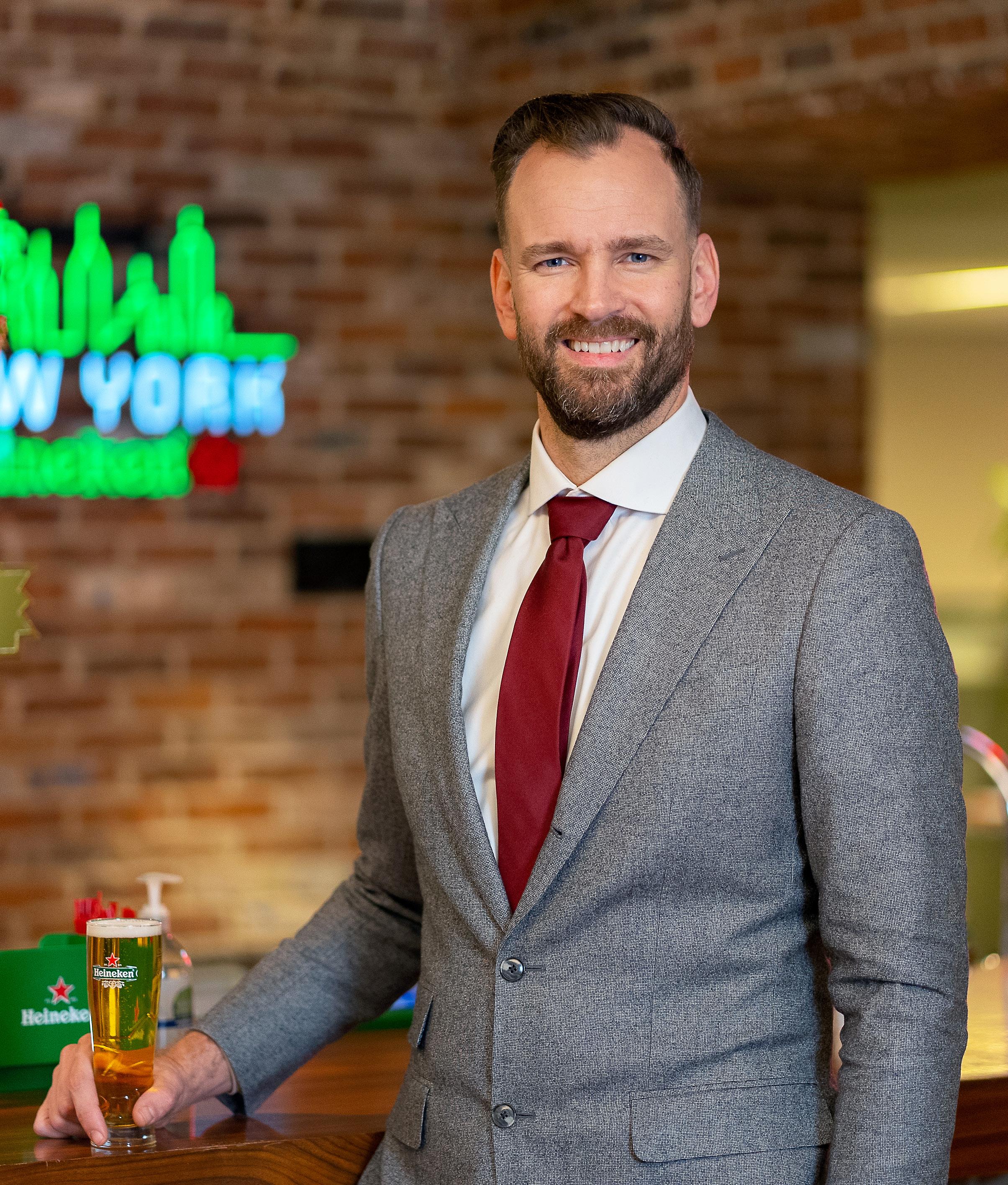 Seth Skiles
Deputy General Counsel HEINEKEN USA
Seth Skiles
Deputy General Counsel HEINEKEN USA
Lead 98
Jose Duran
WHILE SETH SKILES HAS BUILT OUT AN EXTENSIVE litigation record both in firms (Quinn Emanuel, Kaye Scholer) and in-house (Blue Apron, Compass), he has a distinctly personal connection to his latest role as deputy general counsel at HEINEKEN USA that predates law school.
“Heineken was the first six-pack I ever purchased after turning twenty-one,” Skiles remembers. “As a younger person on a budget, it was the beer that you aspired to, the one you’d want to get on your birthday. Just from a brand perspective, it’s been an amazing opportunity to come here and support the team.”

Skills Years in the Making
Skiles’s skill set runs deep, as evidenced not only in his résumé but also in the evolution he’s undergone as both a leader and business partner. It’s an evolution the DGC says takes years to adapt to after coming from multiple firm stints, but it’s entirely necessary for anyone who truly wants to add value to their organization.
“There is this whole different set of skills that’s required: learning how to work with diverse interest groups and stakeholders, achieving success through communication and planning, updating your preconceptions as you learn and meet with people,” Skiles says. “These things take time.”
Skiles’s command of the softer skills of leadership in no way belies his grounding in the scientific tradition of fact-based, rational decision-making. His engineering background has allowed him to engage in diverse and complex conversations that other attorneys may have shied away from, like software development, technical inquiries, and manufacturing issues.
“Throughout my career, I’ve found I was able to talk through things on a deeper level and get into terminology that these experts in their areas were more familiar with,” Skiles explains. “It helped put people at ease and maybe make them think of me as more of a partner than a lawyer coming down the hallway to make your life more difficult.”
But that’s only one avenue of conversation. Skiles’s continued success can be attributed to his ability to take those sometimes deeply analytical
Modern Counsel 99
and technically complex conversations and translate them to those who can benefit from the information, but don’t necessarily need to get down in the dirt to do so.
“There is always this process of filtering from the deepest, most granular data to abstracting to what is important for the audience, which could be your CFO, your CEO, a regulator, or a judge,” Skiles explains. “You have to figure out what is the important message for them and deliver it in a clear, concise, and rational manner. That’s what lawyers do.”
The Nuts and Bolts of Legal
The DGC’s analytical mind has also been beneficial to organizing HEINEKEN USA’s legal department and using technology to help the lawyers do the work that matters most. Skiles says it’s a continuous process that includes investigating new software, data storage, and invoice review.
“These are nuts-and-bolts issues, but you want to ensure that you have the machinery of your department running as smoothly as possible and that lawyers are doing more lawyering and less work that doesn’t add the same type of value,” Skiles explains.
Skiles says he continues to investigate new technologies that will contribute to data-driven decisionmaking. While judgment based on past experience can be useful in many cases to provide context, it can also create assumptions that are simply not backed by data or reason.
That’s not to take anything away from experience, but merely to underline the ever-changing legal landscape and the increasingly
complex nature of deriving truth in today’s modern world.
The DGC emphasizes what he considers an even more important component of getting a legal team on the same page: the people.
Whether it’s professional development of skills, team building, or mentoring, Skiles says that you can throw together a bunch of lawyers in a room and they’ll eventually develop a working process, but that doesn’t make it a high-performing legal department.
“You have to answer the question of whether you’re just an ad hoc group of lawyers who have just been hired to do things or whether you're a team with a unified vision that has clear responsibilities and depends on each other for success,” Skiles asks. “Just because a group of people happen to be sitting in the same room doesn’t make them a team.”
The focus on team building exemplifies Skiles’s passion for mentorship and developing the talent of others. The DGC says he loves working with interns and junior attorneys, spending time with young talent and helping them figure out just what direction they want their career to go.
“I love mentoring and motivating my team members,” Skiles says. “I want them to love their job and to become even better lawyers. I just love to see people around me succeed. It’s what I find most rewarding right now.”
Greenberg Traurig:
“Seth Skiles has a gift for strategic vision guided by pragmatic business judgment, which makes for an effective working relationship with outside litigation counsel.”
–David Coulson, Shareholder

CONGRATULATIONS TO OUR CLIENT AND FRIEND
Greenberg Traurig applauds the leadership and accomplishments of Seth Skiles, Deputy General Counsel of Heineken USA. We are proud of our partnership with Heineken USA and we look forward to continuing our work with Seth and the company. GTLAW.COM 2300 ATTORNEYS | 40 LOCATIONS° Greenberg
rights reserved. Attorney advertising. °These numbers are subject to fluctuation. 35907 David A. Coulson 333 S.E. 2nd Avenue | Suite 4400 Miami FL 33131 | 305.579.0500 coulsond@gtlaw.com GT_Law Greenberg Traurig, LLP GT_Law GreenbergTraurigLLP
Seth Skiles
Traurig is a service mark and trade name of Greenberg Traurig, LLP and Greenberg Traurig, P.A. ©2021 Greenberg Traurig, LLP. Attorneys at Law. All
100
SurfingChangeon
Richard Sutton loves the variety of his work at Genpact and the challenge of keeping up with ever-evolving employment law
By Billy Yost
RICHARD SUTTON HAS THE SAME question for everyone who contacts him at Genpact, where he serves as vice president and legal counsel.
“I always ask, ‘Can you give me the layman’s explanation of what you do?’” Sutton says. “We do such a wide variety of work and we’re always picking up new services, so I always have to ask. It’s a way that helps me provide better service.”
The global professional services firm has more than a hundred thousand employees worldwide, so it’s a question Sutton has had to ask often since joining Genpact in 2007. But it’s also what has kept him at the organization for fourteen-plus years. The work is never the same.
“One of the things I enjoy most is the variety of people that I get to work with on a daily basis,” Sutton explains. “In terms of both geography as well as the types of work they’re doing, I may be speaking to someone
performing accounting work one minute, a PhD in computer science the next, and a high-level engineer after that, and they could be located anywhere in the world.”
Sutton says that since coming to Genpact, he’s not only seen the organization change dramatically in size, but he’s also seen the focus on the work of his organization shift from providing people-oriented solutions to fully embrace areas like digital solutions and artificial intelligence.
The variety of work has also offered Sutton the chance to examine the laws of numerous countries and jurisdictions. His working knowledge of British and Japanese law has become strong, he says, and his aptitude for South African law is coming along. But employment law is never static—and that’s the way Sutton likes it.
“A lot of basic US employment law protections are fairly bare-bones documents,” he says. “Every time a judge interprets a law in a
Modern Counsel 101
Richard Sutton VP and Legal Counsel Genpact

different way, the laws change. In a sense, it’s like surfing. You’re trying to stay up on the board, but the water below you is changing all the time.”
Case in point: There’s perhaps no better example of employment law shifting as “fast and furiously” (as Sutton describes it) than the ever-changing COVID-19 protocols. With two different presidential administrations, federal mandates, individual states challenging those mandates, and new information rolling out all the time, the only constant is change.
“Every day, we’re getting a barrage of new laws in multiple cities and states,” Sutton says. “That’s just in the US. There’s this constant push and pull of figuring out how to implement one
law that was passed with another law that was passed that seems in almost direct contradiction to it.”
Sutton says he’s proud not only of the way his organization has handled the crisis, but its overall commitment to what he calls “being a humane place to be.”
According to Sutton, Genpact creates an environment that can be felt and lived every day through both large-scale programs and smaller, but equally as valuable, efforts. Regular town hall meetings allow employees to interact with leadership and make their voices heard.
“We also have created an innovative way for our people to raise alerts within the company, so prospective issues aren’t ever in danger of being isolated,” Sutton says.
Genpact is committed to making sure its people feel connected and their differences are celebrated. Affinity and allyship groups are available for the LGBTQ+ community and minority employees, and multiple formal mentorship groups are available, including a sponsorship program for minority employees and a twelve-month leadership program for female assistant vice presidents to help them grow into new roles.
Genpact also employs a policy to protect transgender employees and supports LGBTQ+ rights in the workplace.
Then there’s Genome: free classes put together from universities, inside talent, and other resources that are provided free of charge and allow employees to learn new skills that can be valuable to their development.
“I love our storytelling class, which I think is a great idea for all kinds of different roles, from lawyers who need to be persuasive to anyone who’s
Catherine Kiernan
Lead 102
ever pitched at a meeting,” Sutton says. “There’s a huge catalog that provides people an informal way of developing new capabilities.”
The cumulative result of these efforts has led to Genpact employing a diverse array of talent, including a board of directors with a gender parity of nearly 50 percent. “We’re in the twenty-first century, so the numbers should always be better than they are, but I know that we’re far ahead of where a lot of organizations are,” Sutton says. “It’s something we’re very proud of.”
The supportive culture at Genpact is indicative of an evolving approach to its work—one that values challenging every assumption.
“If we have an internal process that we think is antiquated or not going anywhere, we’re going to change it,” Sutton explains. “We don’t stand on tradition unless it provides results worth standing on. It creates a thriving environment that welcomes change, and I think you can see that in everything we do. And we do a lot.”
McGuireWoods LLP:

“Richard is a knowledgeable and pragmatic problemsolver. McGuireWoods has the pleasure of working with Richard regularly, and his practicality and insight are an asset to Genpact and set him apart from his peers."
–Michael J. DiMattia, Partner, Labor & Employment
We value the relationship, shared sense of teamwork and confidence that Richard has placed in McGuireWoods to deliver on his goals.
We wish Richard and the Genpact team continued success.
103 1,100 lawyers | 21 offices www.mcguirewoods.com
“It’s like surfing. You’re trying to stay up on the board, but the water below you is changing all the time.”
McGuireWoods congratulates Richard Sutton on his leadership and achievements as vice president and legal counsel at Genpact. Michael J. DiMattia ,
+1 212 548 7009 mdimattia@mcguirewoods.com Adam T. Simons , Partner +1 212 548 2121 asimons@mcguirewoods.com
Partner
Status Update
After building the IP team at Meta, Christen Dubois takes a new role in antitrust litigation
By Billy Yost
FOR AS LONG AS SHE CAN REMEMBER, Christen Dubois has had an innate desire to fight for what is right, to get to the bottom of any issue, and to achieve justice. It’s part of what made her deviate from her intended path to medicine and choose the law instead.
“Early on, I saw enough to suggest that I might spend most of my medical career fighting insurance companies, and it just didn’t seem right,” says Dubois, who’s now director and associate general counsel of litigation at Meta.
Her interest in both neuroscience and the intersection of science and technology, however, would ultimately help guide her journey, leading her to the most well-known social media platform in the world. And Dubois’s
passion for fighting the good fight (no matter how long it takes) has proven a perfect match for a company that continues to expand into new and cutting-edge communication platforms and technologies.
To Build and Move On
After law school, Dubois was hired at the law firm Cooley Godward Kronish, and during her time there she was seconded to Facebook to dive into trademark work. Had it been patent litigation, Dubois says, she never would have left—but there were no openings available at the time. She returned to her firm, then in 2011 accepted an IP counsel role at Facebook that has led to five subsequent promotions over the last
tktktktktktktktkt
104 Lead
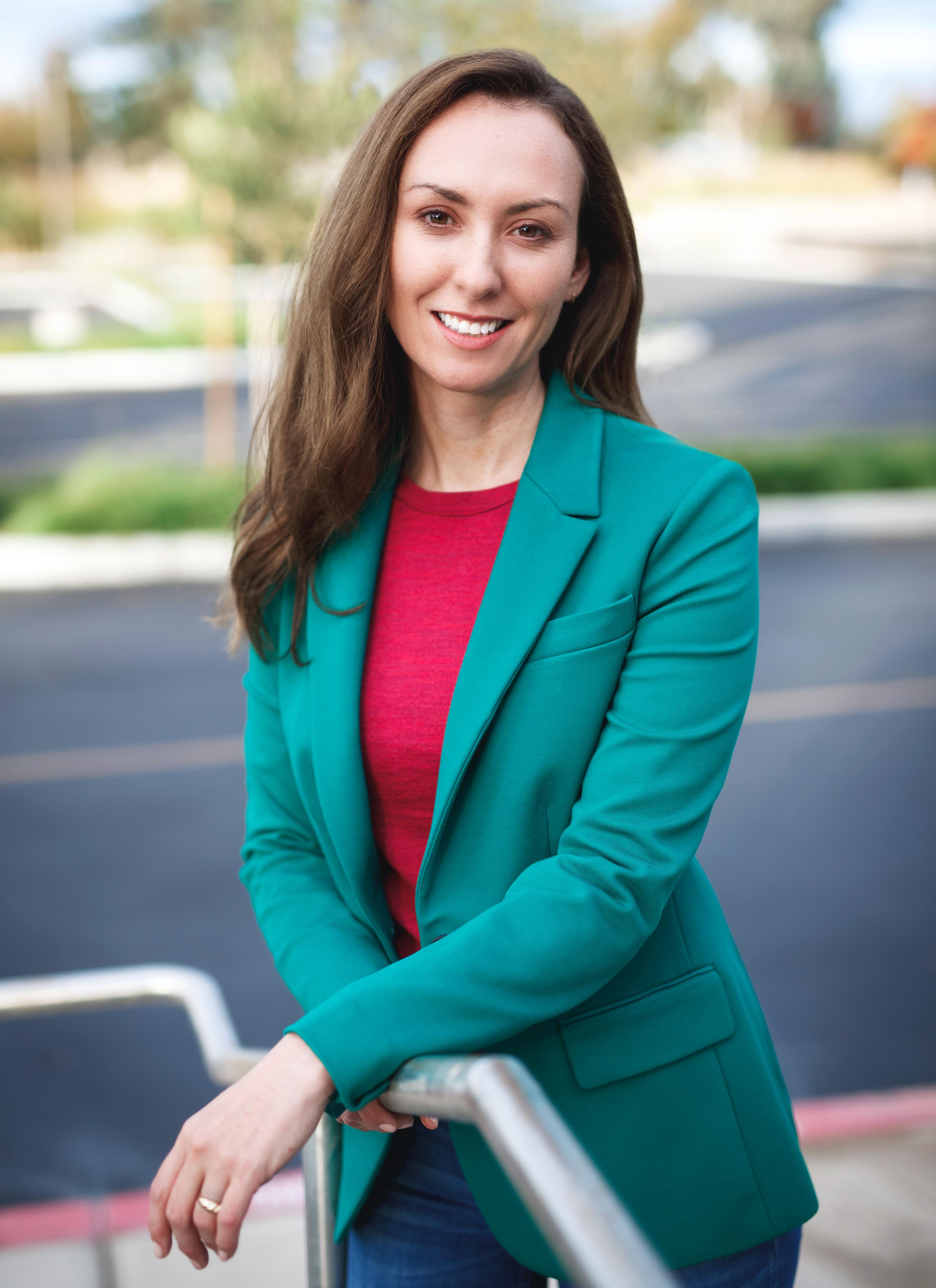
Jamie Rain
Christen Dubois Director and Associate General Counsel, Litigation Meta
decade. She has helped grow a company that was largely focused on its sole social media platform when she joined the team, but now owns other platforms like Instagram and WhatsApp, and virtual reality company Oculus VR.
“As the company grows, things obviously become more complex,” Dubois explains. “There was a time that I could ask a question aloud and get an answer from virtually every member of the Facebook legal team. I may not know everyone personally on the team anymore, but there is a tremendous ‘one team’ mentality that has remained.”
In 2016, she won a memorable case against what some might call a “patent troll” in the Eastern District of Virginia. In Rembrandt Social Media v. Facebook , Facebook successfully defended itself from claims that its technology infringed on a patent filed by a Dutch computer programmer to create a web-based personal diary.
“It was really the cleanest trial win that you can get,” Dubois remembers. “We got a full defense verdict of no infringement and a finding that the patent was invalid. It was an amazingly fun case to be a part of.”
But along with the clean victories, there are plenty of hard slogs. When
As the legal team grew, so did Dubois’s leadership responsibilities; most recently she’s headed up the company’s government antitrust litigation. It was an admittedly tough transition for Dubois, who built up her IP team over a number of years, but it’s a handoff that has been seamless because of her investment in her people.
“It was bittersweet, but I’m proud to say that one of my previous reports now leads the team,” she says. “If you’re doing this right, you run a team with a successor that’s available, capable, and well-positioned to move ahead without you. It was tough to leave, but I left the team in very capable hands.”
Clean Sweeps and Hard Slogs Dubois has an impressive résumé of both clean-sweep wins and victories that were hard-fought over multiple years.
Tele-Publishing Inc. v. Facebook was finally settled in Facebook’s favor in 2017, eight years had passed since its filing. In fact, Dubois was still an associate at Cooley when the firm started working on the case.
“It was one of those cases where you’re fighting in the patent office, then you’re back to district court, then you’re waiting for a decision, and then the district court gives you three months to do all discovery,” she says. “It was ultimately a huge win, but it’s not the kind of case where you throw a party.”
Dubois says there were also many cases that were wins precisely because they didn’t make it to trial. While the excitement of battling in the courtroom may be memorable, most cases ultimately shouldn’t make it there.
“If you’re winning things outright before it goes to trial, that’s an efficiently
“If you’re doing this right, you run a team with a successor that’s available, capable, and well-positioned to move ahead without you.”
Lead 106
run system,” Dubois explains. “If the merits of the case are such that it should be thrown out before you go to trial, that’s the system working really well.”
Leading with Life in Mind
Dubois remains committed to leadership and says that she’s fine with the fact that helping people with their career development could lead them to other opportunities.
“Selfishly, I would love to keep my team, but I don’t think that anybody really benefits from that in the long run,” she explains. “I genuinely care about my team, and I want the best for them. I think people know when their managers truly believe that, and it helps me show up for them in the best ways.”
Heading government antitrust litigation means Dubois is now working collaboratively across multiple departments, including Facebook’s competition team. “These people have such deep and impressive backgrounds in antitrust law, and they are essential to our efforts in litigation,” she says.
“Christen is a very smart, strategic lawyer who understands cutting-edge technologies,” notes Dale Cendali, intellectual property partner at Kirkland & Ellis. “She
Expertise Spotlight
Kirkland & Ellis is an international law firm with approximately 2,900 attorneys in offices in eighteen cities across the world. Collaborations among Kirkland attorneys in various disciplines produce innovative legal solutions for our clients. We work together across offices and practice areas as integrated, multidisciplinary teams to provide the capabilities necessary to generate great results for our clients.
Our intellectual property practice protects the ideas, technology, products, and brands of our global clients in wide-ranging industries who engage us on complex IP litigation, transactions, and counseling matters. We help clients ranging from market leaders to dynamic start-ups protect their market position and maximize their intellectual property. With decades of experience, our IP litigation attorneys have achieved extraordinary results in patent, copyright, trademark, trade secret misappropriation, and advertising matters, and they excel in large-scale, bet-the-company cases.
Our practice is widely recognized as one of the best in the industry. Chambers & Partners has ranked us as a top-tier firm for intellectual property for fifteen consecutive years, and we were honored to be named Intellectual Property Litigation Law Firm of the Year by U.S. News & World Report in 2020.
We are grateful to our clients for their trust and partnership on their most challenging matters.
Modern Counsel 107
sees the big picture and is able to formulate a path to achieve the business’s goal. She is also an upbeat and friendly person to work with who keeps a steady hand, even on big-stakes matters.”
Dubois also keeps in mind that her team is made up of people with lives beyond work. “I think that’s really important to continue doing my best work,” she explains. “Life is big, and work is one part of it. People are dealing with all kinds of challenges in their own lives at different times, and I make sure that there’s room for that and that they don’t feel like they can’t ask for help.”
Dubois herself is always up for a challenge, as her extracurricular activities show. A professed lover of power tools, she’s racked up enough home renovation victories to land her a television show on HGTV. She’s also an avid runner who managed to work the Athens Marathon in 2019 after attending a court hearing in Germany. Whether in the courtroom, on the rail, or out back with the jackhammer her father bought her for her birthday, Dubois shows up with passion, ready to get to work.
Kellogg Hansen:
“It’s a privilege and a pleasure working with Christen— she’s smart, focused, and unflappable.”
–Mark Hansen, Partner
108
“I genuinely care about my team, and I want the best for them. I think people know when their managers truly believe that, and it helps me show up for them in the best ways.”

Kirkland & Ellis is proud to join in recognizing our friend and client Christen Dubois of Meta Kirkland & Ellis LLP | 601 Lexington Avenue, New York, NY 10022 | +1 212 446 4800 www.kirkland.com | Attorney Advertising Christen is an unflappable leader with a command for litigation strategy, so naturally she has a lot of followers and — of course — a lot of likes.
An Unexpected Journey
With thirty-one years of legal experience at the Department of Justice and large law firms, Sung-Hee Suh leverages her hybrid skills to execute a complex regulatory strategy at PIMCO
 By Zach Baliva
By Zach Baliva
SUNG-HEE SUH CAN’T REMEMBER A TIME WHEN SHE didn’t care about social justice. After all, she was just eight years old when her parents started taking her to political demonstrations. Her family came to the United States from South Korea after Suh’s father, a journalist, was blacklisted and persecuted by their native country’s dictatorial regime.
Watching her parents lobby and advocate had a lasting impact, and Suh got directly involved at an early age.
Suh’s parents taught her that each person has the responsibility to engage the world. She originally wanted to follow in her father’s footsteps and pursue a career in journalism, but a summer internship at the Asian American Legal Defense and Education Fund (AALDEF) after graduating from college put her on a new path.
PIMCO Lead 110
Sung-Hee Suh Managing Director and General Counsel for Global Regulatory & Litigation PIMCO
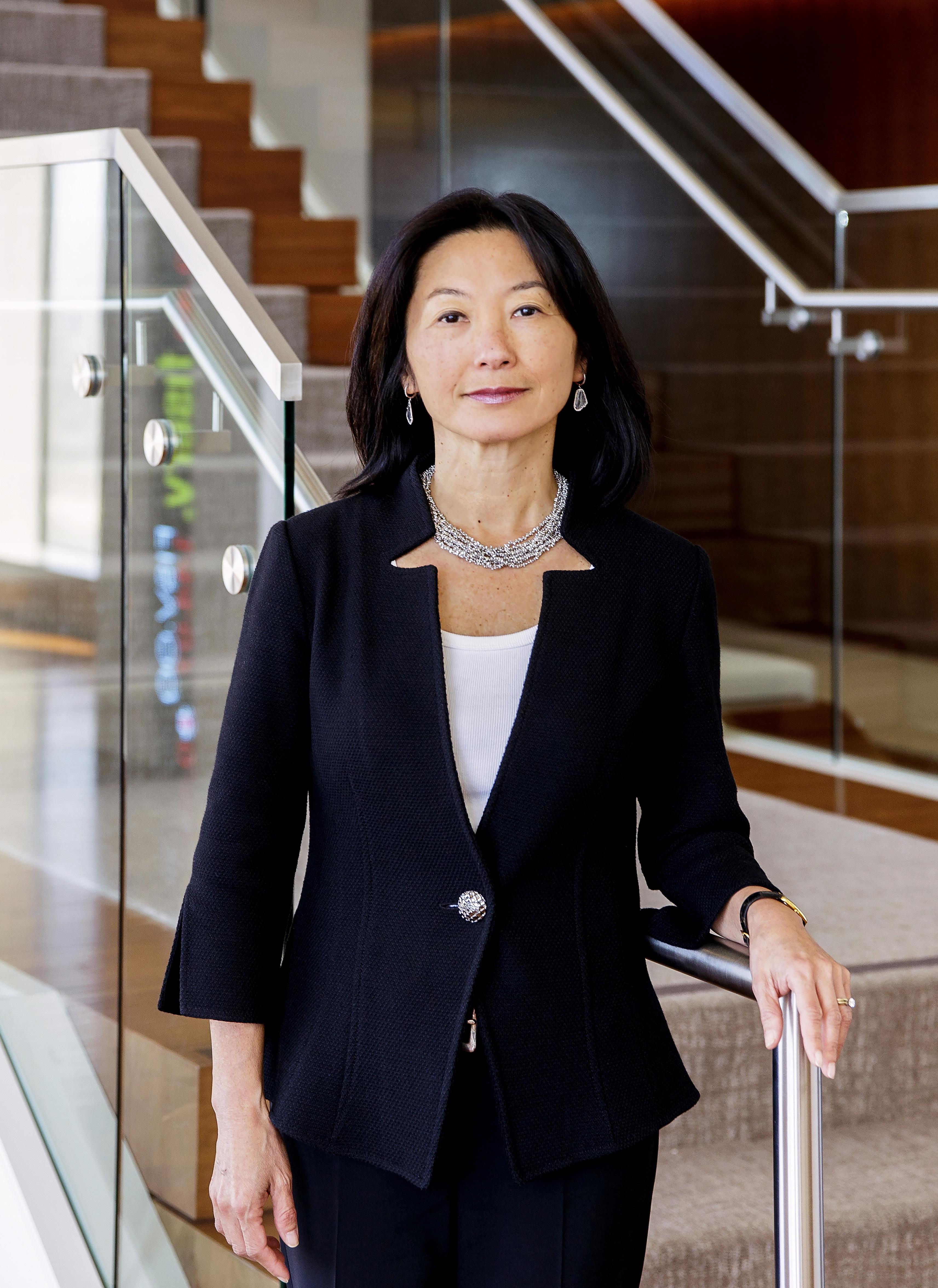
AALDEF was a shoe-string operation with just four employees who shared a tiny office where volunteers met to draft educational brochures, speak with community organizers, and plan free legal advice clinics for recent immigrants. “I learned there can be power in small things,” Suh explains. “We were doing so much with so little.”
The work may not have been glamorous, but it was meaningful, and Suh was inspired by the small-but-mighty team that accomplished so much against all odds. AALDEF won cases for tenants and laborers, helped obtain reparations for interned Japanese Americans, and fought to address the rise in
anti-Asian American violence during the 1980s, including the murder of Vincent Chin in 1982.
Most importantly, AALDEF’s lawyers and volunteers were speaking to immigrants in their native language and educating them about the legal protections that already existed. When the internship ended, Suh applied to Harvard Law School.
During her time in Cambridge, Massachusetts, Suh worked to shatter the stereotypes working against her. She was one of two Asian American women in a first-year section of 140 students. Her professors often called her by the other Asian American female student’s
name even though the two looked nothing alike.
The experience made Suh more aware of issues regarding diversity and inclusion, and she helped lead a coalition of students that lobbied Harvard’s administration to tenure more professors of color. The same year, Derrick Bell, Harvard’s first Black tenured professor, became her mentor.
The stereotypes continued when Suh graduated and started her career. Although she wanted to go into litigation, law firm partners assumed she was best suited for transactional work with Asian-based clients.
After an eye-opening federal clerkship with Judge Robert L. Carter, Suh accepted a position with Davis Polk where she honed her skills as a litigator for two years before landing a job as an assistant US attorney (AUSA) in Brooklyn. Zachary Carter, who was then the US Attorney, was starting a civil rights unit where Suh thought she would have the opportunity to combine her passion for equal protections with her desire to be a courtroom litigator.
But, by happenstance, her supervisor in the entry-level “general crimes” unit where Suh started as an AUSA was a veteran mob prosecutor who introduced her to the world of Italian organized crime networks. Suh ended up spending nearly five years prosecuting over sixty members and associates of La Cosa Nostra, including the acting boss of the Gambino Family.
Suh joined Schulte Roth & Zabel in 1999 and defended individuals and institutions in white-collar cases. Paral-
Lead 112
“The asset management industry, like the rest of the financial industry, needs to build to more diverse representation because our clients demand it, and because it’s the right thing to do.”
lel civil litigations related to many matters gave her a broad range of litigation experience, and in 2014, Suh was appointed to the US Department of Justice’s criminal division as a deputy assistant attorney general.
In that role, she crafted national whitecollar enforcement policies and supervised nearly two hundred lawyers working on prominent cross-border cases including Volkswagen “Emissionsgate” and Operação Lava Jato (Operation Car Wash), which probed corruption at top levels of the Brazilian government.
When the appointment ended, Suh led White & Case’s New York white-collar practice until PIMCO recruited her to formulate its complex global regulatory strategy. For the veteran lawyer with experience in regulatory enforcement, defense law, and multinational clients, it was the perfect fit.
PIMCO, an Allianz company, is an investment management firm with total assets under management of more than $2 trillion. Suh works to ensure the organization has an effective framework that will satisfy the many regulators that scrutinize its activities in the Americas, Europe, and Asia Pacific.
Although PIMCO is a large organization with massive reach, it reminds Suh of her early days at the Asian American Legal Defense and Education Fund. “Our legal and compliance team is dedicated and tireless. We emphasize collaboration, teamwork, and diversity,” she says.
Two hundred legal and compliance professionals work to ensure that PIMCO meets regulatory expectations around the globe on everything including market integrity; retirement asset protections; environmental, social, and governance (ESG); cybersecurity; antimoney laundering laws; and pandemic-related remote work policies.
Expertise Spotlight
Debevoise & Plimpton is home to one of the premier securities practices in the country. With a combined sixty-plus years of experience at the highest levels of the U.S. Securities and Exchange Commission, we have an unparalleled, comprehensive understanding of the regulatory, compliance, and enforcement issues that impact investment advisers, broker-dealers, and other regulated entities.
Debevoise is a leading law firm with market-leading practices, a global perspective and strong New York roots. Our clients look to us to bring a distinctively high degree of quality, intensity, and creativity to resolve legal challenges effectively and cost efficiently. Deep partner commitment, industry experience, and a strategic approach enable us to bring clear commercial judgment to every matter. We draw on the strength of our culture and structure to deliver the best of our firm to every client through true collaboration.
Modern Counsel 113
Team Orrick
“It’s terrific working with Sung-Hee,” says Robert Kaplan, partner at Debevoise & Plimpton. “She’s smart and strategic, and she has a remarkable ability to quickly distill complicated regulatory issues and get to the heart of a matter.”
As a minority leader and as a female, Suh says she is constantly “leaning in” to diversity in recruiting, retention, and talent development. She’s also working to promote inclusion in the company and its industry.
“The asset management industry, like the rest of the financial industry, needs to build to more diverse representation because our clients demand it, and because it’s the right thing to do,” she explains.

Suh has enjoyed each stop in her distinguished career and advises law students to take risks, keep an open mind, and consider all options. She didn’t set out to go to law school. She never meant to be a mob prosecutor.
For her second Justice Department stint, she commuted from New York to Washington, DC, with a young child at home, and she later moved her family three thousand miles to take the job at PIMCO.
“The risks have resulted in a rewarding career,” she says. “Three decades after law school, I still wake up each and every day grateful and excited about the work I get to do.”
114
Sung-Hee, we are grateful for your strong leadership. Congratulations on your new role at PIMCO.
ropesgray.com ROPES & GRAY
is proud to partner with SUNG-HEE SUH
Attorney Advertising © 2021 Ropes & Gray LLP. All rights reserved.
Managing Director and General Counsel, Global Regulatory & Litigation and serve the legal and business needs of PIMCO
Debevoise congratulates Sung-Hee Suh on her well-deserved recognition in Modern Counsel and is proud to partner with PIMCO’s legal team.
debevoise.com


Teachable Moments
Chris Ferguson continues to focus on growth and development after more than a decade of IP excellence at Hewlett Packard Enterprise
By Billy Yost
CHRIS FERGUSON’S EXTENSIVE IP EXPErience at Hewlett Packard Enterprise
(HPE) the past ten years runs from initially being hired as a patent application drafting specialist to his latest role as senior counsel of IP transactions. Through multiple promotions along with five formative years working for esteemed firms Morrison & Foerster and Fitzpatrick, Cella, Harper & Scinto, Ferguson has established trusting relationships with inventors as much as he has with executives, salespeople, and others across HPE’s business lines.
As he’s progressed in his career, the lawyer has ascended to leadership roles that have provided their own challenges, demanding a perspective shift away from his individual contributions to acting as a mentor and manager—all the while keeping HPE’s patent department running like a well-oiled machine.
The words “resiliency” and “flexibility” are two the legal leader brings up a lot in
his interview, and the IP attorney hopes others may find some wisdom in this deep dive into his career journey.
When to Not Know
Ferguson says learning to accept one’s limitations is an essential requirement of an in-house lawyer. “As in-house counsel, we’re required to be more than a master of legal questions. You’re looked to as a trusted advisor to the business,” the lawyer explains. “People are often coming to you with a quasilegal question or one that may have no legal context whatsoever. You need to be flexible in your thinking and willing to provide advice and take things on that may be outside your wheelhouse.”
But, the lawyer stresses, this comes with an additional responsibility. “You have to be resilient and understand that you are often not going to know the answers to these questions,” Ferguson says. “In school, there was generally an answer and
Lead 116
an objective truth you were working toward. But in reality, there are multiple sides of an issue, and it’s so important to understand that some questions don’t always have a definitive answer.”
Ferguson says lawyers need to learn one very important phrase that may hurt to utter but will save them a great deal of pain in the long run: “I don’t know, but I will try to find out.”
“Don’t try to provide an answer on the spot if it’s not an answer you're confident in providing,” the lawyer explains. “If it’s a legal question, do some research and get back to them. If it’s a question where the answer isn’t
objectively clear, recognize and illustrate the multiple paths forward.”
Ferguson says that as businessminded attorneys, in-house counsel need to learn to recognize and live with the inherent risk that those multiple avenues present. The most conservative route may not always be the wise path, and it’s an in-house counsel’s job to walk others through that risk assessment and chart multiple courses for where decisions might lead.
Learning in Leadership
Especially in his latest move, Ferguson has had to learn to be comfortable in
learning something new. “In switching to this IP transactions role, doing these big, complex transactions is totally different from what I’ve spent 90 percent of my career doing,” the lawyer says. “It’s required a lot of humility and flexibility.”
The same qualities were required for Ferguson’s last role, in which he managed a team for the first time. The skill set needed for people management was new territory for the lawyer, who until then had been measured on his own contributions throughout his career.
“You have to have the core skills in the subject matter for sure, but being a
Chris Ferguson Senior Counsel, IP Transactions Hewlett Packard Enterprise
Lessons on the Road
Chris Ferguson continues to accumulate new skills, both at Hewlett Packard Enterprise and in his own personal life. Around 2015, the lawyer decided to really commit to learning the guitar.

“I took my acoustic guitar and put it in my car,” Ferguson says. “Before I walked into the office each morning, I would grab it and practice for at least fifteen minutes. It was so rewarding to see it pay off that first year, and it’s continued to be something that fills me up.”
It’s a reminder that with a little dedication and a few minutes to spare, passion pays off.
Jenny Ferguson
Modern Counsel 117
Our main practice areas include private equity, mergers and acquisitions, international and domestic capital markets, investment funds, asset management, antitrust/ competition, banking and finance, aviation finance, foreign direct investment, compliance, private client/wealth management, intellectual property and dispute resolution.
We have more than 600 professionals located in our four offices in Beijing, Shanghai, Shenzhen and Hong Kong. All our lawyers are graduates of top universities and have extensive experience in complex cross-border transactions as counsel to both Chinese and foreign clients.

manager is so different,” says Ferguson. “It’s really all about the people. It’s about putting others first and ahead of yourself in many ways. You’re helping them achieve their aspirations and achieve their goals. You could be the best attorney but a horrible manager who derails the careers of others. You have to commit to people personally and as a leader.”
And while large transactions may be taking up more of Ferguson’s day-to-day now than leading a team, the perspective he’s gained from his journey continues to influence his own practice, both inside the office and out.
“Whether it’s a project or problem, it’s so important not to stay at that limited, myopic level of getting in too deep,” the lawyer explains. “Remind yourself to step back and see the whole picture. And that includes paying attention to your personal life and not working 24/7.”
Ferguson says stepping back often results in being able to approach a problem from an entirely different perspective. Whether it’s spending time with his wife and four children or learning a new song on the guitar, the attorney says he’s better at his job when his whole life, not just his nine-to-five, has balance.
KONG Han Kun Law Offices:

“We enjoy working with Chris very much. He always incents us to think more with his deep understanding of the company strategy and insights of legal frameworks.”
–Lili Wu, Partner
Han Kun is a leading full-service law firm in China. Over the years, Han Kun has been widely recognized as a leader in complex cross-border and domestic transactions.
| SHANGHAI SHENZHEN |
www.hankunlaw.com BEIJING
HONG
118
“In reality, there are multiple sides of an issue, and it’s so important to understand that some questions don’t always have a definitive answer.”
Pivot
Showcasing prominent in-house attorneys who capably adapt to changes in their companies, industries, and personal and professional lives to carve out new paths through imagination and reinvention
tktktktktktktktkt
No More Games
Tim Parilla brings a passion for building business-focused legal teams to LinkSquares
 By Billy Yost
By Billy Yost
“YOU NEED TO MAKE YOUR DECISION right out of the gate,” Tim Parilla says. “Are you a businessperson with a legal background or are you a lawyer who’s trying to play business games?”
Parilla insists that in most ways, he’s a pushover, but his stance on how to lead an in-house legal function is most definitely not one of them. The chief legal officer (also licensed pilot and adult rec league hockey player) at AI-powered contract management and analysis company LinkSquares is here to politely challenge you on what it means to act as an in-house lawyer.
Learn by Night
Parilla became a lawyer in-house at a gaming company based in Cambridge, Massachusetts. It wasn’t a rudimentary role—he was the first and only in-house attorney at the two-hundred-person software company. The company was in the very early processes of selling itself, allowing Parilla to interact with outside counsel, take on M&A work, and
learn on the fly about how to partner with the business.
“I was acting as a mouthpiece between the attorneys and the business, and there was a lot I had to figure out on my own,” the CLO says. “I had to lean on some fundamental skills from law school, which is kind of crazy, because you don’t learn much about actually practicing law in law school.”
Parilla had learned that if he didn’t know something, he had no choice but to figure it out on his own. The young lawyer spent many nights off the clock searching Westlaw for guidance on legal issues and tracking down secondary articles and thought leadership pieces to help him understand how to become a strong in-house attorney.
This education occurred between repeatedly started and stalled acquisitions. And for good measure, he ended up in high-profile litigation with a major Las Vegas casino over a contract that had been entered into before he arrived.
Pivot 120
 Tim Parilla Chief Legal Officer LinkSquares
Tim Parilla Chief Legal Officer LinkSquares
Modern Counsel 121
David Guerrera/Linksquares
Court and Controversy
It wasn’t the last time Parilla would work on litigation that made headlines. The lawyer would join DraftKings in 2014 as the first in-house lawyer for the tiny company—at least at the time he joined.
“It was a time of massive growth and massive controversy,” Parilla says matter-of-factly. “We went from forty or fifty people when I joined to three or four hundred by 2016. It was all about scaling the legal department and really understanding what it means to build a legal function in a high-growth company that can actually serve and anticipate the needs of the business.”
For the uninitiated, DraftKings and competitor FanDuel found themselves
as the temporary media representation of all things illicit when a narrative that a DraftKings employee used “insider information” to win a competitor’s fantasy sports competition captured the popular imagination.
“To anyone who remotely understands this, it makes absolutely no sense,” Parilla says, laughing. “But nobody wants to read a story headlined ‘DraftKings does the right thing.’”
To compound the pressure, the very model that DraftKings and other companies used suddenly came under scrutiny and labeled as “illegal gambling.” This is where Parilla truly came into his own.
“So much of this came down to perception,” the CLO says. “Perception
taught me a ton about risk appetite, about how to approach the business, and the fact that so many chief legals will call themselves commercial but it’s rare that they actually are. The experience at DraftKings taught me, really, what it means to be ‘commercial’ as a lawyer.”
Parilla says a truly commercial lawyer is committed to working through a crisis or a challenge and embraces the negative consequences of taking on risk. Unless a business is fundamentally flawed, you can manage and overcome a crisis. It’s at this point that the lawyer seems to truly come alive in the conversation.
“When you’re looking at a growthstage company, there are risks that you
 David Guerrera/Linksquares
David Guerrera/Linksquares
Pivot 122
Tim Parilla Chief Legal Officer LinkSquares
have to take, and you have got to own those risks,” Parilla implores. “At one point, we had reached the worst-case scenario of various law enforcement agencies telling us that what we were doing was somehow illegal. We chose to stand our ground and say no, because we had done our due diligence. We knew the law surrounding our business and knew where we stood.”
The Passion to Build a Legal Function
The lawyer stayed in the role for seven years—a substantial period in a hypergrowth company. It was the challenges that kept him coming back for more. With the company going public in 2020, Parilla knew it was time for the next chapter.
“It would have been a safe play to stay at DraftKings, but I wanted another shot at a start-up; I wanted to cement my career in the start-up and growth-stage world,” Parilla says. “I loved my time at DraftKings, deeply value the experience and the great friends I made there, and more than anything, it crystallized in my mind my passion for optimizing the way that a legal department should work in a tech company.”
At LinkSquares, Parilla says the lack of high-profile drama has afforded him the time to lean into that passion full-on. The company builds software that helps lawyers to interact with the business in a more meaningful and efficient way. Parilla’s expertise at building a business-focused legal function has created a full-circle payoff
of high performers matched with a product that helps enhance their process.
“I received the due diligence request list for our Series B financing on a Wednesday night and, using our platform, it was substantially complete by end of day Friday,” Parilla says. “Every contract and every agreement is there, and we went from signing the term sheet to money in the bank in less than six weeks. It’s just unheard-of.”
This brings Parilla back around to what it means to own the legal function, in the best of times or the worst of times. “If you’re at this level of an organization and there’s a failure, it’s your fault, period,” the CLO says. “If you don’t have that mindset, then you’ve already failed. In real life, that looks like your team buying into the idea of success as a team; they’ll see that you have to foster it and that success is absolutely dependent on the success of everyone else.”
This methodology is predicated on Parilla’s stark assessment that the legal function exists to enable the business. “The only reason you exist is because people are building, marketing, and selling a product,” he states.
It may be tough for some in-house professionals to hear, but Parilla says the decision to be a businessperson first is what separates truly great in-house lawyers from the competent ones. Recognizing the risk is table stakes and managing it lets you keep your job, but owning it makes you stand out.
Modern Counsel 123
“I loved my time at DraftKings . . . it crystallized in my mind my passion for optimizing the way that a legal department should work in a tech company.”
Growth Mode
EverCommerce hired Lisa Storey anticipating a rapid expansion. She’s helped the tech start-up acquire fifty-plus companies and go public in less than four years.
 by Zach Baliva
Jess Kornacki
by Zach Baliva
Jess Kornacki
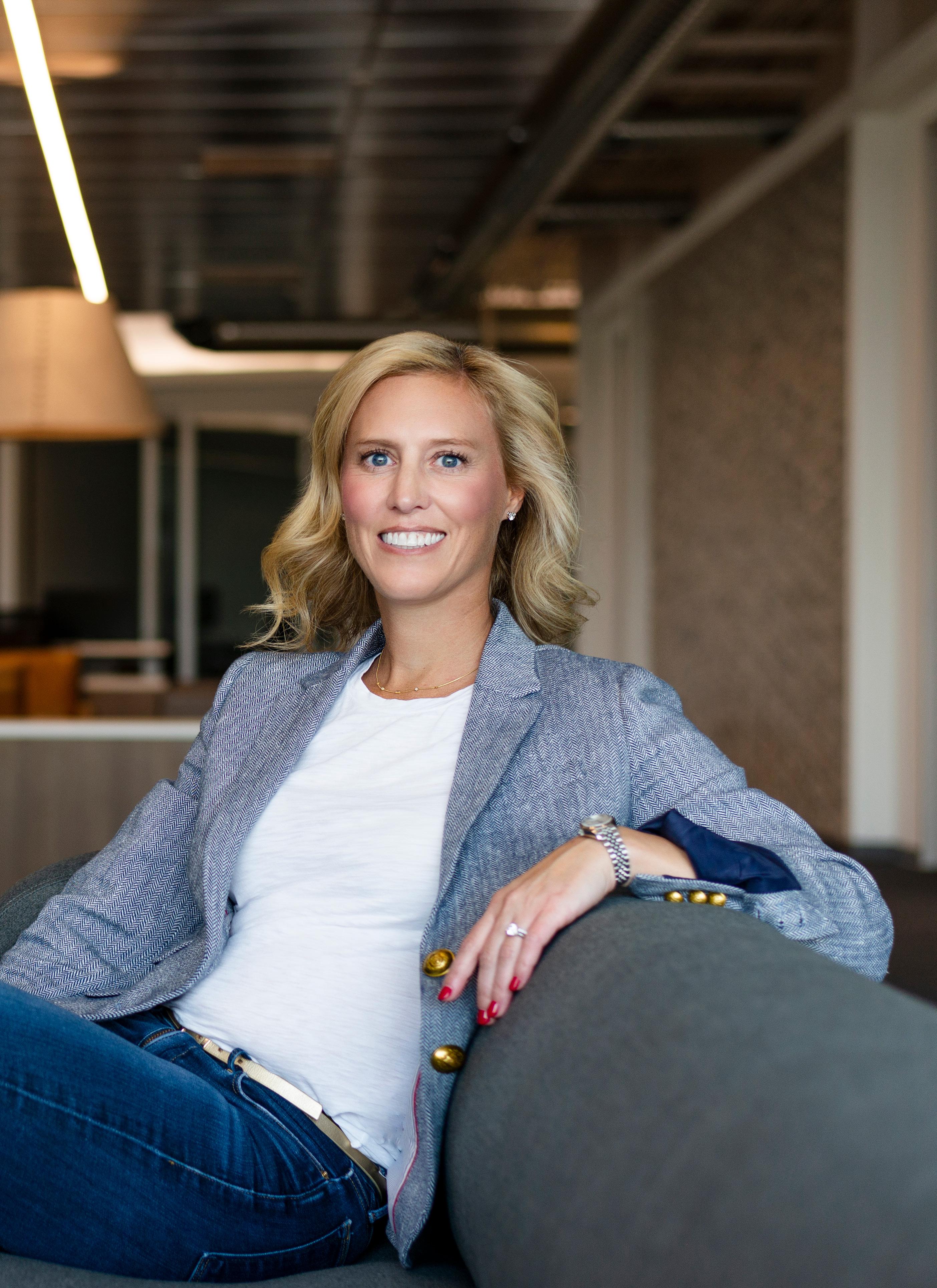 Lisa Storey General Counsel EverCommerce
Lisa Storey General Counsel EverCommerce
IN 2017, LISA STOREY TOOK A LUNCH MEETING WITH THE CFO OF an unassuming but ambitious tech start-up. The company, then known as PaySimple, had several important acquisitions in the works. As the meal ended, Storey suggested a few M&A lawyers for the CFO to contact and prepared to get up from the table. That’s when he said something Storey will never forget.
“He told me he could get an average M&A lawyer anywhere,” she recalls. “He wanted someone who knew how to start and run a general counsel’s office.” He believed that Storey was the perfect person for the job.
PaySimple is now EverCommerce, and as general counsel, Storey has been instrumental in helping the leading service commerce plat-
form hit astronomical growth numbers. Since she arrived in 2017, the company has completed fifty-one acquisitions and an initial public offering. That kind of growth is exactly why CFO Marc Thompson recruited Storey: EverCommerce had an aggressive strategy and needed an in-house legal leader who had experience growing an entire legal function from scratch.

Storey, who grew up in Connecticut, fell in love with Colorado during her days as a biology student at the University of Colorado–Boulder. Although she considered pursuing medicine, she opted for law at Vanderbilt and combined her passions by becoming a healthcare regulatory and compliance lawyer in the nation’s capital. After nearly three years, Storey found the call of Colorado too strong to resist and returned to Denver as an associate at Davis Graham & Stubbs.
Soon, however, a friend and mentor called to recruit Storey to a medical service helicopter company called Air Methods. As associate general counsel, Storey spent nearly five years alongside the general counsel leading significant acquisitions and recalibrating the company’s legal team to keep it tailored to the growing organization.
When she joined Air Methods, its legal department consisted of two lawyers and a paralegal. Five years later, the group included more than twelve people, including six attorneys, several paralegals, a government relations team, and a compliance officer. “I got hands-on experience building a legal team in a complex and heavily regulated industry,” she says. “That gave me the confidence to go into any industry and do it again.”
When Storey came to EverCommerce in 2017, it was on the verge of executing an important growth strategy that’s baked into its very DNA. The software as a service company offers its users business management, payment, marketing, and customer engagement tools. A leadership team created the EverCommerce platform to serve small and medium-sized businesses (SMBs) in industries like health
Jess Kornacki
Pivot 126
Lisa Storey General Counsel EverCommerce
services, fitness and wellness, and home and field services. “We wanted to create one platform with the tools tailored to service-based SMBs in each of their unique industries, so the acquisition strategy became to layer on the right products and services that make sense to specific SMB customers,” Storey explains.
In 2017, EverCommerce had 250 employees; today, it has more than 2,000. Storey says the growth hasn’t stopped since the day she joined. Starting as a department of one, she leaned on her experience learning complex third-party payer systems in healthcare and navigating burdensome healthcare and aviation regulations at Air Methods to master the world of a tech start-up and put the right people, policies, processes, and systems in place to guide EverCommerce’s meteoric rise.
The company’s other executives gave Storey an important directive: they asked her to focus on the big picture. She did that by asking herself important questions based on longterm goals. Leaders had a vision of what the company could become far beyond ringing the bell on the floor of the stock exchange. What kind of team would it take to support a world-class public company? What foundation could she build on day one that would still support the organization on day one thousand?
Those questions guided Storey’s early days at EverCommerce. She created a contracts policy within her first two weeks and then followed it up with a robust contracts management system that now houses over fifty thousand contracts. “When building a legal function, it’s important to make early investments that
will pay off later,” she says. “It’s much harder to go back and implement new systems later, when things are more bureaucratic and less nimble.” She then focused on making the right hires by targeting experienced, collaborative, creative lawyers who are willing to take calculated risks and consider diverse viewpoints.
In July 2021, EverCommerce completed an IPO that was years in the making. That same week, Storey also helped the company close two acquisitions and refinance credit. During the eight-month process, Storey was able to trust the high-functioning legal team she had built to keep the legal workstreams moving at their fast pace without missing a beat. As they step into this new chapter as a public company, she is focusing more on governance and her new role as corporate secretary.
Building and operating the worldclass legal function of a growing tech company is not for the faint of heart, but Storey says that lawyers shouldn’t forget to enjoy themselves along the way. That’s the number one lesson she shares with the younger lawyers she mentors.
“The best advice I can give is to be excellent at whatever you are doing at any given moment,” she says. “Seize every opportunity, work really hard, and don’t forget to have some fun in the process.”
Congratulations Lisa Storey
We applaud Lisa Storey’s outstanding leadership at EverCommerce and her ability to cultivate an environment that empowers her team to thrive and succeed in achieving results for the better of EverCommerce. We are honored to partner with Lisa and EverCommerce to help accomplish the team’s organizational goals. We look forward to supporting Lisa’s continued success.
Greenberg Traurig, LLP:

“We applaud Lisa Storey’s outstanding leadership at EverCommerce and her ability to cultivate a winning team environment. We are honored to partner with Lisa and EverCommerce and we look forward to supporting their continued success.”
–Matthew M. Robbins, Shareholder, Global Corporate Practice
127
2300
40
GT_Law Greenberg Traurig, LLP GT_Law GreenbergTraurigLLP
ATTORNEYS |
LOCATIONS° WWW.GTLAW.COM
Greenberg Traurig is a service mark and trade name of Greenberg Traurig, LLP and Greenberg Traurig, P.A. ©2021 Greenberg Traurig, LLP. Attorneys at Law. All rights reserved. Contact: Matthew M. Robbins in Fort Lauderdale at 954.765.0500. Attorney Advertising. °These numbers are subject to fluctuation. 35656
Don’t Back Down
Kelly Rezny rebuilt her life and academic career after a nearly fatal hit-and-run. She relies on the resilience, grit, and determination she gained to help Dyson manage adversity as the global brand’s new associate general counsel.
By Zach Baliva
IT WAS A NORMAL WEEKEND AT THE UNIversity of Kentucky when nineteen-year-old Kelly Rezny began her second semester, studying business management. One evening, after leaving a gathering with friends, Rezny’s life was changed in an instant when she was struck by a speeding car. The young student went through the windshield and her limp body was propelled onto a nearby lawn.
She awoke in the emergency room to the horrific sound of someone screaming. After a few disorienting moments, Rezny realized she was the one crying out in pain. The next day, her mother relayed what had happened. Rezny was struck and nearly killed by a drunk driver. She had fractured facial bones, broken her wrist and pelvis, dislocated both knees and a shoulder—tearing the major ligaments in them in the process—suffered road rash on much of her body, and received dozens of stitches. Rezny was lucky to be alive.
It’s been more than twenty years since the accident, and although Rezny still deals with
some physical consequences of the hit-and-run, she’s made a remarkable recovery. In the days, weeks, and months immediately following the impact, Rezny—a former athlete—had to delay her academic journey and learn to walk again. Multiple surgeries and the ensuing physical therapy were long and painful, but somehow, Rezny was back on campus in time for summer classes.
The ordeal made Rezny a fighter. It made her resilient. And it showed her how to overcome adversity. “The challenges we face make us stronger,” she says. “You don’t realize how much you can overcome until you’re faced with the impossible.” Rezny has carried those important lessons throughout her life and career and still draws upon them today in her role as associate general counsel at Dyson.
It was the criminal trial following Rezny’s ordeal that opened her eyes to the legal process and motivated her to study law. She knew that combining her business degree with one in law would translate well for a corporate role, but
Pivot 128

Lori K. Sapio
Kelly Rezny
Associate General Counsel
Dyson
first she gained experience at a prestigious New York firm focusing on aircraft and real estate finance, as well as M&A. After several years away from her midwestern home, she was ready to return and took a job in the Chicagoland area with a Fortune 200 global company, Illinois Tool Works Inc. (ITW).
As Rezny transitioned to the corporate world and ascended in her career, her experience with hardship also helped her navigate the challenges associated with being a woman in the legal profession. With ITW in organic growth mode, she had the chance to expand outside of a contracts role to become the commercial legal partner for two important $2 billion business segments. Frequently, Rezny was the only woman in the room, and she relied on her learned self-confidence to gain trust. “Women are often underestimated in a male-dominated environment. We’re not always given credibility; we have to earn it,” she affirms.
The adversity kept coming. In March 2020, she received the phone call many of her counterparts around the world were getting. The COVID-19 pandemic had hit, companies were shutting down, and workers were being mandated to stay at home. Leaders across ITW had questions. Were their businesses essential? Should employees return to work the next day? Was it safe to travel? Rezny was appointed the lead attorney globally to monitor local, state, and national orders and developing laws. She updated and advised leaders and legal colleagues on navigating the pandemic and developed protocols and resources. At the same time, she juggled other client needs and helped the company continue to grow, all while keeping employee safety the top priority.
Late that year, Rezny seized the opportunity to move from the manufacturing industry to the consumer-facing industry
130
“The challenges we face make us stronger. You don’t realize how much you can overcome until you’re faced with the impossible.”
and stepped in as associate general counsel at an iconic company—Dyson. After operating for nearly a year as the interim head of Americas legal with the top role open, she helped to onboard a new general counsel and other new members of the legal team. With a complete legal team now in place, she is focused on leveraging her expertise to advise on the commercial and transactional side of the business.
Rezny has adapted to her new company and the COVID environment. Dyson’s strategy once relied heavily on representatives demonstrating its products live in-store. Now, legal has partnered with the business and outside vendors to deliver digital experiences and online events to consumers. Additionally, the pandemic interrupted logistics and created global labor and supply shortages. Rezny has worked closely with the Dyson supply chain team to help with introducing new parcel carriers and other ventures to reduce lead time in order allow Dyson to keep up with the high demand for its products.
“Kelly began at Dyson during the pandemic—a challenging time for anyone starting in a new role,” recalls Ross Weisman, a partner at Kirkland & Ellis and colleague of Rezny’s. “I was struck by her ability to juggle multiple issues, while maintaining an even keel. Kelly has the unique ability to handle complex matters yet know when she needs help from outside counsel.”
The role also gives Rezny the opportunity to continue to work with a global company, implementing Dyson’s strategy in a key region—the Americas—where she provides localized input to the British company (which has headquarters in Singapore) and advises stakeholders in America, Canada, and Mexico. She’s excited about helping the well-known brand introduce new
Resilience & Persistence
Bring Global Growth & Profits
Faegre Drinker celebrates Kelly Rezny for her successes for Dyson, for her partnership with us as outside counsel and for her demonstration, particularly during the COVID pandemic, that resilience and persistence overcome global obstacles and win the day.

131 www.drinkerbiddle.com faegredrinker.com © 2021 Faegre Drinker Biddle & Reath LLP. All Rights Reserved.
Kirkland
www.kirkland.com
products and innovations in 2022 and beyond.
While everyone would agree it’s been a challenging time to be advising companies, Rezny has faced her fair share of obstacles head on—like the time she ran the Chicago Marathon with a fractured femur and no ACL. After the accident, Rezny thought her lifelong goal of running a marathon might never be possible, but rather than accept this, she began running in earnest again in 2013. It was a painful process, but in October of that year, she lined up in Grant Park at the start of the Chicago Marathon.
Thousands of vocal supporters, including Rezny’s family and friends, lined the course to cheer her on to the finish line while she raised thousands of dollars for the American Cancer Society. She still cites crossing the finish line as one of the best moments of her life. “It was emotional for me because it reminded me of everything I overcame to get there,” she says. “And it taught me to look ahead to everything I can still accomplish.”
Faegre Drinker:
“Since taking on her new role at Dyson in the midst of the COVID pandemic, we’ve been privileged to experience Kelly’s skills at navigating shifting scenarios while keeping her eye on the ball and also proving that relationships are sure paths to success.”
–Cheryl Orr, Partner
132
& Ellis
North LaSalle, Chicago,
Kirkland
LLP 300
IL 60654 +1 312 862 2000
to join in
of Dyson
& Ellis is proud
recognizing our friend and client Kelly Rezny
Recipe Successfor
When COVID-19 threatened to shutter the restaurant industry, TGI Fridays turned to technology. Leanne Stendell led the legal deals that kept the beloved chain’s seat at the table.
 By Zach Baliva
By Zach Baliva
IN EARLY 2020, TGI FRIDAYS WAS PREPARED FOR a comeback. The well-known restaurant chain had overcome financial struggles, hired a new CEO, and restructured its management team. With the remade organization ready to change owners and go public, its marketing team launched an ad campaign that encouraged people to unite inside its fast-casual dining locations. Then, in March, COVID-19 put an end to social gatherings and forced restaurants and businesses to close their doors.
The pandemic threatened most businesses and industries in the United States, but it was particularly challenging for a company on the brink of a turnaround. TGI Fridays and Allegro Merger Group canceled their announced merger along with plans to take the company public. While the news would have devastated some companies, TGI Fridays leaders huddled together and formed a plan: the company would survive the pandemic by adapting its business model to take advantage
Associate General Counsel TGI Fridays
Courtesy of Leanne Stendell
Modern Counsel 133
Leanne Stendell
of new opportunities created by increasing demand and shifting consumer behavior.
Over the past two years, Associate General Counsel Leanne Stendell has created the legal framework for the new deals and partnerships that will help TGI Fridays compete on the new playing field created by COVID-19. Stendell, who knows Fridays well, is the right person for the job. As the organization’s first in-house trademark attorney, she built the practice from the ground up, putting in place all the necessary systems and procedures, including document management and docketing. Additionally, she selected all the foreign counsel partners in the approximately sixty countries where Fridays is active as well as the dozens of other countries in which Fridays maintains trademark filings.
The pandemic hit Fridays hard. The organization immediately closed its corporate headquarters to all but essential staff in March 2020. At the height of the pandemic, only a handful of its 380 domestic locations were operational. “When your customers are literally prohibited from patronizing your business, tough times are inevitable,” Stendell says. “There were widespread furloughs, and during the early days in the spring of 2020, our budgets took a big hit.”
Stendell and her colleagues had to move quickly. They first developed a set of decisionmaking standards to guide a time of unprecedented challenges. “Our first priority was making sure employees and guests were safe,” Stendell explains, adding that TGI Fridays monitored evolving federal, state, and local guidelines and implemented cleaning and safety protocols.
With Fridays seeing e-commerce transactions quadruple, it quickly became clear that off-premises sales were the key to survival during the lockdown. In response, Fridays identified and implemented three new technology platforms. Legal negotiated the contracts and partnerships to take these ideas from concept to
134
“Anybody can succeed in an atmosphere where the budget is almost unlimited, but you have to live through these trials by fire to become an expert in doing more with less.”
reality in record time. They started curbside pickup within three days, launched to-go alcohol sales in jurisdictions that began permitting them, and converted parking lots to outdoor dining rooms.

To help existing restaurants maximize sales, Fridays’ business team created virtual restaurant brands offered only via delivery partners like DoorDash, Uber Eats, and Grubhub. “It was an amazing way to put underutilized capacity to work while in-restaurant dining was still not possible, and it saved an untold number of jobs,” Stendell explains.
Legal had to clear and protect concept and product names, form the new business entities, and secure all state registrations and permits while renegotiating partnerships with delivery service providers. It took quick legal footwork to make these changes happen, but once they were in place, TGI Fridays was back in a favorable position.
In this fast-moving environment, Stendell admits she sometimes had to look past “best practices” and embrace “good-enough practices.” That can be a tough pill to swallow for a professional and a perfectionist, but Stendell thinks the exercise ultimately made her a stronger lawyer. “Anybody can succeed in an atmosphere where the budget is almost unlimited, but you have to live through these trials by fire to become an expert in doing more with less,” she says.
The measures Stendell and the legal team implemented helped the company keep most of its restaurants in business. Before the
pandemic, takeout and delivery orders accounted for a fraction of total revenue. Now, that number has increased by more than four times. As countries around the world reopen, Fridays is deploying single-use menus, contactless payments through its app, and other strategies to enhance customer and employee safety.
Stendell studied journalism, went to business school, and earned an MBA before transitioning to law. While at Haynes and Boone, she helped build an international trademark clearance process to serve high-volume clients at home and abroad. That experience, together with the skills she developed at other in-house roles, has helped as Fridays expands into new brands and virtual brands in the US and around the world.
In late 2021, the company announced plans to join Reef’s platform and open three hundred “ghost kitchens,” the trendy pop-up commercial kitchens that prepare and send delivery orders directly to customers. TGI Fridays is the first global dining brand to partner with Reef.
The perseverance, leadership, and innovation demonstrated by their teams throughout this period have TGI Fridays’ executive team feeling optimistic. “People are returning. We’re known for great food and a welcoming atmosphere, and we think people are going to discover or rediscover their love for the brand,” Stendell says. TGI Fridays is ready for a second bite at a comeback.
135 AUSTIN | D.C. www.pirkeybarber.com
Congratulations
Pirkey Barber is one of the largest firms in the United States focusing on the fields of trademark, copyright, and unfair competition law.
to
our friend
Leanne
Stendell of TGI Fridays for this well-deserved recognition of her leadership and accomplishments.
Creating Trust
 Harrison Senior Associate General Counsel
Celeste
Jabil
Clarissa Dane Hughes
Harrison Senior Associate General Counsel
Celeste
Jabil
Clarissa Dane Hughes
Pivot 136
Celeste Harrison applies lessons from competitive ballroom dance to her work as an in-house lawyer and leader at Jabil
 By Natalie Kochanov
By Natalie Kochanov
WHEN HER YOUNGER BROTHER GOT engaged in early 2020, Celeste Harrison signed up for a ballroom dance class in preparation for the wedding. “I went to a little studio in Sarasota,” she says. “I was just going to do ten lessons to brush up on my social dancing basics, and then I got this teacher with huge, beautiful white hair wearing a velvet-sequined white blazer on a Tuesday afternoon.”
That instructor encouraged Harrison to try her hand at competitive ballroom dance. With a little push, Harrison agreed. One year later, she can’t imagine a better hobby—or a better learning environment. Ballroom taught her to trust her partner, be present in the moment, and let go of what she can’t control. These skills help her excel not only on the floor, but also in her legal practice as senior associate general counsel at electronics manufacturing services provider Jabil. She brings a creative mindset and successoriented leadership style to the role, which will soon see her relocating to the company’s Shanghai office.
After graduating from the Temple University Beasley School of Law, Harrison spent several years in private practice. She always knew she wanted
to go in-house and ultimately made the jump to aerospace company Boeing in the wake of the 2008 recession. “I learned more about in-house work at Boeing than I could have anywhere else,” she says. “Boeing taught me how to get something done with innumerable colleagues, numerous divisions and business entities, and funding coming from many different locations.”
Furthermore, Harrison discovered that working in-house allowed her to embrace her individuality in a new way. “When you’re practicing law in private practice, being different is not seen as an asset. But in-house, it’s absolutely essential,” she explains. “Of the services a lawyer provides now, research is the baseline. Lawyers need to have an abundance of imagination and creativity because it isn’t only about issue spotting anymore.”
Harrison applies the same standard at Jabil. “The support I give as a lawyer—and the support I’m looking for in my outside counsel—is not just researching what the law says. If you’re supporting an industry that is prioritizing growth and innovation, you need to find ways to be creative and meet your business colleagues in the business paradigm they’re pursuing,” she says.
Modern Counsel 137
In her nine years at Jabil, Harrison has supported business units ranging from the defense and aerospace division where she started to the enterprise, print, and retail divisions where she finds herself today. “When I got to Jabil, it was very much a right place, right time situation because the company was just embarking on a period of growth, change, and maturity. I already knew how to maneuver within a large organization, so I was able to provide additional value to my internal business customers,” she says.
Beyond adding value on the business side, Harrison has leaned into her role as a legal leader. Even early on in her tenure at Jabil, she went out of her way to support her colleagues as much as she was supporting the business itself. “When I left the defense and aerospace business unit, I was given a direct report in Ukraine,” she explains. “She had been with the company for many, many years, but through my work with her, she became more engaged with her job.”
Harrison coordinated with other members of the legal function to expand her engagement-driven approach across the European Union. As a result, Jabil employees in the region left their silos and started operating in a truly collaborative mode.
“Celeste played a critical role in our work with Jabil,” says Daniel
Wuhrmann, equity partner at Reuschlaw Legal Consultants, a German law firm specializing in product compliance and liability. “Her leadership skills and quick adaptation to European legal structures guaranteed a smooth and effective workflow at all times.”
As a leader, Harrison seeks to position her team members for success in their current roles as well as their careers more broadly. “Leadership is about helping my team be unafraid, enthusiastic, and optimistic about their futures,” she says. “I don’t
need to prove that I’m the smartest, most important person in the room. I need my people to feel confident enough to do their jobs well and empowered enough to make the hard decisions.”
Harrison believes that she can best serve her team members by trusting in their abilities—a task made easier thanks to her time on the competitive ballroom dance circuit. “In ballroom, you are working to create something that did not exist before. You have to trust that your partner is going to do their job well enough that
Pivot 138
“In ballroom, you are working to create something that did not exist before. You have to trust that your partner is going to do their job well enough that you can focus on doing your own job.”
you can focus on doing your own job,” she says. “It’s hard because you want to be an independent creature, but that is not how you create the best look or the best art out on the floor. You have to do it together.”
Ballroom has also taught Harrison to home in on the elements of a situation that she can control at any given moment. This focus on her own actions and reactions helps her stay grounded in her work at Jabil, where her next challenge will entail driving engagement and collaboration within her current team, based in Singapore, Taiwan, and China.
With a transfer to Shanghai on the horizon, Harrison hopes to continue supporting both her colleagues and her business units as she adjusts to her new home, closer to her team members. She also hopes to keep dancing—to remain in tune with herself and to relate to the people she will meet abroad.

“The great thing about ballroom is that you have to build a connection with another person,” says Harrison. “That connection is really valuable.”
Editor’s note: At the time of press, Celeste Harrison is no longer at Jabil.







139
A Bright Future
Bryan Warner helps Budweiser grow in the Asia-Pacific beverages market while maintaining a deep appreciation for differing perspectives, experiences, and values
 By Zach Baliva
By Zach Baliva
140
Billy Choi
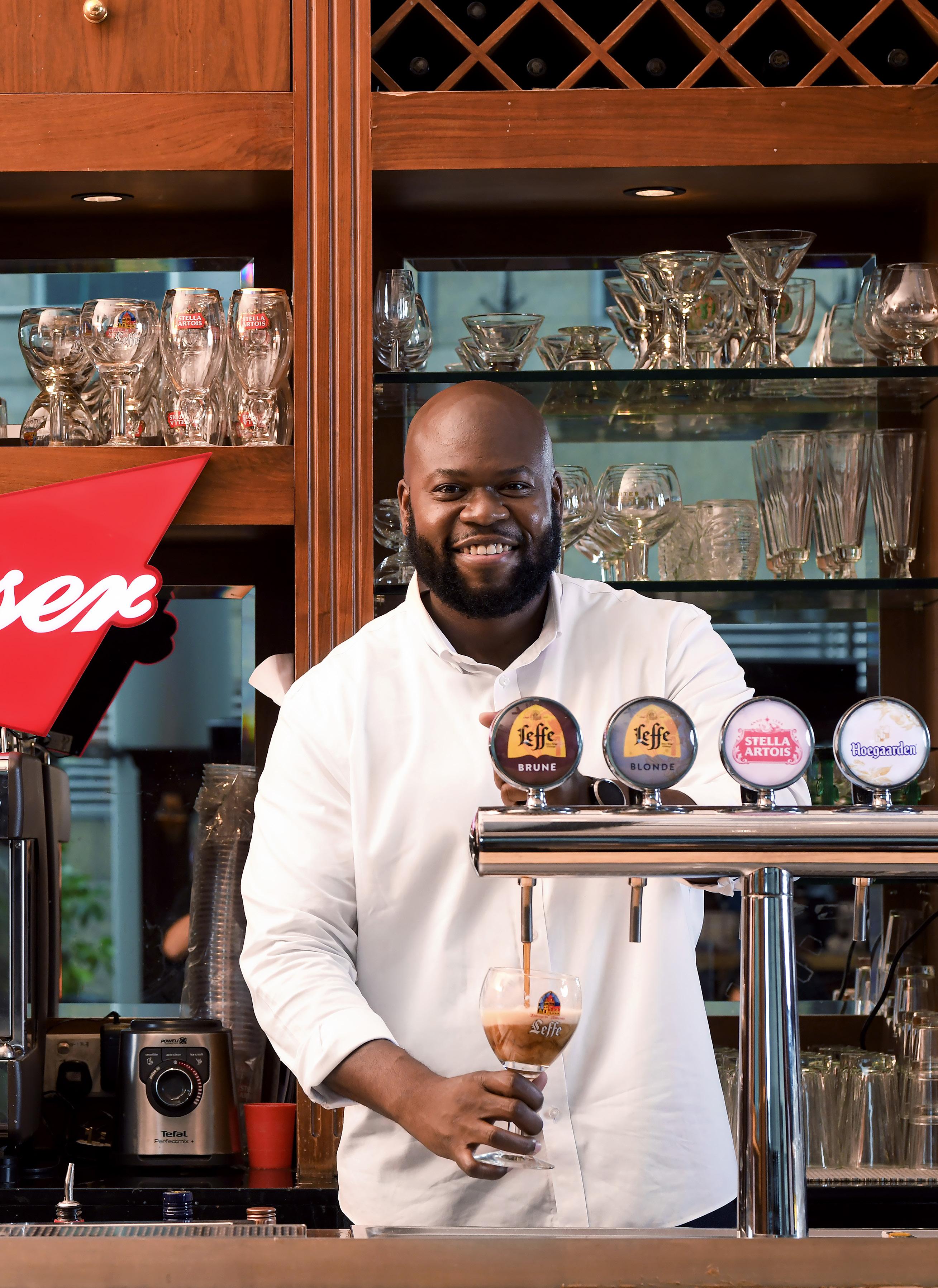
JULY 2019 WAS A MONTH BRYAN WARNER will never forget. At that time, he was Anheuser-Busch InBev’s global director, legal commercial, and M&A, and had been working tirelessly to take Budweiser Brewing Company APAC public on the Stock Exchange of Hong Kong. But on July 12, the company decided not to proceed with what would have been the year’s largest initial public offering.
The suspended $9.8 billion IPO disappointed Warner and a core team of AnheuserBusch InBev colleagues who had developed the transaction for many months. However, the setback was only temporary. On July 14, Warner flew to London for negotiations, and by July 19, AB InBev announced a deal to sell its Australian unit—at that time, part of its APAC footprint—for $11.3 billion. The strategic divestment accelerated AB InBev’s expansion into other fast-growing markets in the Asia-Pacific region.
“Australia already has a very mature beer profile, and our investors were looking for growth opportunities in places like Vietnam, India, China, and Southeast Asia,” Warner says. It also accelerated the expansion of Warner’s international career.
Warner first started with AB InBev in New York as global director, legal commercial and M&A, where he was leading securities and corporate governance matters and large transactions across developed and developing markets in Africa, Asia, and the Americas before relocating to Hong Kong in 2020. This followed a six-year stint at Cleary Gottlieb
Steen & Hamilton. Warner was drawn to Cleary Gottlieb because of its international footprint and colleagues, and his practice— securities law and international and domestic M&A—laid the foundation for joining AB InBev in 2018.
After announcing the Australia divestiture, it took Warner and his colleagues merely two months to reconfigure their business plans and make a successful debut for Budweiser APAC on the Stock Exchange of Hong Kong on September 30, 2019. The company ultimately raised $5.75 billion, with an approximate enterprise value of $45 billion. Warner was working out of New York and Hong Kong at the time. In addition to shepherding regulatory approval of the transaction, he helped develop the governance and operational infrastructure required for Budweiser APAC to operate as a publicly listed company, where he now also acts as joint company secretary.
With the public company platform in place, Budweiser APAC is poised to become a growth leader in the beverage industry in the Asia-Pacific region. “Consumer goods growth over the next decade will come in Africa and Asia, so these have to be key focus areas for every global company. More than half the world’s population lives in Asia-Pacific, which means that we in Budweiser APAC have a great opportunity,” Warner says. By 2030, experts predict, 65 percent of the world’s middle class will live in China, India, Indonesia, Thailand, the Philippines, and the other countries that constitute the Asia-Pacific region.
Pivot 142
“I enjoy speaking to my colleagues around the world to share experiences and solve problems, but I’ll usually learn something new about a person, their culture, or consider a new idea, and that’s most rewarding.”
As Budweiser APAC expands deeper into these markets, Warner and his colleagues have been establishing a framework of best practices and ways of working to ensure the highest standards of business integrity and ethics. The legal department at AB InBev operates global “communities of practice” where, for instance, colleagues at Ambev, its Brazilian listed subsidiary, could share ideas and strategies relevant to a legal problem at Budweiser APAC to avoid pitfalls and deliver better results.
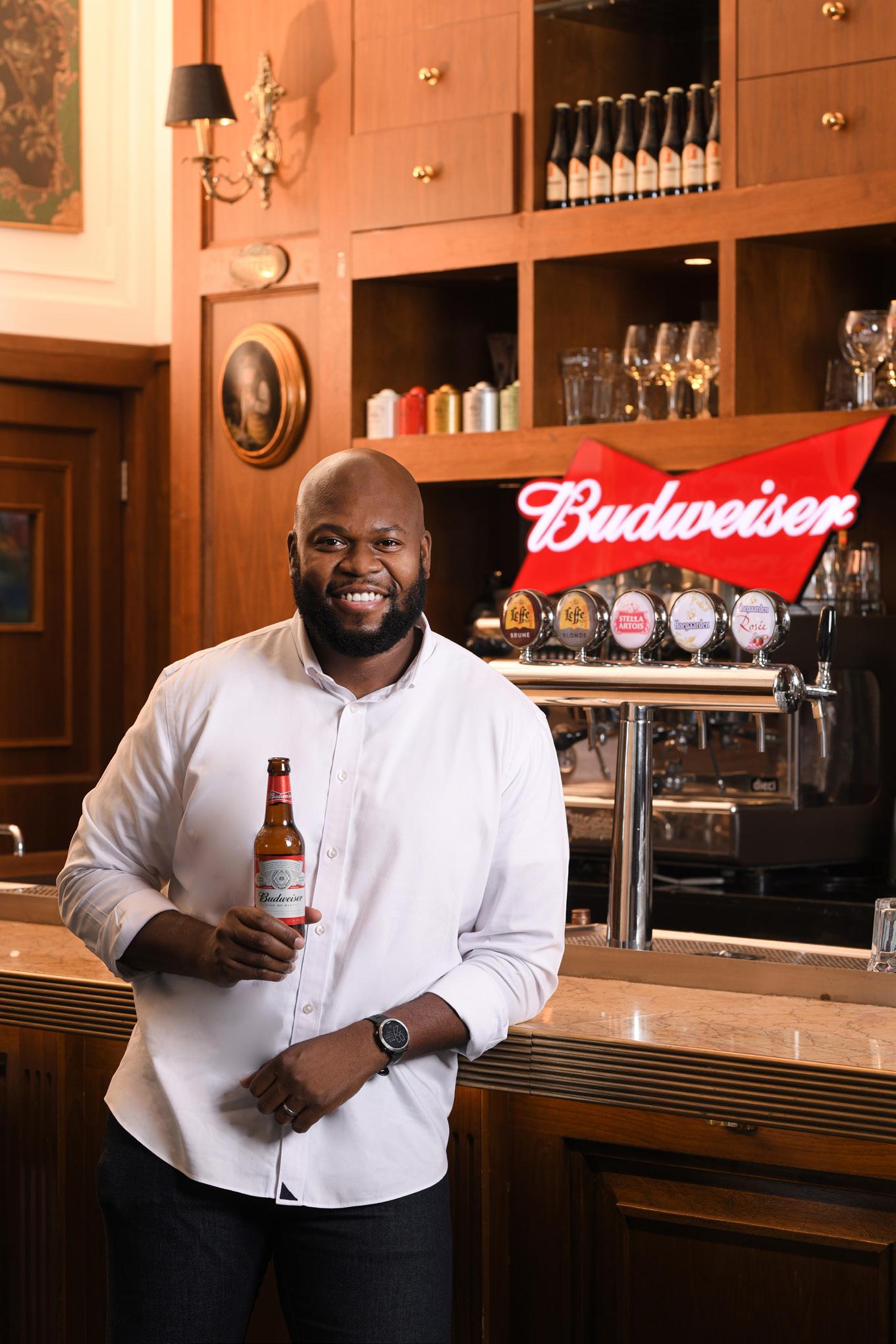
“I enjoy speaking to my colleagues around the world to share experiences and solve problems, but I’ll usually learn something new about a person, their culture, or consider a new idea, and that’s most rewarding,” Warner explains.
On the back of its second anniversary as a public company, Budweiser APAC aspires to be a leader in environmental, social, and governance (ESG) practices through diversity and sustainable finance, leveraging its global scale and know-how. Earlier this year, Warner and his colleagues spearheaded a deal to secure a total of $500 million Sustainability-Linked Revolving Credit Facility, one of the largest of this kind among publicly listed consumer goods companies in Asia-Pacific. According to Warner, the deal showcases the company’s ability to capitalize on its achievements in sustainability while integrating ESG performance with financial metrics and attracting a broader investment base.
With more than twenty-five thousand employees across Asia, the makeup of the company’s teams generally reflects the diversity of its consumers, which the company sees as a competitive advantage. Warner explains that while there is more work to do
regarding equity and inclusion, more than 60 percent of the legal and corporate affairs senior leadership team is female and the company has the most diverse board for a large corporation on the Stock Exchange of Hong Kong, with more than 40 percent female directors.
Promoting diversity outside work is also important to Warner. As a son of a Jamaican immigrant and a
first-generation American, Warner has an appreciation of differing perspectives, experiences, and values. It has been “integral to my upbringing and drives my curiosity,” he says. Warner is also a founding member of the group 1844, named for the year Macon Bolling Allen became the first Black person to be licensed as a lawyer in the United States. It’s composed of
Billy Choi
Modern Counsel 143
Bryan Warner Deputy General Counsel and Joint Company Secretary Budweiser Brewing Company APAC
Black male lawyers who have gone on to prestigious roles like senior in-house counsel or partners in well-known law firms. For Warner, diversity, equity, and inclusion is more than a value proposition: it is a core value.

Warner explains that 1844 “has been integral to my career from a peer mentor perspective and continues to be useful as each of us progresses up the corporate ladder.” Warner lives in Hong Kong with his wife, Sandra Irby, also a lawyer; they share personal and professional challenges, balancing full-time work and raising three small children together. For several years, Warner was on the board of the Opportunity Agenda, a social justice communication lab that works to leverage the power of communication and collaboration to drive lasting change.
“I’ve always known I wanted an international career, so at every step, I’ve sought out experiences and environments that differ from my own, which I hope has made me a more thoughtful person,” Warner says. “I know it’s made me better at my job. Bringing my family along with me during my journey affords me the opportunity to keep these values in practice daily.”
Sullivan & Cromwell:
“We have worked with Bryan on many complicated projects, and he is one of the best corporate counsel we know. Smart, dedicated, and great commercial sense.”
–John Horsfield-Bradbury and Garth Bray, Partners
144 Congratulations to our friend Bryan Warner for his recognition in Modern Counsel freshfields.com Freshfields Bruckhaus Deringer US LLP Sullivan & Cromwell is delighted to congratulate our client Bryan Warner of Budweiser APAC on his recognition by Modern Counsel www.sullcrom.com new york washington, d.c. los angeles palo alto london paris frankfurt brussels tokyo hong kong beijing . melbourne . sydney
Public

Featuring nine trailblazers committed to bringing diversity, equity, and inclusion to their workplaces and beyond 146 149 154 158 162 168 172 176 179 Jessica Kelman Pure Storage Jennifer K. Parnell JPMorgan Chase Alica Del Valle Airbnb Danyelle S.T. Wright The E.W. Scripps Company Rich Rosalez Samsung Electronics America Cathy Coppedge-Jinks
Warren Mercury Insurance
Aflac Jill
Greta Katz
Storage
Aerospace Modern Counsel 145
Allison Nold Collins
Jessica Kelman ensures a culture of innovation shines at Pure Storage despite a challenging pandemic
By Zach Baliva

WHEN IT COMES TO UNDERSTANDING HOW COMpliance intersects with culture during the ongoing COVID-19 pandemic, few people are in a better position than Jessica Kelman. The senior ethics and compliance counsel joined Pure Storage in March 2020. On March 16, 2020, to be exact—the same day Governor Gavin Newsom issued a stay-at-home order in her home state of California.
At first, Kelman and her leadership team, like most people in America, thought they would be working from home for about two weeks. As the pandemic dragged on, however, it became increasingly obvious that Pure Storage’s nearly four thousand employees would be away from the office for a longer period of time.
The Silicon Valley company delivers a portfolio of advanced data solutions and services to help customers modernize their technology infrastructure, operations, and applications. Although Public Storage’s nimble and agile workforce seems in some ways made to thrive in a remote environment, Kelman knew she would have to pivot to monitor emerging legal issues related to tone, privacy, information security, ethics, and mental health.
Focus: DEI 146
As these issues continue to evolve, Kelman says lawyers working in compliance and ethics must keep careful watch for areas of risk and danger. “Legal departments are used to looking at history and precedent. We often look backward, but we have to be forward-thinking right now,” she says. At Pure Storage, that means working with HR, finance, marketing, business leaders, and others to increase transparency and set sound strategy.
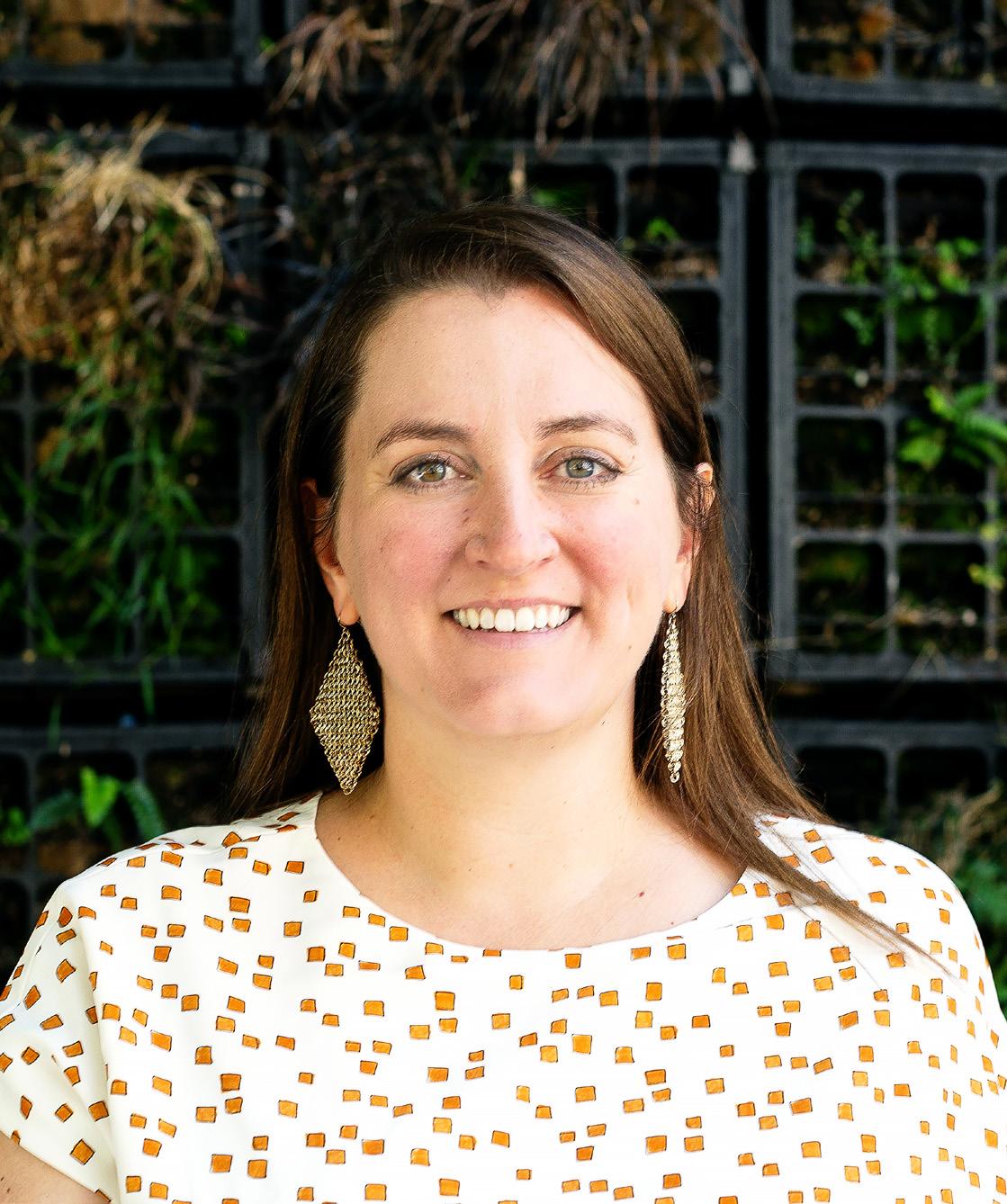
A true multidisciplinary approach lays the groundwork for success at a company like Pure Storage, which does business in forty-seven countries. Careful communication and purposeful collaboration help Kelman understand how the pandemic is affecting each region and what her department needs to do in response. Although the pandemic has reduced her opportunities to gain industry insights through seminars, meet-ups, and lunch meetings, she is seizing every opportunity to solicit advice and import best practices from her peers and counterparts at other organizations.
Pure Storage (known simply as “Pure” by its clients and employees) started in 2009, launched cloud services in 2018, and topped $1 billion in annual revenue before ending its first decade in business. It has a Net Promoter Score of 83.5, which places Pure in the top 1 percent of business-to-business companies. Internal programs like Pure Good leverage financial investments and volunteer employee support to make a positive impact.
These factors helped Pure Storage build a strong corporate culture, which Kelman is looking to preserve, strengthen, and evolve in the unpredictable era of COVID-19. That’s accomplished through company-wide surveys and analytic measures including a culture of compliance survey that her own department led. The online tool asks employees whether they feel supported coming forward with concerns and if

“It’s easier for people to get into legal trouble when they feel intense pressure and disconnected from others at the same time, so we want to support our employees and give them the tools they need to thrive in the midst of difficulty.”
Jessica Kelman
Modern Counsel 147
Senior Ethics & Compliance Counsel Pure Storage
Courtesy of Pure Storage
Defining Leadership
executives are setting the right tone as well as whether the company is living its values.

Identifying potential problems and areas of risk is especially important in a COVID environment, where isolated employees work with less direct oversight and often experience more stress. Kelman, who started her career in white-collar criminal defense, knows well how high-stress environments can contribute to bad decision-making and professional misconduct.
“It’s easier for people to get into legal trouble when they feel intense pressure and disconnected from others at the same time, so we want to support our employees and give them the tools they need to thrive in the midst of difficulty,” she says.
Her team created Pure Compliance Club, an annual week of creative trainings and events that go beyond reiterating rules and policies to provide guidance on broader topics like ethical decision-making, ethical product design, and other related issues. Kelman is also working to make sure executive leaders set the right tone. She is also partnering with HR to provide mental health services and other resources for managers and their employees.
These are the main issues Kelman is watching as Pure Storage prepares to welcome employees back to its offices in Mountain View, California, and around the world. Running the organization’s global compliance program requires her to prioritize workflows and stay in communication with colleagues in key markets and various jurisdictions.
She starts each morning talking with teammates in Europe, then moves on to her counterparts in Australia and the Asia-Pacific region in the afternoon and early evening. She’s also careful to build the right relationships with leaders throughout the organization.
“I can’t implement strong programs unless I have strong relationships,” she says. “To do a correct risk assessment, you have to really understand each business unit because you have to know what’s happening, what challenges they face, and where they want to go.”
In recent months, Pure Storage’s leadership team has been vocal about both the company’s success and its ambitions. In July 2021, it expanded its subscription services, first launched in 2018. The following month, Pure announced its latest financial results. Revenue growth exceeded 23 percent; it was the best quarter in company history. Pure is poised to continue pushing innovation forward, and Kelman’s team is ready to help the business deliver comprehensive solutions to its customers.
Vinson & Elkins:
“Jessica is a brilliant lawyer, with terrific judgment and an ability to read people and situations. She has great instincts and an ability to navigate difficult situations with ease. It is an honor to have her trust and confidence.”
–Matt Jacobs, Partner

V&E salutes our alumna Jessica Kelman. Vinson & Elkins LLP Attorneys at Law Austin Dallas Dubai Houston London Los Angeles New York Richmond Riyadh San Francisco Tokyo Washington velaw.com
148
By Noah Johnson
FOR JENNIFER K. PARNELL, DIVERSITY HAS been a passion throughout her career. She currently serves as vice president and assistant general counsel in JPMorgan Chase’s government investigations and regulatory enforcement (GIRE) group, and says she’s learned to have “a diversity of practice,” meaning she’s able to quickly adapt to the nuanced issues that she’s tackled throughout her career. But she’s also dedicated to helping more attorneys of color get opportunities in her field—which can benefit not just aspiring lawyers, but also any business that wants to succeed.
“I think it’s key to the longevity of any business to have a diversity of people working for your company,” Parnell says. “If we all are the same, we won’t have a diversity of ideas; we won’t have

At JPMorgan Chase, Jennifer K. Parnell works to lift others up and increase diversity by empowering those who are interested in advancing their legal careers
Modern Counsel 149
Jennifer K. Parnell VP and Assistant General Counsel JPMorgan Chase
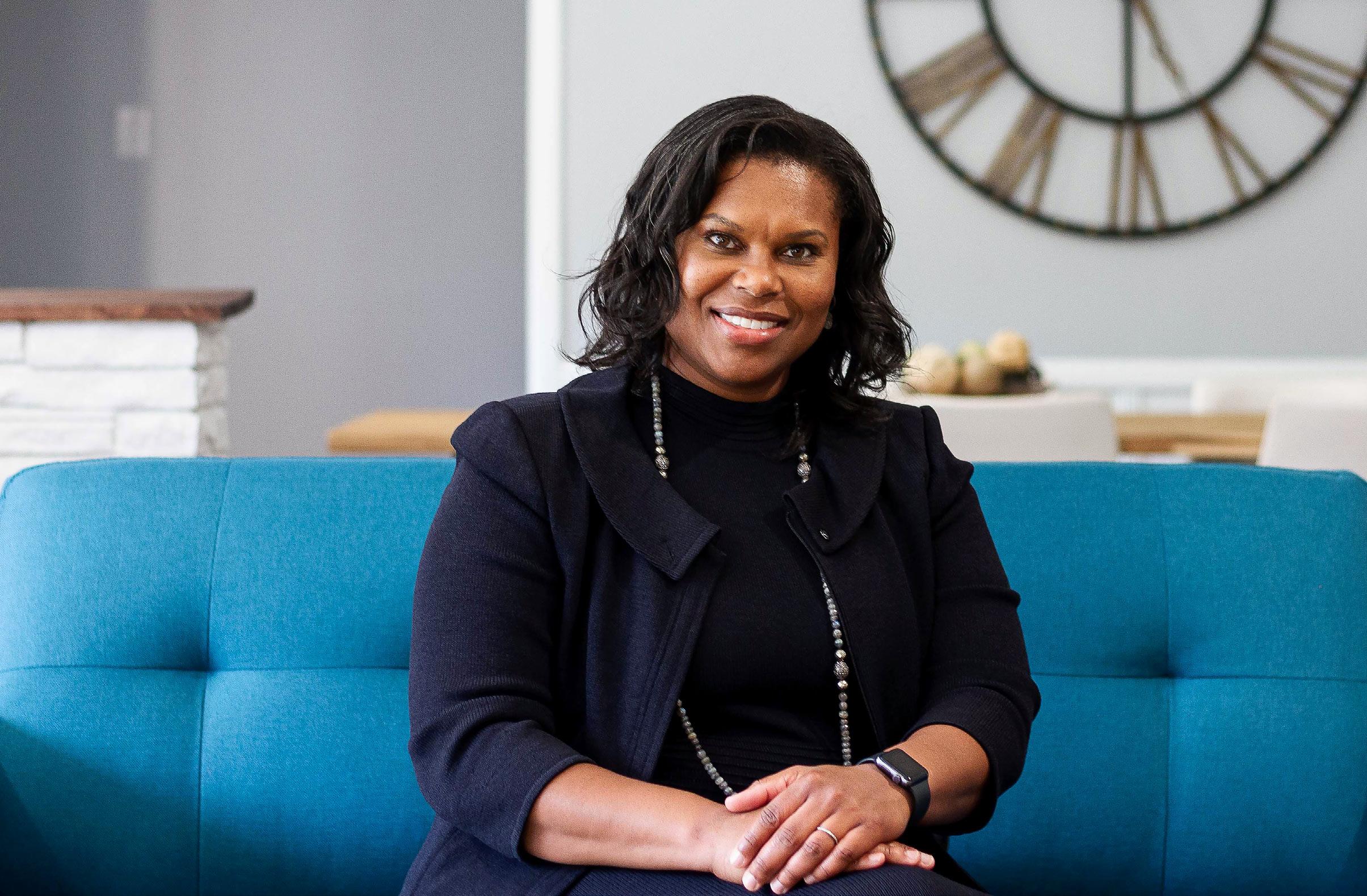
different perspectives at the table. As a result, you’re going to miss some stuff and your business will suffer.”
She believes her passion for diversity was cemented in law school when she was introduced to a quote by Mary Church Terrell, a women’s suffrage and civil rights advocate. She still remembers it: “lifting as we climb, onward and upward we go.”
The quote continues to resonate with her, Parnell says, especially when she thinks of the mentors who’ve helped her throughout her career.
“It’s imperative that as a minority professional who has achieved what one

might define as ‘success’ of any sort, you don’t say, ‘Hey, thank goodness I got here’ and pull the ladder up behind you,” she says. “You try to lift up other people and show them the way that you got there—and that was something that was done for me.”
Parnell found some of her first mentors at Texas law firm Locke Lord (formerly Locke, Liddell & Sapp), where she worked as a summer clerk and an associate attorney early in her career. She was drawn to Locke Lord due to the diversity in its attorney ranks, which few other Dallas firms were able to match at the time. The
Focus: DEI 150
Byron Sanders
firm also made her feel like a valued asset; she ended up staying for thirteen years.
She also notes that she decided to stay at the firm because she sensed that it would help her develop as an attorney. “I thought, ‘This is where I can grow, where someone might take an interest in my career and mentor me,’” she says.

Parnell received not only support from the firm but also a wide range of experience that came from working in a variety of roles. After doing what she jokingly calls “baby lawyer work” for a while, she moved into a general litigator role where she worked on whatever came through the door.

As she became a more senior attorney, her focus narrowed a bit. From 2008 to 2010, during the financial crisis and the recession, Parnell worked on a lot of financial services litigation and became proficient in that area; her work earned her the role of partner in the firm in 2015. As a partner, she represented mortgage companies and financial institutions in state and federal court actions in a variety of contexts, including claims involving wrongful foreclosure, breach of contract, and allegations of fraudulent and negligent misrepresentation.
In 2019, Parnell decided to make the leap from private practice to her current in-house counsel role because she wanted a new challenge. “I felt like I was leaving for college,” she says. “I needed to spread my wings and go do something different.”
The GIRE group that she is part of sits within the litigation section of the legal department at JPMorgan Chase. The group provides legal advice and counsel to the business related to inquiries from law enforcement and regulatory agencies. Though the subject matter differs slightly from her private practice work, she deploys similar skills: Parnell continues to be agile, a quick thinker ready to assess a situation and provide well-reasoned and thoughtful advice.
“It’s made me realize that over the years of practice, I have been able to really hone some of the legal analytical skills you develop as a lawyer,” she says. “It gives me the confidence to go and do things that wouldn’t necessarily be in my wheelhouse—but when you have those baseline skills you’ve developed for years, you think, ‘I can figure this out.’”
Parnell has made an effort to promote diversity both inside and outside her company. Fortunately, she says, JPMorgan Chase is
“I think it’s key to the longevity of any business to have a diversity of people working for your company. If we all are the same, we won’t have a diversity of ideas; we won’t have different perspectives at the table.”
Modern Counsel 151
an active partner in this effort. In an open letter signed by Chase’s general counsel and other GCs in September 2020, Parnell was proud to see the company publicly promote the importance of advancing diversity in the legal profession. Parnell is actively involved with the company’s internal legal diversity groups, and was recently named a cochair of one group. In the future, as part of her cochair duties, she hopes to meet corporate and attorney partners in the Dallas area to grow JPMorgan Chase’s relationship with them and collaborate on diversity initiatives.
She’s especially interested in creating a pipeline for diverse attorneys, particularly Black women, to get job and business development opportunities at places like Chase. Together with


“It’s imperative that as a minority professional who has achieved what one might define as ‘success’ of any sort, you don’t say, ‘Hey, thank goodness I got here’ and pull the ladder up behind you. You try to lift up other people and show them the way that you got there—and that was something that was done for me.”
Focus: DEI 152
Byron Sanders
other Black female attorneys, she founded the Network of Empowered Women (NEW) roundtable six years ago. She’s still involved in the group, a collection of in-house and private practice attorneys who promote each other’s careers through intentional professional development, networking and mentorship activities.
The group also provides other resources to members to help them achieve their career goals, and currently has more than ninety members from more than thirty law firms and forty in-house legal departments. The mission of NEW is to empower, impact, and influence, Parnell says, and it’s allowed members to get a shot at job and business development opportunities they might not have otherwise gotten.
Trusted Advisors Passionate Advocates

Locke Lord LLP:

“Locke Lord congratulates Jennifer on this well-deserved recognition. Having worked with Jennifer for over ten years at Locke Lord, Jennifer demonstrates intelligence, creativity and a constant calm demeanor no matter the circumstances.”
–Rob Mowrey, Partner
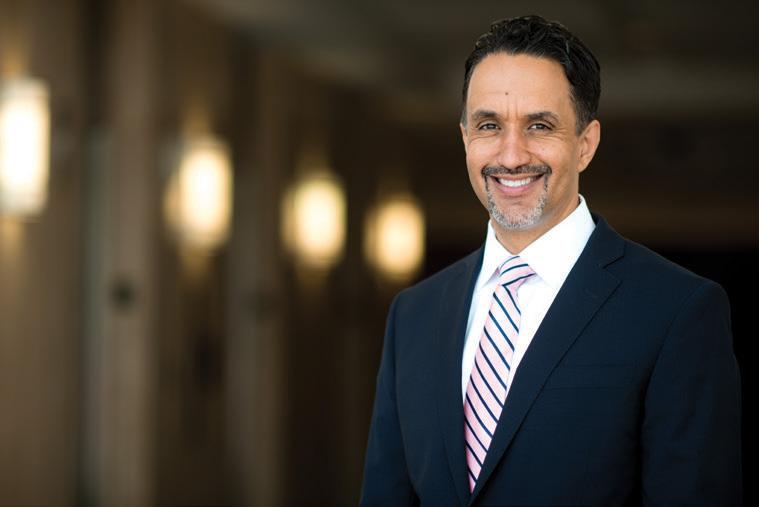
Sanders Collins PLLC:
“Jennifer’s attention to detail, judgment, work ethic, and legal instincts are second to none. Having worked with Jennifer for over ten years, I can attest to her unparalleled acumen, expertise, integrity, and ability to make the complex simple.”
–Jason L. Sanders, Founding Member
153 Congratulations to our friend and client Jennifer Kinney Parnell Vice President, Assistant General Counsel on this recognition of your legal accomplishments and contributions to JPMorgan Chase © 2021 Locke Lord LLP www.lockelord.com Sanders Collins PLLC meets all its clients' needs with the quality, attention to detail, and expertise expected from a large firm but with the efficiency, skill, and cost-effectiveness of a small firm. Jason L. Sanders is a seasoned litigator who was an equity partner at an Am Law 100 law firm before founding Sanders Collins PLLC. By opening his own litigation boutique, Jason is now able to offer each client unparalleled service. “It’s big-firm value at a lower price.”
www.sanderscollins.com
RISKING IT ALL FOR RADICAL CHANGE
When it comes to DEI, Airbnb’s Alica Del Valle doesn’t believe in playing it safe
 By Natalie Kochanov
By Natalie Kochanov
THERE WAS NO MOMENT OF REALIZATION THAT led Alica Del Valle to get involved in diversity, equity, and inclusion (DEI) work. As a first-generation immigrant from Mexico, Del Valle has never looked at her commitment to DEI as optional.
“I’ve always fought to be seen and heard as a woman, as a Latina, as a person of color,” Del Valle says. “And I would venture a guess that other people of color would agree that, for us, DEI work is generally not something you choose to do. It’s an integral part of your existence, of your very being.”
Del Valle brings that perspective to bear every day at Airbnb, which she joined as an early member of the legal team in 2015. Today, in her role as associate general counsel, she manages a team of twelve
Focus: DEI 154
attorneys and legal professionals responsible for marketing, intellectual property, content production, and product matters at the company. In addition to her role as a legal leader, she is striving for cultural change as chair of the legal department’s DEI committee. Her lifelong dedication to the fight for justice and equality has prepared her to put everything on the line for DEI—and Airbnb couldn’t be more on board.
Through its highly successful business, Airbnb offers customers the opportunity to immerse themselves in places, experiences, and cultures around the world. For Del Valle, the employee experience has been just as thrilling. During her time at the company, she has applied her legal expertise to numerous projects, including the launch of Airbnb Experiences and the company’s business in China. Furthermore, she had the chance to advise on Airbnb’s initial public offering (IPO), which took place to great fanfare in late 2020.

Del Valle’s personal evolution at Airbnb has seen her embrace leadership as an essential part of her role. “At this stage, my involvement in a lot of the nitty-gritty legal issues has become far less pronounced. Now, I get to see my team be in those positions, experience those exciting moments, and shine for their own contributions,” she explains.
Beyond her legal team, Del Valle leads the legal department’s DEI committee. “We call it the IDEA Team—that’s Inclusion, Diversity, Equity, and Accountability,” she explains. “For me, chairing an organization or a committee or a group of this sort is a way to create something with continuity and longevity. I’m definitely humbled by the enormity of this undertaking, but I
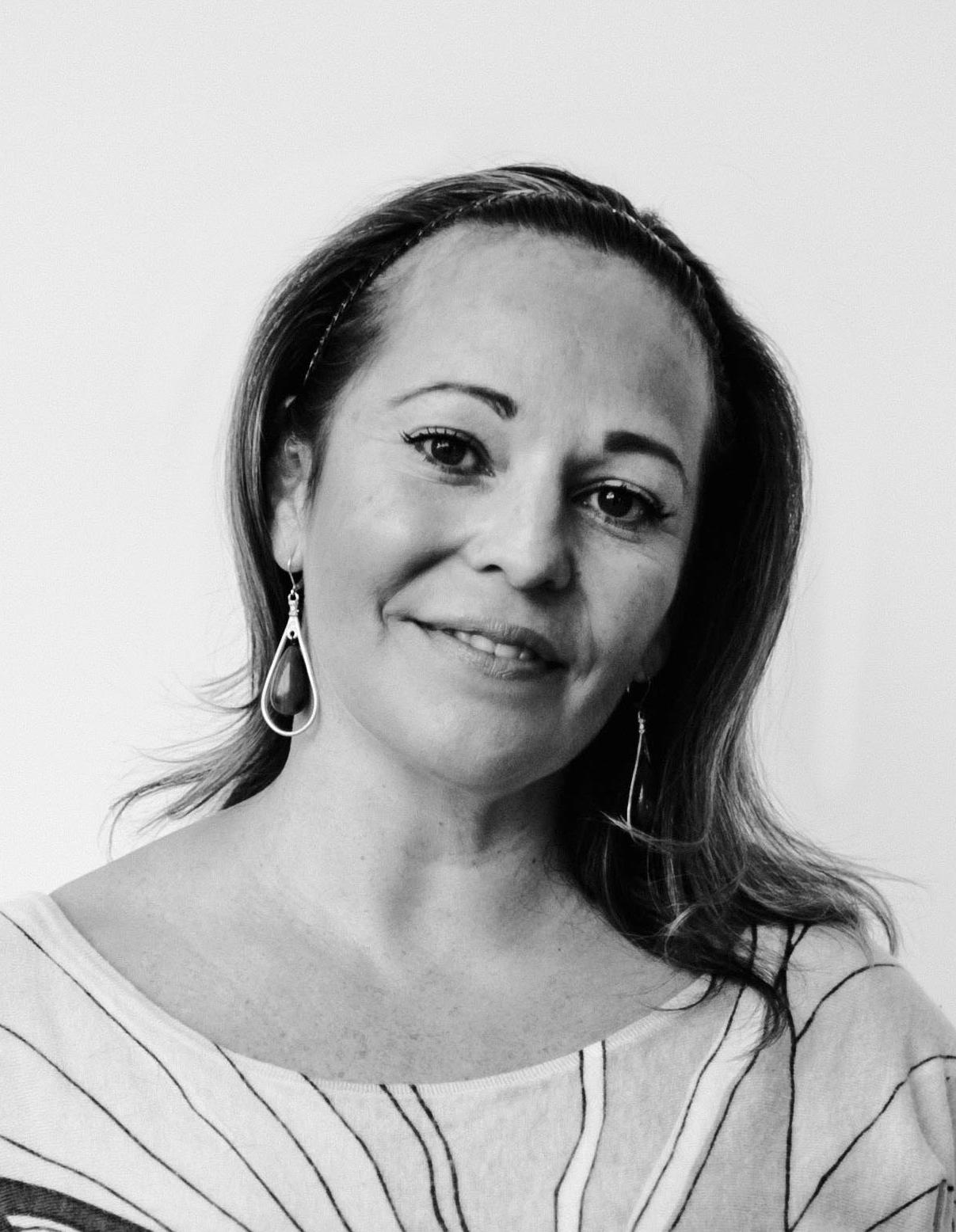
Modern Counsel 155 Shidume Lozada
Alica Del Valle Associate General Counsel and Inclusion, Diversity, Equity & Accountability Chair Airbnb
really feel and hope that I can weave into our organizational fabric an understanding and appreciation of the depth and significance of DEI.”
To that end, Del Valle approaches DEI qualitatively, in a way that foregrounds points of view, not numbers. She faces challenges, however, in shifting longstanding cultural outlooks. “There’s often some level of resistance when you’re having a conversation where you’re trying to expand someone’s perspective,” she says. “We’re only going to be able to make change happen if we’re able to perceive and appreciate another person’s journey without it necessarily placing an indictment on our own. That may sound easy, but it’s a very difficult thing to do in practice.”
Another challenge stems from the uncertainty associated with radical change. Del Valle is conscious of the risks in breaking from the status quo, but she believes in taking those risks nonetheless. Fortunately, Airbnb has proved particularly receptive to

this mindset. “I would not have taken this role but for the incredible leadership of our chief legal officer, Rich Baer, who has shown not only the propensity and desire to be committed to this space and to the work, but also the willingness to take some massive risks,” Del Valle says.
Del Valle consciously aligns herself with like-minded people and organizations both inside and outside Airbnb. Externally, she has begun serving as an advisor and board member for organizations that reflect her values and priorities. Furthermore, she has made a point of giving back financially in the wake of Airbnb’s IPO.
“It’s the constant choices you make and how you engage with it through all facets of your life,” she says of her broader DEI contributions. “For example, when I got engaged earlier this year, my fiancé and I were able to throw an engagement party, and we were very intentional in making sure that any vendor we used was either womenor minority-owned.”
“I’ve always fought to be seen and heard as a woman, as a Latina, as a person of color. And I would venture a guess that other people of color would agree that, for us, DEI work is generally not something you choose to do. It’s an integral part of your existence, of your very being.”
Focus: DEI 156
Unsurprisingly, Del Valle plans to continue living and working in accordance with her values moving forward. “It’s about choosing to be kind and empathetic and thoughtful, to see the best in people’s humanity, and to try to make people feel like they belong,” she says. “As long as Airbnb continues to be a company that wants to do the right thing and that aims to be better and do better, I want to continue to be a part of it.


“And I would love to put out an invitation to anybody who has the same type of passion and drive and desire,” she continues. “If you’re looking for people and organizations who are willing to push the boundaries, here we are.”



As she seeks to expand Airbnb’s network of partners, Del Valle is closer than ever to achieving the transformative change she has long envisioned.
For her success at Airbnb, her commitment to DEI, and her recognition by Modern Counsel
157
CONGRATULATES ALICA DEL VALLE
ENTERTAINMENT, MEDIA & THE ARTS • CORPORATE • REAL ESTATE • LITIGATION Los Angeles | New York www.eisnerlaw.com WWW.ROUSE.COM Award winning IP services, for the world’s leading brands
THE RESPECTFUL DISRUPTOR
Danyelle S.T. Wright tackles dual roles at the E.W. Scripps Company, putting the DEI lessons she’s learned from her own journey into practice
By Billy Yost
DANYELLE WRIGHT HAS KNOWN SHE wanted to be a lawyer since the fourth grade. That was the easy part. Her mother told her that given her penchant for putting up an argument, it was the perfect job for her. Wright’s mother, a cheerleader in every conceivable fashion, would pass away at just forty-seven years old, the day before Wright’s first law school final at the Ohio State University.
She didn’t get to live long enough to see Wright’s law career flourish; Wright had foregone a Georgetown offer to attend law school close to home, where she could take care of her mother and not place any strain on her younger sister, who was working to finish her own degree.
“My mother made me promise that I was going to finish no matter what,” Wright remembers. And despite her grandmother passing away a mere six months after her mother’s
death, Wright and her sister held each other up and made it through.
Wright now serves a dual role (or “The Comma Diva” as she likes to describe her lengthy titles) as vice president of employment and labor law and chief diversity officer at 143-year-old publishing and broadcast company the E.W. Scripps Company. She’s helping the organization continue to find new ways to retain, develop, and advance talent for those who have worked so hard to find their own success and just need a fair shot at it.
Understanding the Diverse Journey
Wright understands exactly what it takes for those who are not the beneficiaries of generational wealth to achieve success. She grew up in a single-parent household where finances were always tight. “I always knew that education

Focus: DEI 158
Danyelle S.T. Wright VP, Employment & Labor Law Chief Diversity Officer
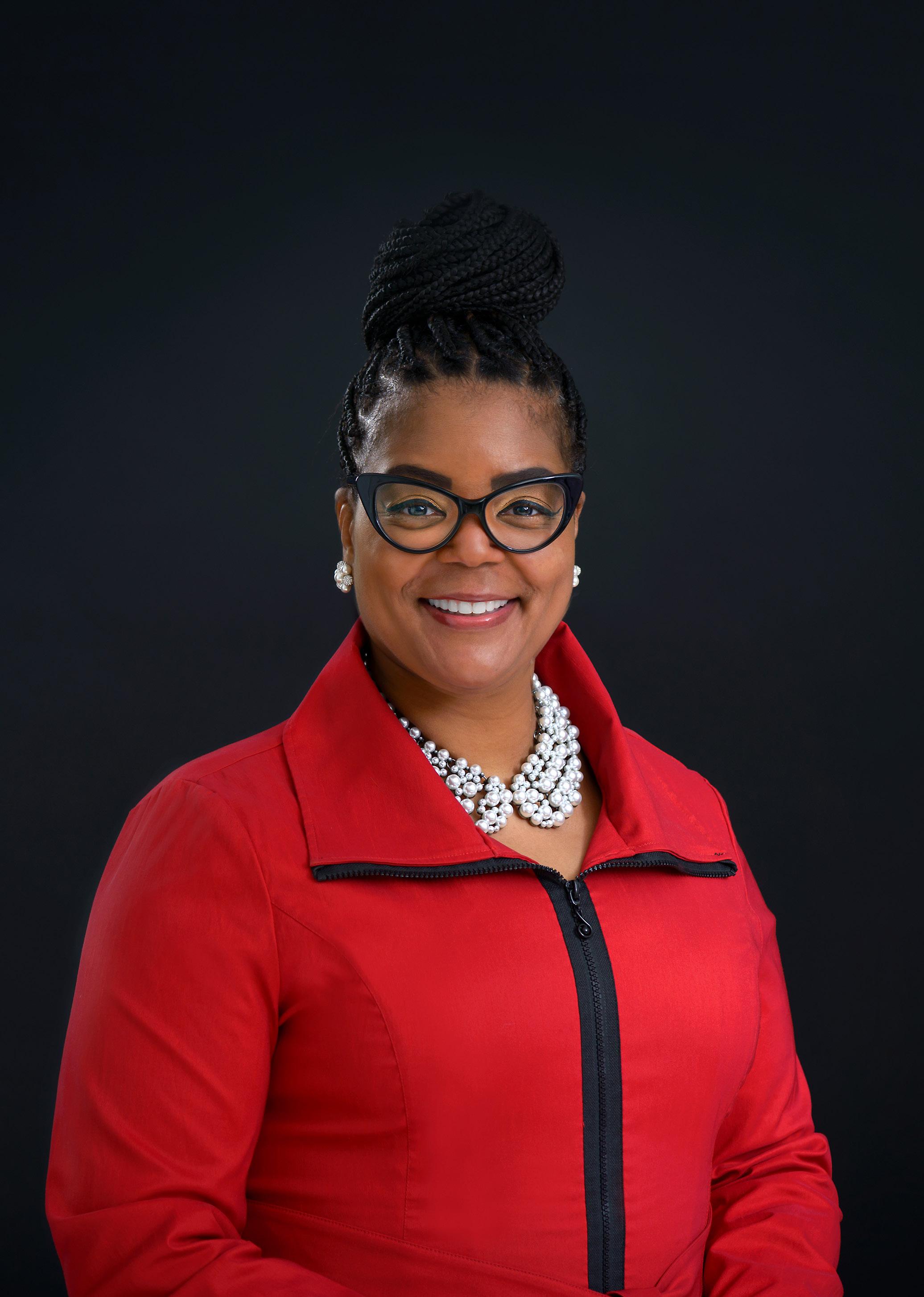

Modern Counsel 159 Peggy Joseph
The E.W. Scripps Company
was the key to get to where I wanted to go,” Wright explains. “It is something that cannot be taken away and yet, I also knew you couldn’t squeeze blood from a turnip.”

The young lawyer-to-be earned a scholarship to Northfield High School, a highly ranked school in rural Minnesota. Wright, an Ohio native, would attend with her mother’s blessing, knowing that it was the ideal first step in her own career.
Both at Northfield and Cornell University, Wright would find herself the lone Black woman in most circumstances.
“The experiences of this little African American girl were so unlike the experiences of those people that I ran track with or played softball with,” Wright explains. “There were all of these basic cultural differences that I try to keep in mind even today. I always try to assume positive intent. It’s something I keep on my whiteboard at work. Like Ted Lasso, I want to be curious but not judgmental. I want to know where you’re coming from so we can reach common ground.”
The Right Woman for the Jobs
Wright came to Scripps in 2015 after extensive work in the firm world. This body of work has included winning the Ohio State Bar Foundation Service Award for Attorneys 40 and Under, the Diversity & Inclusion Trailblazers award from the Taft firm, the Gracies Leadership Award from the Alliance for Women in Media, and a Cynopsis “Top Women in Media” award in 2021. Along with her extensive employment and labor work, Wright’s small but mighty team—two, including herself—has also built the diversity and inclusion strategy from the ground up. But she says it can’t be a one-person job or departmental function.
“If the success of our equity, diversity, and inclusion strategy is based on me showing up, then we fail,” Wright says bluntly. “We all have a collective responsibility to make this happen.”
Wright sees her role as a “respectful disruptor.” She’s built a sound partnership with the executive team at Scripps that allows her to keep pushing
“If the success of our equity, diversity, and inclusion strategy is based on me showing up, then we fail. We all have a collective responsibility to make this happen.”
Focus: DEI 160
forward while understanding the wider picture, a perspective that’s benefited by her dual role.
“You have to have a lot of courage in this role,” Wright admits. “My mantra is: ‘Say it, even if you’re afraid.’ We have to try things that may fail. We have to have conversations that may be uncomfortable. But if you have this seat at the table, you need to use your voice or you need to move out of the way.”
Courageous Conversations
Wright has helped build DEI awareness and education from several different perspectives at Scripps. The Welcome Table provides a means of introducing DEI initiatives and conversations to the broader Scripps workforce. Courageous Conversations was born from the racial unrest of 2020, holding town hall conversations where employees can speak freely about issues important to them. And the EDI Academy provides more intimate settings to discuss those issues as more of a discussion group.
“In all of these efforts, the important thing to remember is you can’t stop talking about them,” Wright says.
There are so many more initiatives, educational opportunities, and work that Wright has undertaken that there simply isn’t room for, but it’s an ideal time to return to the little girl who knew she wanted to be a lawyer.
It’s hard to imagine someone better equipped with the experience and empathy necessary to build out DEI progress in an organization with such deep roots. Wright’s own story is enough. The more ways we can help support fourth-graders with high aspirations, no matter where they come from, the better off we will all be.
BakerHostetler:

“Danyelle embodies the leadership wisdom of seeking first to understand before seeking to be understood. I and the BakerHostetler Labor & Employment team are most proud to work with Danyelle and our valued client Scripps.”
–David Holcombe, Partner





161 Congratulations
bakerlaw.com
We salute our client and friend
Danyelle
S. T. Wright, Vice President, Employment & Labor Law and Scripps’ Chief Diversity Officer, for her exceptional achievement and well-deserved recognition.
By Billy Yost
 Portraits by Terri Glanger
Rich Rosalez leverages his lifelong diversity efforts to push for equity and belonging at Samsung Electronics America and beyond
Portraits by Terri Glanger
Rich Rosalez leverages his lifelong diversity efforts to push for equity and belonging at Samsung Electronics America and beyond
Focus: DEI 162

163 Modern Counsel
Rich Rosalez VP of Litigation Samsung Electronics America
RICH ROSALEZ’S GRANDFATHER SOLD produce from his garden during retirement. It was a way for him to stay connected to his community, and Rosalez would help his grandfather. The vice president of litigation at Samsung Electronics America vividly remembers how upset he was when he was unable to start a lawnmower.
His grandfather walked over calmly and asked him how getting angry was going to solve any problem. It’s a conversation that’s stuck with Rosalez all these years later, and it’s made him a calming leader.
The attorney believes in dreaming big and hustling to get there. As a leader who believes in always bringing your best, Rosalez would rather not show up than bring his B-game. The VP employs sports metaphors at every turn, and it’s clear that his track and cross-country background continue to inform his approach to his work and to his leadership.
But Rosalez also knows that no amount of hustle can make up for fundamental inequalities in business and society at large. He has been a key advocate for diversity, equity, and inclusion (DEI) initiatives both at Samsung, as a cofounder and Executive Sponsor of the Hispanic and Latinx Employee Resource Group, and with organizations like the Hispanic National Bar Association.
Rosalez’s colleagues recognize both his excellence as an attorney and his dedication to DEI. “We’re privileged to help Rich and his team with complex litigation,” says Greenberg Traurig Vice-Chairman Richard Edlin.
“Rich is aggressive and strategic, working tirelessly for the best outcome,” adds Robert Herrington, cochair of Greenberg’s classactions practice.
“Throughout his life, Rich has been the first to accomplish many things in his family and community,” says Crowell & Moring partner Juan Arteaga. “But more importantly, he’s always made sure he’s not the last. He has continuously fought to not only keep doors open for others coming after but also kicked those doors off the hinges to ensure that the opportunities he’s been afforded remain open.”
Rosalez spoke with Modern Counsel on his passion for diversity, where he sees the progress of the movement both abroad and within Samsung, and his passion for giving back to his community.
I understand you have been involved in the diversity space for some time. What has that looked like for you?
As a student, my involvement started not long after I left home for MIT. I valued how diverse the student body was and there was so much to learn from others, their journeys, and different cultures and perspectives. I worked for the admissions office and served as a student representative and admissions intern because I wanted to open doors for others. My extensive coursework and my involvement in these activities resulted in an appointment as special assistant to the president for multiculturalism my senior year.
In law school, I founded a student organization whose goal was to improve diversity on campus, with a focus on faculty and initiatives such as hosting a program on the path to becoming a law professor.
I expanded the group’s definition of diversity and transformed it into an umbrella organization for all student affinity groups, which allowed us to gain broad support across the student body. I consistently followed up with the dean, and we experienced positive results. Years later, the law school and university adopted anti-racism initiatives similar to what I introduced more than twenty years ago.
Could you talk about your involvement with Unidos at Samsung as well as some of the other DEI initiatives you’ve helped spearhead?
Unidos is Samsung Electronic America’s Hispanic/ Latinx employee resource group, and I serve as an executive sponsor. I helped coordinate efforts and provide guidance during the launch, and I continue to lead, participate, and assist in any way I can to support the organization and the leadership team.
Our goals are to promote social and cultural awareness inside and outside of Samsung, foster

Focus: DEI 164
Expertise Spotlight
Greenberg Traurig’s team of six-hundredplus highly experienced litigators operates in sync worldwide via a unique global platform to assist clients wherever and whenever they need strategic representation.
Organized within numerous specialized practice areas, the firm’s litigators have the rare ability to bring a combination of subject matter, geographic, and forum expertise in all major jurisdictions in the United States and beyond to virtually any case.
With a culture of collaboration facilitating local, regional, national, and international coordinated litigation counsel, Greenberg Traurig litigators utilize superior technology systems to provide clients with cutting-edge strategies and services. The team, which includes highly experienced trial attorneys who handle more than a hundred trials and arbitrations every year, also has ninety former federal and state prosecutors.
Greenberg Traurig litigators’ legal talent has been recognized by many industry organizations, including Lex Machina, which has named Greenberg Traurig the number one law firm for US commercial litigation by cases filed since 2009. This comprises 1,200plus litigations in federal and state courts in thirty-nine jurisdictions throughout the nation, including every federal appeals court and the US Supreme Court.
At the same time, our vast trial experience enables us to resolve cases with creative and strategic alternatives when trial is not in
our clients’ best interest and upon the most favorable terms possible.
Providing sophisticated trial and settlement strategies, Greenberg Traurig's litigation practice has handled some of the most complex litigation matters in challenging jurisdictions worldwide. Whether clients face a single complex dispute or a portfolio of disputes, the firm has vast resources across numerous practices and industries to serve.
Greenberg Traurig’s wide-ranging litigation capabilities include:
• Antitrust litigation and competition regulation
• Appellate
• Arbitration and mediation
• Aviation
• Class action litigation
• Commercial litigation
• Construction law
• Corporate governance and compliance
• Delaware law and litigation
• e-discovery and e-retention
• Energy litigation
• Environmental and toxic tort litigation
• ERISA and employee benefits litigation
• Federal regulatory and administrative law
• Fiduciary litigation
• Financial services litigation
• Health emergency preparedness task force: Coronavirus Disease (COVID-19)
• Insurance and reinsurance litigation
• Intellectual property litigation
• International arbitration and litigation
• International trade
• Labor and employment
• Media and entertainment litigation
• Mergers and acquisitions litigation
• Pharmaceutical, medical device, and healthcare litigation

• Products liability and mass Torts
• Real estate litigation
• Securities litigation
• Trade secrets
• Trusts and estates litigation
• White-collar defense and special investigations
In these areas, Greenberg Traurig’s litigators are often sought in bet-the-company, bet-your-freedom, and bet-the-town cases. To address all litigation issues, we craft our client teams based on the industry, forum, and stage of litigation involved, matching our attorneys’ experience to each client's specific needs.
About Greenberg Traurig: Greenberg Traurig, LLP (GT) has approximately 2200 attorneys in forty locations in the United States, Latin America, Europe, Asia, and the Middle East. GT has been recognized for its philanthropic giving, diversity, and innovation, and is consistently among the largest firms in the U.S. on the Law360 400 and among the Top 20 on the Am Law Global 100. The firm is net carbon neutral with respect to its office energy usage and Mansfield Rule 3.0 certified. Web: gtlaw.com
Modern Counsel 165
“When it comes to giving back and helping others, I once heard someone say, ‘It isn’t do you have the time, but rather, how do you not have the time?’”
a sense of community, and empower employees so we can be more connected and better prepared to have successful careers. The group encourages mentoring and networking, and it serves as a platform to connect employees and members that did not exist previously. We aim to give back to the community at large.

We believe this all leads to employees who are more invested, happier, and have a better overall experience at the company, which makes it a win-win for the company and its employees. In terms of other DEI initiatives throughout my career, I helped found and lead an ERG for minority attorneys and allies at one law firm, and I served on the diversity committee at another.
All along the way, I have been heavily involved in recruiting and mentoring— especially among underrepresented groups—and I am very proud of the many people I have helped. I believe both of those are important to pipeline and pro -
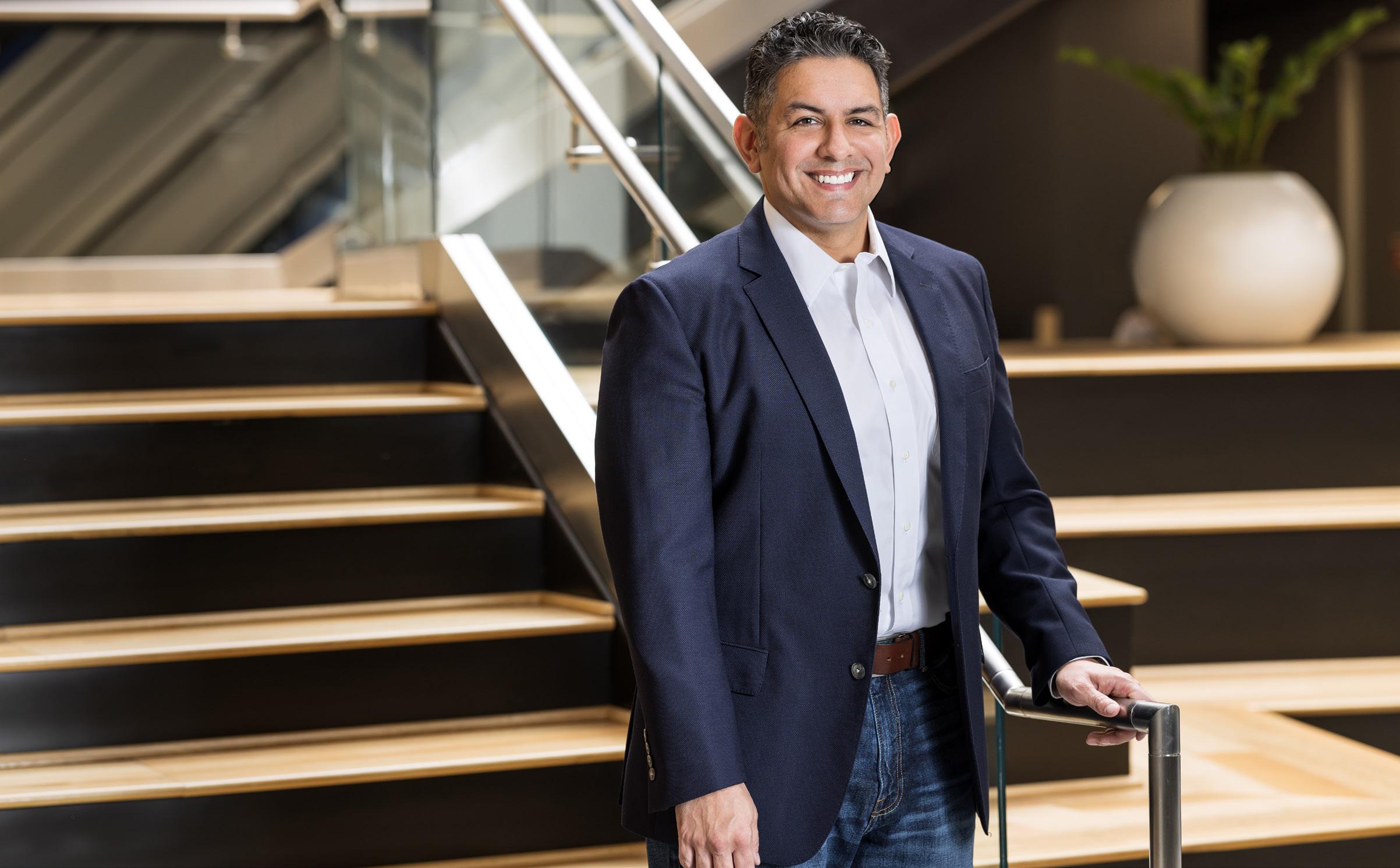
fessional development, and it is more difficult to succeed without the aid of others.
Currently, I serve as a Hispanic National Bar Association deputy regional president, and I am leading an effort to roll out a mentoring and networking program, which we believe is desperately needed given how the pandemic disrupted many of those initiatives and the benefits they would have provided. In Unidos, I have similarly introduced and led networking and mentoring initiatives.
What does your diversity experience tell you about the expanding DEI movement? What challenges still exist in the space?
It has been interesting to see diversity training programs and similar endeavors evolve over the years. I’ve been familiar with several programs that focused on diversity training, intersectionality, multiculturalism, implicit bias, and, more recently, DEI. There is an increasing amount
of academic research to support the work in these areas, which is helpful to educate about the realities of our society, the different lives people lead, and the issues of power, privilege, and marginalization.
Like many workplaces, we’ve made significant progress at Samsung in recent years. Now, we have numerous ERGs, open forums and discussions, DEI initiatives, training sessions, and concerted focus in our talent acquisition efforts, which were not yet around when I started.
Samsung has come a long way, but we have room for improvement. In the legal profession, I have seen numerous calls to action regarding DEI over the years—some glimmers of hope, little progress, and then the cycle repeats.
It has been very exciting to see the energy and effort that activists, ordinary citizens, nonprofits, and companies have put into DEI, and I hope it is more than a trend. The civil unrest of 2020 was a flashpoint for many, but for some
Focus: DEI 166
the tragedies were all too familiar. I truly hope we have experienced a collective paradigm shift and we will experience sustained change, which will require perseverance.
You seem to be a continually giving person, willing to reach out and help those others. Where do you find the time? What motivates those efforts? And what do you think this says about your own leadership?
When it comes to giving back and helping others, I once heard someone say, “It isn’t do you have the time, but rather, how do you not have the time?” That is a powerful statement. Of course, there are reasonable limits because you have to focus your energy where and when you can without overextending yourself. In terms of motivation to help others, it is simply the right thing to do.
I do not have to think long to consider how I have had great opportunities, and some of that results from the struggles of those who came before me. Being in the position I am in, I should do what I can to create and enable opportunities, help others, and ease the path of those who will follow.
Perhaps more than anything, I do it because I should. In every step of our respective journeys, we should look for ways to help others and go above and beyond. I am not sure what it says about my leadership, but I hope I lead by example, that I inspire others to follow me, to be willing to sacrifice, and help one another.
We congratulate our friend and client, Richard Rosalez, Vice President of Litigation, Samsung Electronics America, for his welldeserved recognition in Modern Counsel. We applaud his many accomplishments when it comes to promoting diversity, equity and inclusion in the legal profession.
Crowell & Moring is an international AmLaw 100 firm that represents clients in high-stakes litigation, sensitive government investigations, and transformational transactions. Our clients include many Fortune 500 companies and financial institutions. Our firm is consistently recognized as a leader with respect to pro bono work and diversity, equity and inclusion.
crowell.com
167
By Zach Baliva

IT WAS IN LATE NOVEMBER WHEN A COOL AUTUMN breeze hit Cathy Coppedge-Jinks as she walked into work at Aflac. A divorce had made the year a difficult one, and she wasn’t looking forward to spending Thanksgiving without her daughters. Aflac’s CEO, Dan Amos, was in the lobby and he asked about her holiday plans and invited her to his own family’s celebration after hearing about her plans—or lack thereof.
The following Thursday, Coppedge-Jinks found herself sharing a delicious holiday meal with CEO Dan Amos and his family. After supper, they spent the afternoon watching Georgia football as they laughed and she snacked on popcorn with Amos’s wife, Kathelen.
Coppedge-Jinks was very grateful to be included in the Amos family holiday supper and the experience fit congruently with the type of CEO and leader that Amos—or “Dan” as he is known to Aflac employees—is day in and day out. He has always been an in-the-know and caring CEO. For example, he and Aflac’s General Counsel, Audrey Boone
Cathy Coppedge-Jinks reflects on two decades at Aflac and shares why a strong corporate culture has made the insurance company her home
Focus: DEI 168
Tillman, went to the courthouse during a custody trial to offer Coppedge-Jinks their support, which she still finds remarkable.
Amos is a leader that embodies Aflac’s culture, and that culture has kept Coppedge-Jinks at the large and well-known supplemental insurance company for more than twenty years.
Before and during her time in law school, Coppedge-Jinks worked for other insurance companies and grew fond of the industry. After law school, she relocated to Columbus, Georgia, for her family. The move was a fortuitous one, as the southern city has been Aflac’s home since 1955.
“The city and insurance industry may have been what brought me to Aflac, but the culture is why I’ve stayed,” says Coppedge-Jinks, who started as staff attorney in 2000, took on progressive leadership roles, and now is an officer of the company.
The Aflac culture is one built on empathy, understanding, diversity, and an open-door management style. The supportive work environment and strong reputation have helped the company retain many long-tenured employees. Boone Tillman joined in 1996 and sat across the floor from CoppedgeJinks during Coppedge-Jinks’s first year with the company. Today, Boone Tillman is Aflac’s executive vice president and general counsel.
Over the years, Coppedge-Jinks has had many opportunities to forward the culture that’s been so instrumental to her own professional journey. After managing litigation and arbitration matters for Aflac and its affiliates, she was recognized for her ability to inspire teams and deliver outcomes by being asked to help promote internal employee engagement.
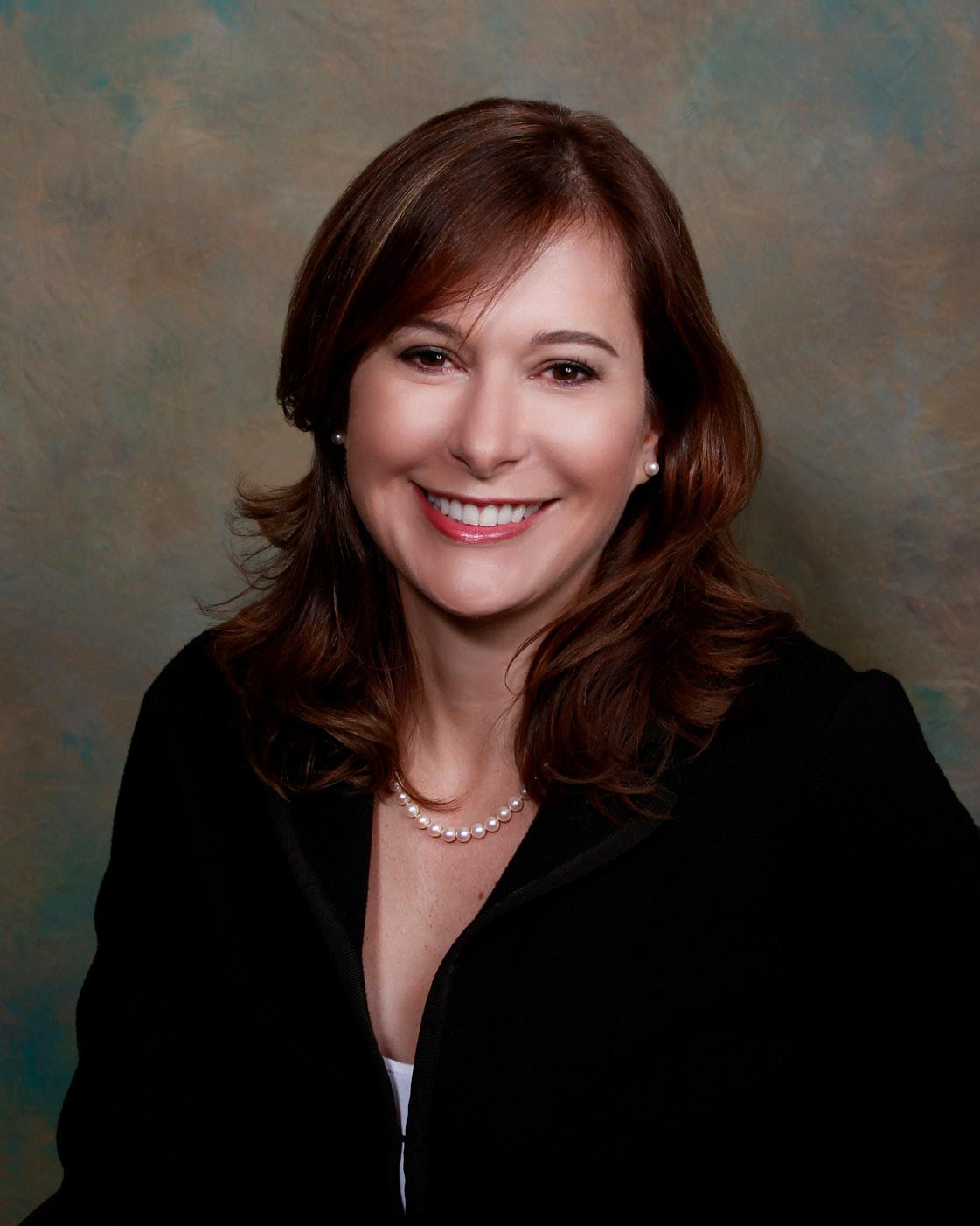
She accepted the assignment and became part of a small project group that designed and implemented a rewards and recognition program through which employees can earn special “Aflac duck feathers” for meeting certain performance benchmarks. More than ten years later, managers and employees alike are still using feathers to motivate and celebrate members of their teams.
As counsel for Aflac, Coppedge-Jinks runs the legal efforts for the Aflac Group benefits division and Aflac’s independent sales force. Additionally,
she’s leading the legal division’s increasing efforts to develop talent and elevate its diversity, equity, and inclusion (DEI) initiatives. Aflac, CoppedgeJinks says, has a strong foundation in these areas. Several members of the executive management team (including Boone Tillman) are women and ethnic minorities, and 64 percent of Aflac’s board members are women. In the workforce at large, 65 percent are women.
While the legal department has always mirrored these statistics, Coppedge-Jinks and her colleagues started to formalize the legal division’s DEI policies after the racially motivated social unrest of 2020. The team created a diversity statement and policy to act as legal’s “North Star.”
Next, the team introduced a tracking system requiring partner firms to answer diversity questions when they submit invoices. The team will compile this data and use it as a guide to make future informative decisions and prioritize firms

Modern Counsel 169 Columbus Bar Association
Cathy Coppedge-Jinks Counsel Aflac
that meet certain DEI metrics. “Addressing diversity and inclusion is a journey,” Coppedge-Jinks explains. “We are committed to doing good work and we recognize that it takes an ongoing approach to be successful.”
Other efforts are strengthening Aflac’s partnerships with its network of outside counsel. The team created a “continuing legal education” series through which subject-matter experts are invited to train her colleagues in niche and specialty areas. A similar internal lunch and learn program encourages younger employees to build mentoring relationships with their veteran counterparts. Coppedge-Jinks recently gave a brown-bag lecture on how COVID-19 is impacting Aflac’s in-bound and out-bound US employment needs and practices.
Aflac wants to invest in the best and brightest employees, and that starts with recruitment. The DEI team is therefore expanding an existing legal intern and extern program and recruiting students from more diverse colleges and universities.



“A more diverse talent pool helps bring diverse perspectives to our legal department. A diverse department will best serve both the business and our customers,” Coppedge-Jinks says. Participants rotate through the department and get a broad experience as they assist on research projects and learn about contracts, the Aflac sales force, HR, privacy, and other related matters.
Although COVID-19 took Aflac’s workforce remote, Coppedge-Jinks says its culture is stronger than ever before. “Everyone is encouraged and expected to bring themselves to offer meaningful contributions we wouldn’t otherwise have,” she says. “We’re living out the culture that comes from the very top.”
Like Dan Amos, Cathy Coppedge-Jinks is walking the walk at Aflac.






SMGQ Law:
“Congratulations Cathy Coppedge for this well-deserved recognition! We applaud your commitment to excellence, equality and diversity and your engagement of diverse counsel.”
–Emilia A. Quesada, Esq., Chair,
Insurance Practice Group
170


SMGQ Law applauds Cathy Coppedge and her commitment to diversity and inclusion at AFLAC. Cathy is a true champion for diversity! CERTIFIED MBE & NAMWOLF MEMBER FIRM EMILIA A. QUESADA, ESQ. CHAIR, INSURANCE PRACTICE GROUP 1200 BRICKELL AVENUE, SUITE 950 MIAMI, FL 33131 | TEL: 305.377.1000
DIGITAL DEVELOPMENT

After joining Mercury Insurance, Jill Warren reviewed all office processes and created a paperless system for the legal department that is helping the small insurance carrier thrive
By Zach Baliva
IT’S HARD TO APPRECIATE JUST HOW BIG THE STATE
of Texas is until you’ve had to drive between its major cities. Back and forth. Many times per week. Jill Warren pondered the expanse as she sat on the stretch of Highway 290 that covers part of the long route between Houston and downtown Austin. She knew the path well.
As one of just two attorneys covering the whole state for Mercury Insurance, she drove it often, and she knew there had to be a better way. So, she embarked on a journey to take her department paperless and find other ways to increase automation and efficiency.
Warren, a Texas native, received a bachelor’s degree from Texas A&M, an MBA from University of Houston, and a JD from South Texas College of Law Houston. She went on to specialize in equine law and went in-house at Allstate before coming to Mercury in 2017.
She made the transition in part because she was attracted to the smaller carrier’s customer service and commitment to its employees. “Mercury knows that if leaders take care of employees, they will be satisfied
Focus: DEI 172


Modern Counsel 173
Jill Warren Supervising Attorney Mercury Insurance
Chris Gillett
and performing well on the job,” she says. “Happy employees lead to happy customers.”
And, while Warren enjoyed the company and liked the culture, she found the legal department isolated and inefficient. Mercury agents sell insurance in eleven states, but employees in Texas—including those in the legal department—were operating on their own and had limited contact with the rest of the company. There was very little communication, which was also archaic. All of the legal files were paper files, which were stored in Austin.
Warren and the other attorney in her department of eight always had to return to their home office between every hearing or deposition. They spent countless hours on the road between Austin and Texas’s other major cities like Houston (165 miles), Dallas (195 miles), Brownsville (351 miles), Amarillo (527 miles), and El Paso (580 miles).
“After I was hired, I also presented a business case to add another lawyer to the group,” Warren says. “The drive time completely consumed my desk time, and I didn’t have any time to focus on managerial duties and relationships with staff.”
Warren wanted to eliminate redundancies and limit her department’s reliance on paper documents to reduce travel time. She initiated a review of all office processes and evaluated how every legal matter moved through the company. In doing so, she scrutinized every single detail and person involved at each step, from intake to settlement or trial.
Next, she opened job duties and descriptions for each position, not just in Texas, but in Mercury’s other locations. She wanted to understand if paralegals in Texas were doing the same tasks and using the same resources as paralegals in California, Florida, New York, and even at other insurance companies.

Then, she interviewed secretaries and paralegals at the same time. That part of the process yielded interesting results, as Warren quickly discovered some department employees were repeating each other’s work.
The biggest project by far was the transition to a paperless system. Warren wanted to digitize every company case in the state of Texas. She was five months pregnant, and set the start of her maternity leave as an ambitious deadline. “Modern legal departments can’t afford to operate using outdated systems because it slows everything down and impacts both performance and outcomes,” she says. It was a job that simply had to be done.
To accomplish the formidable task, Warren recruited volunteers from Mercury’s other departments and hired outside help. Her office staff trained non-legal people on how to name, save, organize, and store legal documents in a new electronic filing system. Additionally, legal partnered with IT to ensure internal servers could handle the new workloads and key personnel could access the right documents.
By the time Warren left for maternity leave four months later, the system was up and running and
“Modern legal departments can’t afford to operate using outdated systems because it slows everything down and impacts performance and outcomes.”
Focus: DEI 174
those in Mercury’s legal department were working full days without returning to the home office to dig up physical documents.
Today, the department is more efficient and agile. “We had to make these process improvements because they save time, money, and effort. The legal industry has lagged behind in adopting new technologies, but we have to keep pace with business,” Warren says.
With these steps in place, the department can pivot as needed. When the COVID-19 pandemic hit in early 2020, the legal team transitioned to a work-from-home model in just one afternoon and continued providing services the following day.
Although the main process improvement projects are complete, Warren is always looking for ways to move the department forward. She’s importing best practices related to diversity and inclusion and also participating in an executive litigation management program at Baylor University. The course focuses on a framework of “six rights” of the right way, plan, team, costs, tools, and results to help lead attorneys create effective litigation strategies and manage high-stakes dockets.
Thanks to broad vaccine rollouts, relaxed pandemic restrictions, and other factors, economies are starting to rebound and most insurers like Mercury expect demand for their products to grow in 2022. Those insurers, however, face new risks and challenges in a changing and uncertain world.

With the paperless system in place and other ongoing improvements underway, Warren and her team have Mercury Insurance well positioned to handle anything that comes its way.
Anderson & Truitt, PLLC is a mid sized civil litigation firm, with o ces in Houston, Dallas, and San Antonio, and attorneys in McAllen and North Carolina. We are committed to provided excellent legal representation and personalized legal services to those who find themselves in litigation in the States of Texas and North Carolina. Our attorneys have tried hundreds of cases throughout the state and will represent you or your insureds with pride.
175
www.andersontruitt.com INNOVATIVE TRIAL ATTORNEYS Specializing in Insurance Defense and Injury Litigation. QUALITY LEGAL SERVICES Experienced representation at a competitive rate.
AN INNOVATIVE APPROACH TO INCLUSION

Greta Katz uses the power of listening to inspire diversity initiatives as senior litigation and operations counsel at Public Storage
By Pamela Bloom
AT THE AGE OF SEVEN, GRETA KATZ KNEW SHE wanted to be a lawyer. A friend of her mother’s practiced family law and she wanted to be just like her. Katz explains that family law was one of the few areas of practice that women were steered toward in times past. However, her own career took a much different track.
Today, Katz is senior litigation and operations counsel at Public Storage, the country’s premier provider of storage units. With 2,700 properties across forty jurisdictions all undergoing a major rebrand, Katz has her hands full vetting client communications, advising human resources, supervising outside counsel, and responding to the company’s vast operational needs.
Katz came to Public Storage with significant litigation skills, prepped by Northeastern University’s
legal curriculum that combined classroom and professional experience, including an internship at the First Circuit U.S. Court of Appeals under Judge Bruce M. Selya.
Following graduation, her most influential mentor was Dana Fox, one of the country’s most successful catastrophic injury defense lawyers, who hired her at Lynberg & Watkins in Los Angeles then took her with him to Lewis Brisbois. “I learned to be fearless from Dana,” Katz says. “Essentially, he taught us there is practically no error in litigation that can’t be fixed. That gave us the freedom to try stuff and be creative.”
While Katz was litigating business disputes and personal injury cases at Lewis Brisbois, one of the firm’s clients, Public Storage, had a vacancy. Even though she had just made partner two
Focus: DEI 176
years before, she took a leap and never looked back.
Katz’s first focus at Public Storage was litigation. Seven years later, she now has become “very much a partner in the business,” she says. Fundamental to the business is Katz’s supervision of rental agreements.
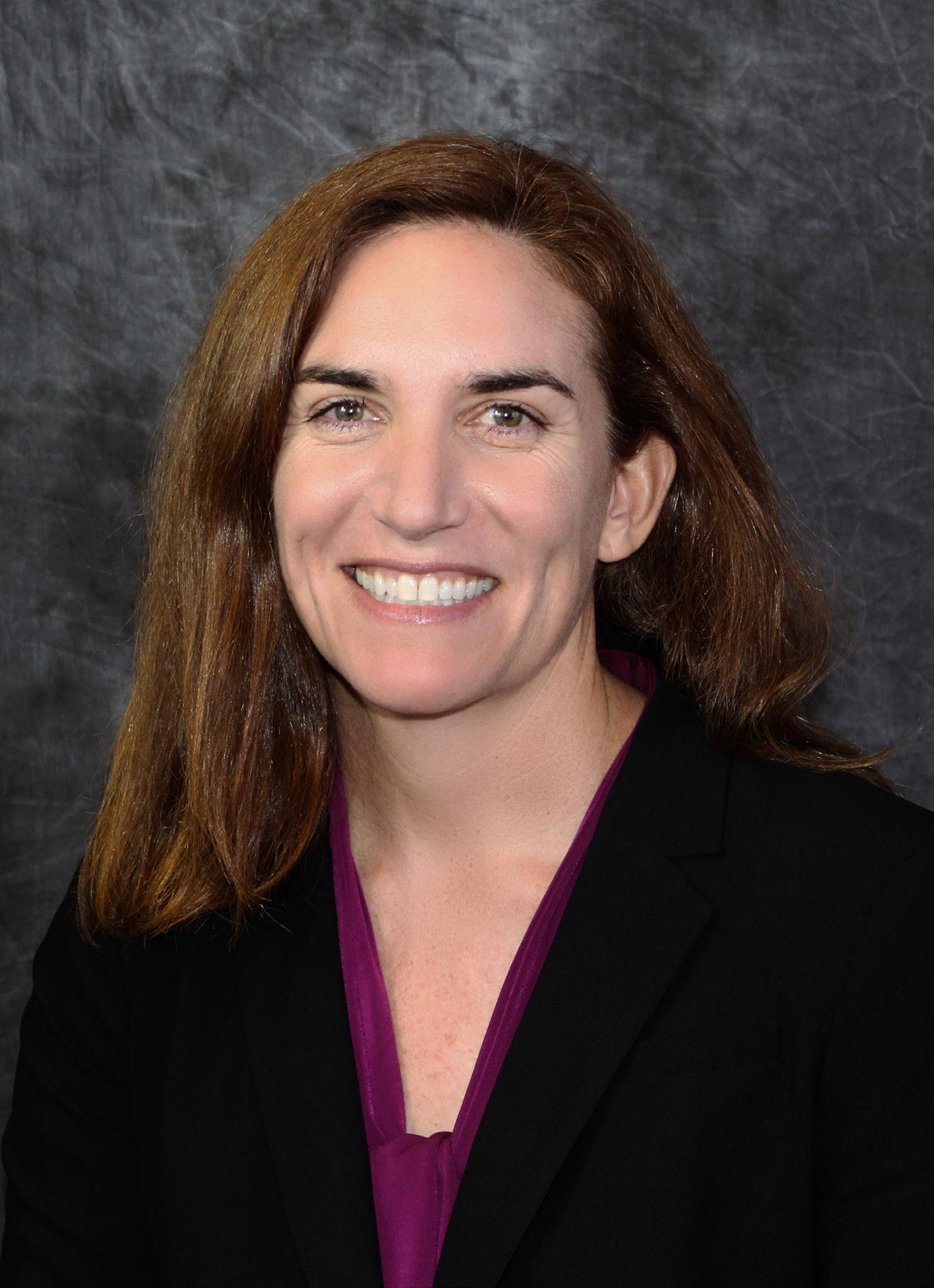
Every state that Public Storage operates in has its own self-service storage facility act which outlines the rules for getting back spaces from customers who have stopped paying. As a low-cost

business, Public Storage naturally wants to avoid the time and expense of going to court. Knowing and following the ever-evolving rules of each state facilitates this efficiency.
Today, a cocounsel and two paralegals make up Katz’s litigation and operations (L&O) group within the legal department— with a key difference. “At the moment, we are a majority minority department,” she says, explaining that nearly everyone in the legal department at Public Storage is either a woman and/or a person of color.
Guts and Smarts
Has Greta Katz ever experienced challenges as a female lawyer?
“All the time,” she says. “For example, walking into a room for a deposition and everyone assuming I am the court reporter. That happened often. I’ve also been called terrible names by opposing counsel on the phone and even during depositions. I think that sometimes comes with the territory. I just let it wash over me.”
For Katz, the superpower in litigation is knowledge. While in law school, she memorized the rules of procedure as she rode the train back and forth to school. “Law is like a chess game,” she says. “Know the rules better than your opponent and you’re sure to do better.”
Modern Counsel 177
Greta Katz Senior Litigation & Operations Counsel Public Storage
Alex Rodriquez
“We are super productive and get great results for our client.

“My own approach as a manager is that my team’s opinions and ideas matter,” she continues. “We all have different backgrounds and very different perspectives, and I try to make everyone feel heard.”
Katz leads monthly meetings with the L&O group to talk through issues. “We are always strategizing how our small group can best serve the big body of people who reach out to us.”
Given its diverse clientele, Public Storage is ramping up its diversity, equity, and inclusion initiative, now spearheaded by Katz. The initiative aims to ensure that outside counsel reflects the same values. Katz is taking the first step by “taking a snapshot” of who is doing their legal work around the country and informing them that the company wants a diverse group of people working on its cases.
“Diversity is the only way to step out of yourself and be innovative,” Katz explains. “We know this because it has already benefited us so much. We want the best results; we feel we will get there if we get to choose our lawyers from the most diverse pool possible. We want the best lawyers at the firms we work with to get opportunities to work on our cases.”
Public Storage has already seen a difference. A number of employees have been at the company for more than thirty
years—one of Katz’s paralegals is about to celebrate her thirty-fifth year. Public Storage also won three awards from the career site Comparably: Best Company Outlook, Best Operations Teams, and Best Workplaces Los Angeles.
“I think one of the most important things in life is to listen,” Katz says, adding that recently becoming a mother has made her more empathetic. Katz and her wife welcomed a baby in 2020 during the COVID-19 pandemic. Caring for an infant while simultaneously working from home taught her a lot.
“Listening is key,” she explains. “When I interact with employees and, sometimes, customers, you can imagine, nothing happy is happening. But I find that if I meet the most outraged customer as a human being and not as an automaton, they will respond very well.”
She recalls a recent interaction with a customer who was “just raring” for a fight. “But I listened to him, I addressed his concerns. Everything he was saying was correct, so I was not afraid to say, ‘I understand what you’re saying.’ I think that really defuses a situation.”
Uncommon words for a litigator, but it’s a welcome tactic that creates better business.
Editor’s note: At the beginning of 2022, Greta Katz was promoted assistant general counsel for litigation and operations at Public Storage.

“Diversity is the only way to step out of yourself and be innovative. We know because it has already benefited us so much.”
178
By Pamela Bloom

THE ROAD TO BECOMING AN AEROSPACE LAWYER wasn’t easy for Allison Nold. In one of her first internships, she was told she was too pretty to be a lawyer and should be home making cookies. But today, as assistant general counsel of litigation at Collins Aerospace, she’s breaking glass ceilings—not just for herself, but for other women.
A physician’s daughter, Nold headed to college wanting to be a veterinarian, but an internship at a solicitor’s firm in London redirected her passion to law. When she discovered her affinity for “moral advocacy,” she felt like a runner whose body was built for marathons. She chose the University of Miami School of Law for its litigation-heavy curriculum. A clerkship at the state attorney’s office cemented her direction.
Nold got her first full-time job at Cozen O’Connor through her disarming honesty. During the interview, she admitted that she wasn’t number one or two in her class, but she was every bit as good and would work just as hard. Later, her supervisors would tell her they had never heard such an honest response.
At Collins Aerospace, Allison Nold honors the mentors who helped her overcome sexism to become one of the industry’s top litigators
Modern Counsel 179
Taming Stress

The day before one Mother’s Day, Allison Nold was awake at 4:00 a.m., preparing an urgent arbitration demand. But that didn’t faze her—she was already up breastfeeding.
How does the mother of two destress? The answer lies in her hands, taped up and covered in paint. “One of my favorite things to do is to take something and make it look different,” Nold says. “Whether it’s moving plants in the backyard, cleaning, or painting my bathroom late at night, I just like to make change and be part of it.”
 Allison Nold
Allison Nold
Focus: DEI 180
Assistant General Counsel, Litigation Collins Aerospace
Courtesy of Allison Nold
Nold’s first case involved the devastating 2007 crash of a TAM Airlines flight that skidded off the runway in São Paulo, killing all onboard, including twelve bystanders. The case ended up staying in the US for two years before being refiled in Brazil, and Nold, as junior associate, seized the opportunity to learn everything she could.
Whenever the managing counsel visited the client, the defending engine manufacturer, he took Nold with him. One technical expert called her the most promising aviation lawyer he’d ever met. “My managing counsel gave me the opportunity not just to be present but to find my voice,” Nold says.
At the time, being a woman in aerospace law demanded serious sidestepping. Nold remembers male-centric socializing. But the managing partner, Rick Dunn, became her best mentor and ally. “He was always there for me, cracking doors open, even prompting conversations at dinner to include me.”
Nold’s next job—at a law firm in Chicago—was the exact opposite. Thrust into product liability and insurance defense, she proceeded without any supervision. Nevertheless, she excelled as a trial lawyer, individually handling administrative hearings like one regarding seven police officers charged with illegal search and seizure and serving as lead associate in a six-week trade secret trial.
In 2005, the French-based Airbus invited her to cross the pond to lead common law litigation. Although she

“hadn’t spoken a lick of French” since college, her biggest challenge wasn’t the language barrier. Nold’s husband is a lawyer too. “Relocating us to France meant diverting his career.”
That wasn’t the only challenge. When her litigation department was restructured with a new head, Nold was effectively demoted—one week after starting maternity leave. It was infuriating, she says, but she did what she does best: she dug in. Two years later, she was leading the team.
Eventually, Collins Aerospace called her back to the US with a tailor-made position. Two weeks later, she learned she was pregnant again—and scheduled to start working six weeks before her due date. But her general counsel surprised her with the words she claims she’d been waiting her whole life to hear: “Family is so important. Three months is a blip. Do what you can, then come back. We see you having a long career here.”
Today, Nold is thriving at Collins. In a given week, she might oversee an accident investigation, regulatory issues, or need to assess liability under a commercial contract. Whatever is on her plate, she finds the experts, builds the teams, and drives the strategy.
When Collins went into lockdown three weeks after Nold returned from maternity leave, she couldn’t build relationships in person or fly around to sites. Instead, she burned up the phone lines, getting advice and making connections wherever she could.
Modern Counsel 181
“My managing counsel gave me the opportunity not just to be present but to find my voice.”
“More so than any other place I’ve ever worked, there is such a great sense of teamwork at Collins,” Nold says. “And it’s true; tone filters down from the top.”

Nold claims the mentors who most impacted her career prepared her for her next step. “It wasn’t about making me look good in the moment or even supporting them,” she says. “They knew they were visible, and I wasn’t yet. One even said, ‘don’t hitch your stars to mine; get to know everyone and drive your own leadership.’”
Nold has passed on that advice, hiring several female lawyers and encouraging others to recognize their worth. When associates have done the background work, she gives them a voice at the table. She has late-night phone meetings with some of the firm’s best lawyers, who just happen to also be young mothers.
“I believe being a mother can make you a stronger lawyer,” Nold says, though she admits that “having it all” will take some redefining. Her husband’s career is still recovering from her many relocations. She also wants to advocate for women in law who are judged for not having children. “Everywhere, there are still some significant glass ceilings.”
Those kinds of challenges spur Nold ever onward. With her far-reaching expertise, deft management style, and sensitivity to mentorship, it seems Nold will always be at the forefront of shattering preconceived notions about women at work.
NEW YORK CALIFORNIA NEW JERSEY CONNECTICUT ILLINOIS fitzhunt.com
Serving as trusted advisors to product manufacturers, service providers, and worldwide insurance markets.
182
“I believe being a mother can make you a stronger lawyer.”
Evaluate
A look at the logistical challenges, evolving regulations, industry shifts, and cultural concerns outside the office that lawyers must analyze and navigate to manage their impact inside the office
The Problem-Solver
By Peter Fabris
THE BEST WAY
TO DESCRIBE JAMES
Pickel’s role with private equity firm
Lindsay Goldberg is “creative thinker and problem-solver.” As counsel and chief compliance officer, Pickel oversees legal functions, but due to the nature of the business, his responsibilities cross the boundaries of a typical corporate counsel’s domain.
Lindsay Goldberg’s model is rare, if not unique, in the private equity sphere—itself a singular business form. The firm focuses on investing in family-owned and founderled businesses and helping them reach their next level of growth. This strategy demands a flexible approach to dealmaking and management.
Lindsay Goldberg invests in companies across a variety of industries, and each company has a unique history, culture, and set of needs. Every investment is approached individually; pulling template agreements off the shelf and filling in the blanks is not an option. As stewards of growing businesses in partnership with families and founders, Lindsay Goldberg
must also guide portfolio companies during its ownership tenure, when any number of legal issues can arise. For Pickel, these factors mean every day is different. Versatility in approaching and executing investments, along with a wide variety of legal matters, is a must.
“You have to be humble when you don’t know something,” Pickel says. “You have to know who to turn to for expert advice and be willing to constantly learn from the best.” His role at Lindsay Goldberg has also required him to adjust his mindset. “My last position was more transactionally focused,” he says. “When you have that focus, you are more concerned with what is going on day-to-day.” Assuming a generalist role, he says, has made him strategize and plan for the next five to ten years as well as oversee current projects.
Pickel’s key responsibility during negotiations to invest in a company is to translate the aims of the transaction team to the outside counsel that performs due diligence and helps craft the terms of the
At private equity firm Lindsay Goldberg, James Pickel is constantly in creative thinking mode so that he can be versatile in his approach to his work
Evaluate 184
contract. “It’s critical to make sure the deal professionals and the law firms are not talking past each other,” he says. Part of that process is to make clear to outside counsel how the in-house investment, finance, and tax professionals envision the deal, and how they expect to help the acquired firm grow.
Pickel engages with five to ten law firms a year with different areas of expertise, including labor relations, government contracting, intellectual property, and environmental regulation. “We select firms that are expert in a particular area,” he says. “Sometimes you need to have several firms weigh in on a specific transaction.” In addition to legal acumen, Pickel prizes candor and commercial skill—meaning an understanding of how to efficiently spend time and resources—from outside counsel.
 James Pickel Counsel and Chief Compliance Officer Lindsay Goldberg
Courtesy of Lindsay Goldberg
James Pickel Counsel and Chief Compliance Officer Lindsay Goldberg
Courtesy of Lindsay Goldberg
Modern Counsel 185
“You have to be humble when you don’t know something. You have to know who to turn to for expert advice and be willing to constantly learn from the best.”
When Lindsay Goldberg invests in a company, the firm works closely with the company’s senior leadership to help execute a growth strategy. Successful family-owned and founder-led businesses often have exceptionally strong brands and reputations. As such, they are ripe for working with an institutional private equity partner to help scale and grow their business; the know-how to start and build a business can be different than the skills needed to substantially scale it up.

Frequently, Lindsay Goldberg will fuel growth in its portfolio companies via follow-on acquisitions, Pickel says. That typically entails providing advice on how to get a deal done, negotiating the acquisition, securing financing, and working through integration challenges.
The growth strategy is carefully tailored to each company. “Not every portfolio company has the same path for growth, due to the nature of the businesses and the markets and industries in which they operate,” Pickel says. For example, some can significantly boost earnings by integrating better supply chain management technology into their business. Lindsay Goldberg’s specialists identify those opportunities and help portfolio firms implement them. The legal team advises on these strategies where needed.
As Pickel looks out to the next decade, he expects to continue to devote significant time to ESG (environmental, social, and governance) and related matters, which are important to both Lindsay Goldberg as well as to the families and founders with whom Lindsay Goldberg partners. Information technology, he says, will also continue to be a key area of focus, as opportunities to do more with software and systems are ever evolving.
It’s yet another area for Pickel to investigate, and another challenge for his legal team and network of in-house specialists and outside counsel advisors. But for Pickel, the variety of complex topics that demand his attention is a source of professional motivation, more of a draw than a deterrent.
Weil, Gotshal & Manges LLP weil.com
Weil is proud to partner with James Pickel and the rest of the Lindsay Goldberg Legal team and congratulates him on this well-deserved recognition
186
A New Era in Payments
As Visa’s first regulatory lawyer, Ky Tran-Trong helps build innovative financial products from the ground up
By Donald Liebenson
187 Modern Counsel
THIS IS NOT YOUR PARENTS’ VISA, AND Ky
Tran-Trong has played a pivotal role in guiding the sixty-three-year-old financial services company beyond credit, debit, and prepaid cards to staking its place at the forefront of electronic payments with innovative consumer products and services.
This was not the path his family had in mind, Tran-Trong says with a laugh. His mother was a chemist in France when she met his father, who was studying to be a doctor. “As an Asian kid, the assumption was that I would someday join the medical
he worked on consumer financial services laws. During this time, he served as the regulatory team leader on consumer financial deposit and payment systems laws, including the Electronic Fund Transfer Act and the Truth in Savings Act. In this role, he led rulemakings implementing new consumer protections for prepaid cards as well as consumer credit card rights. He also worked on consumer financial privacy and credit reporting issues.
Tran-Trong compares policymaking and regulatory work to solving a puzzle. “You
field,” he says. “But I was drawn to the liberal arts when I attended Duke University. I took classes in politics and economics and decided I wanted to pursue a policymaking role.”
Law school entered the picture on the advice of a prelaw advisor. “He told me that there was nothing better than law school to prepare me for working after I finished my studies,” Tran-Trong says. “He told me that, even if I wanted to pursue a career in something other than law, the analytical and communication skills I would learn would be great preparation.”
Prior to joining Visa in 2011, TranTrong clerked for a year for the DC Court of Appeals, after which he went to work for the federal government. Over the next decade, he was an attorney in the regulations section in the Federal Reserve Board’s Division of Consumer and Community Affairs, where
have to balance the interests of a wide range of stakeholders to achieve your objectives.”
He was excited to join Visa as its first regulatory lawyer. In this role, he has not only managed Visa’s relationships with key federal agencies but has also had the opportunity to shape the role.
For instance, Tran-Trong has focused on getting engaged on the product side, “rolling up my sleeves and working with the product team and across the organization to bring the vision of new products to market,” he says. “I still get excited when I turn on the television and see Visa commercials for products that consumers trust and know that I had a hand in helping to build them from the ground up.”
“It’s been a privilege working with Ky over the years, from his time at the Federal Reserve to most recently at Visa on the Currencycloud transaction,” says Donald J. Mosher, partner
“I get excited when I turn on the television and see Visa commercials for products that consumers trust and know that I had a hand in helping to build them from the ground up.”
Evaluate 188
Ky Tran-Trong VP and Associate General Counsel, Regulatory Affairs Visa
and chair of the bank regulatory group at Schulte Roth & Zabel. “Ky has seen the evolution of payments firsthand. He is a problem-solver, is detail oriented, and never loses sight of the big picture.”
Over the past decade, as Visa’s vice president and associate general counsel of regulatory affairs, Tran-Trong has been instrumental in developing and introducing a wide range of new products and services, helping the company better serve consumers, businesses, and
financial institutions. This is in addition to his primary role supporting the company’s relationships with regulators and policymakers “to help them understand and better appreciate how electronic payments keep the economy running and to build trust in our products,” he says.
Additionally, this is “a new era in payments,” Tran-Trong observes. Visa is exploring tomorrow’s payment flows, such as cryptocurrencies and central bank digital currencies, and the emerging “Buy Now, Pay Later” (BNPL) space, where Visa is working with banks and credit unions to give their credit card customers more flexibility in how they pay for their purchases. For example, BNPL options can allow cardholders to pay for a $1,000 TV in four equal installments rather than all at once, allowing them more options on how they manage their spending.
The company is also looking to make business-to-business payments more efficient. For this initiative, Tran-Trong helped craft the operating rules and requirements for Visa B2B Connect, a new cross-border, business-to-business, high-dollar payment service that Visa has launched across one hundred different countries..
“This has been an extraordinarily rewarding project,” he says. “It has been a lot of work coordinating with a truly global set of stakeholders, but also a terrific opportunity. You come to realize how global a company Visa is and how much of a positive impact we can have. It’s also exciting to work with brilliant banking lawyers from around the world.”
Tran-Trong leads a team of four people. He cites lessons learned from mentors as influences on his own leadership style. His first mentor, he says,
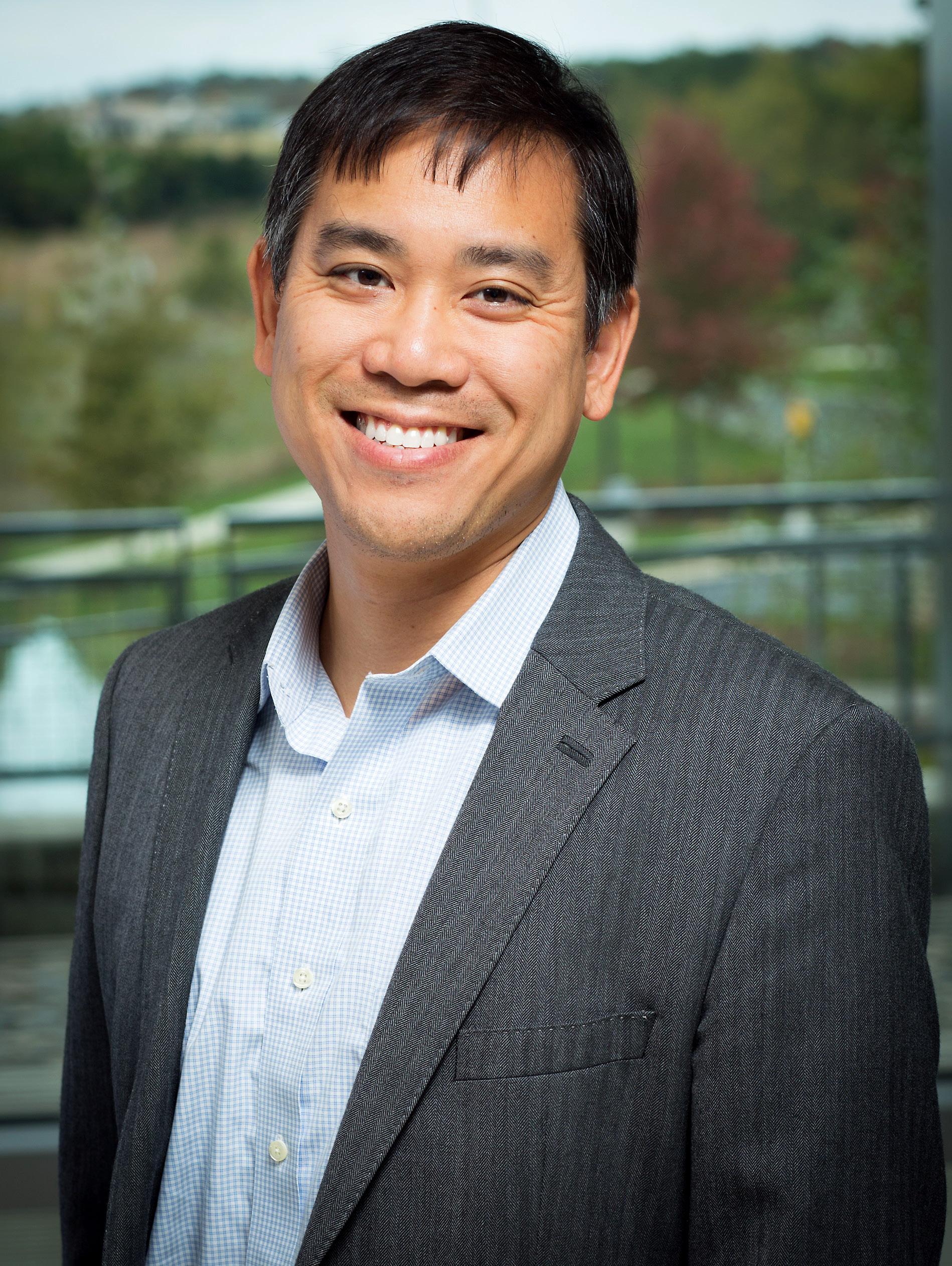
Courtesy of Visa
Modern Counsel 189
was Judge Vanessa Ruiz, a senior judge on the District of Columbia’s highest court. He clerked for her following law school. “From her, I gained an appreciation for the law, [the fact] that there is no issue too small to matter, and that everyone deserves to be equally protected,” he says.
Another influence on his leadership style is Visa General Counsel Julie Rottenberg, who hired Tran-Trong. “This was my first corporate job after more than a decade of government service,” he reflects. “From her, I learned the importance of always actively supporting and advocating for my team and really placing an emphasis on collaboration. She also modeled for me her deep commitment to developing a diverse and inclusive team.”
According to Tran-Trong, both public service and the corporate environment present unique challenges, and unique rewards. “Regulators are driven by important policy goals, but they’re not as close to the product or the business realities of meeting the immediate needs of clients and consumers—especially during an inflection point like the COVID-19 pandemic,” he notes. “On the other hand,

190
regulators can really focus on the big picture, and it’s incredibly inspiring to be directly involved in public service, working for the greater good.”
Rick Fischer, a partner at Morrison & Foerster LLP, attests that Tran-Trong is in the right place. “Ky is an exceptionally talented lawyer with the intelligence and experience to enable him to think strategically and ‘outside the box,’ which makes him the perfect regulatory advisor for an innovative company like Visa,” Fischer says.
Tran-Trong has been married for eighteen years. He met his wife when they were both clerks at the District of Columbia Court of Appeals. They were married at the courthouse by the judges for whom they were clerking. They have a fourteen-year-old daughter who is “a big fan of live theater,” he says. Family nights often involve board games.
In reflecting on his time at Visa, Tran-Trong also looks to the future. “Our mission is to be a network working for everyone as we emerge from the pandemic,” he says. “It’s an opportunity and an honor. I like to think the work I do benefits consumers and businesses every day.”
191 Schulte Roth & Zabel joins Modern Counsel in recognizing the accomplishments of Ky Tran-Trong Schulte Roth & Zabel LLP New York | Washington DC | London www.srz.com The contents of these materials may constitute attorney advertising under the regulations of various jurisdictions.
The Patent White Knight
As chief intellectual property officer at Acacia Research, Marc Booth believes good inventions need good patents and better government support
By Pamela Bloom
MARC BOOTH IS NOT A LAWYER, BUT after fifteen years of what he calls “hardwired, on-the-job training,” he knows enough about patent law to be “dangerous.” Today, the chief intellectual property officer at Acacia Research and his team have become experts in determining whether a patent is worth acquiring, licensing, or litigating.
Booth never imagined he’d end up parsing patents. A hands-on kind of guy, he parlayed a BS in physics and a master’s in electrical engineering into designing circuit boards and software at Hughes Aircraft but was soon kicked up to management. Eight years at Sony, plus stints at hardware and software start-ups, honed his
ability to manage a product’s story from idea to development to quality assurance.
When Booth was invited to join Acacia in 2006, he knew nothing about patents. In fact, he thought “nothing could be more boring.” But he quickly changed his mind when he bought some patent law books and saw how companies could leverage tech knowledge. At the time, Acacia was already doing quite a few licensing deals without litigation (i.e.,”soft licenses”), but the threat of declaratory judgments loomed. As Acacia grew as a public company, pressure for higher revenues increased. After the Leahy–Smith America Invents Act (AIA) passed in 2011, it became much more difficult to litigate the patents in Acacia’s
Evaluate 192

5th Avenue Digital Photography
193 Modern Counsel
Marc Booth Chief Intellectual Property Officer Acacia Research Corporation
portfolios, and one expensive portfolio cratered. In 2015, Acacia’s CEO resigned, and in 2017, Booth left for a year. After a board shake-up in 2018, the company brought Booth back to run the IP group.
Today, Booth and his team license existing portfolios and acquire new patents, with a focus on consumer electronics, telecommunications, semiconductors, and, occasionally, industrial automation. Acacia receives hundreds of interested patent partners a year; it also actively seeks out partners. Deals can range from straight partnerships to licensing contracts in the multi-eight figures. (The average is around single-digit millions.) Some patent owners want to sell outright to remain anonymous; others don’t want to be hassled by litigation. Some simply want to partner and share in the back-end proceeds.
“While Marc is an excellent manager and team motivator, he also has the technical chops to roll up his sleeves and dig into even the most complex patents, which gives him tremendous credibility in licensing negotiations,” says Jeff Bragalone, a shareholder at Bragalone Olejko Saad.
Booth explains how Acacia’s work differs from that of patent lawyers. “A patent lawyer is mostly interested in what is claimed and its quality,” Booth says. “Of course, we’re interested in that as well. But what makes a patent portfolio more interesting and easier to license is the story behind the invention. Who developed it? What problems were they trying to solve? Were they part of an R& D group in a race to solve a particular problem? Simply, are they pioneers?”
194 Evaluate
“The reason litigation happens is because patent owners have high expectations and those who owe them royalties want to pay as little as possible.”
Booth readily admits that most patent owners do not have licensable patents. Since the cost of licensing and litigation, which Acacia absorbs with the help of outside counsel, is so expensive, the recoveries must justify the effort. Also problematic are poorly written patent claims. Most problems, though, boil down to patent quality and market size. “If somebody comes in with an interesting invention that will only generate $100,000 in royalties, it’s not worth taking on because it may cost a million or two to prevail at litigation.”
Booth is discreet about past portfolios but admits the company is excited these days to license the patents from Korean-owned Newracom, the fifth-largest standard essential patent portfolio in the Wi-Fi 6 space (behind Qualcomm, Huawei, Intel, and LG). They are approaching their first deal and have already filed three lawsuits.


According to Booth, one of the biggest problems with the patent industry lies in the government. The US Patent Office budgets only a certain amount of time to examine each patent, so it doesn’t perform thorough examinations. As a result, a lot of bad patents get issued. Unfortunately, owners think they have a valuable patent, only to get clobbered later in litigation and lose it.
But Booth also notes the irony here. Another department of the Patent Office— the Patent Trial and Appeal Board (PTAB)— takes pains to investigate challenged patents rigorously at the request of the defendant and often invalidates them. On top of that, the Patent Office is incentivized to continue to grant patents because they generate revenue through maintenance fees. “That just seems so wrong to me,” Booth says. “But I think we

is proud to support
195
Marc Booth and thanks him for being a strategic thinker and a valuable partner to his licensees.
www.susmangodfrey.com
Nelson Bumgardner Conroy PC is a boutique trial and appellate law firm you can depend on to handle your most important legal issues.
We are your team for all types of litigation at trial and on appeal, including patent enforcement or defense, inter parties review, complex commercial and technology-based disputes, employment, bad faith insurance, and oil & gas litigation.



We are a boutique trial law firm that focuses on high-stakes intellectual property matters, business disputes, and whistleblower litigation. Our significant experience in federal and state courts and agencies across the country makes us a preferred partner of companies like Acacia.
can all agree that if bad patents weren’t issued to begin with, we wouldn’t have the problem.”
To counteract some of these challenges, Acacia has recently initiated a special program for start-ups that lack the resources to hire high-priced law firms. With an eye for legitimate invention, Booth’s team can spot issues before they end up in litigation. To alleviate the initial financial burden, Acacia offers to take any future patents to market via right of first refusal. Another option is equity in the start-up. “Either way, we bring a service to ensure that the patents, present and future, are as valuable as they can be.”
These days, Acacia’s board has mandated Booth’s team to do more licensing and less litigation. “The reason litigation happens is because patent owners have high expectations and those who owe them royalties want to pay as little as possible. If the two sides could just come closer together with prices both agree on, we could facilitate a much more efficient marketplace. That’s the real issue, but of course it’s not an easy thing to do at all.”
Nelson III, Attorney
From
one “BOS” to another, we congratulate Marc Booth on his well-deserved recognition by Modern Counsel.
bosfirm.com
FORT WORTH | DALLAS | CHICAGO 817.377.9111 | www.nelbum.com
We congratulate Marc Booth on his recognition by Modern Counsel.
EXTRAORDINARY LAWYERS.
Nelson Bumgardner Conroy PC: “Marc is smart, motivated, accessible, and honest. You can’t ask for more than that from a client.”
196
–Ed
Telling a New Story
STARZ leads the way on inclusion. Eileen Cahill helps the streaming network hire diverse crew members, navigate the COVID-19 pandemic, and give a voice to underrepresented groups in Hollywood.
By Zach Baliva
KATORI HALL, RAFAEL CASAL, AND RANDY Huggins are the showrunners behind some of the biggest hit shows on STARZ. While those creative leaders might not be household names, seeing them together on one list is notable—they’re all from groups that are historically underrepresented in Hollywood.
STARZ Senior Vice President of Employment Counsel Eileen Cahill started her career in private practice and joined the premium streaming network in 2018 for the chance to work at a cutting-edge entertainment company that shares her values. “STARZ stands out from other entertainment companies because it is committed to building an inclusive workforce and promoting stories by, about, and for women and underrepresented audiences,” she says.
The mission resonated with Cahill, who grew up in the Bay Area and studied law at UCLA. She gravitated to employment law and developed expertise in creating the policies and programs that protect companies
197 Modern Counsel
and directly impact employees. Cahill finds the work fulfilling because she can see immediate results.
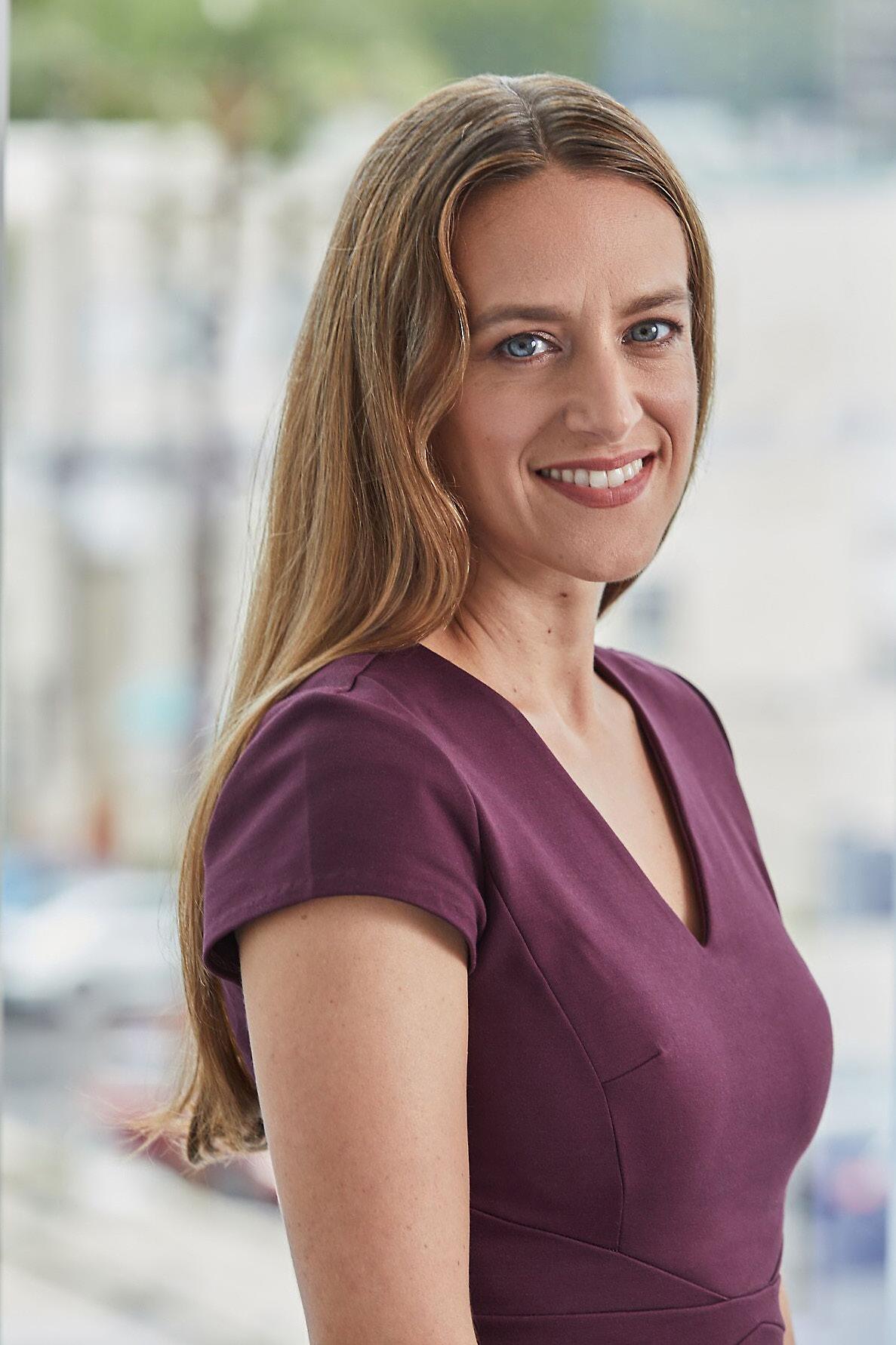
“The policies we create and enforce are meant to help, and every decision we make affects someone on a personal level. That motivates me to do my very best,” she explains. Cahill, who went in-house after her children were born, says she wants to design policies that will support other women in their own professional development.
That’s why STARZ is such a good fit for someone like Cahill. Although the company has always worked to promote diversity and inclusion, its leaders launched the #TakeTheLead initiative in 2021 to formalize and strengthen the network’s existing commitment to inclusive storytelling. STARZ is partnering with organizations like the Alliance of Women Directors, the National Association of Latino Independent Producers, and Diverse Representation to create a pipeline of diverse talent and encourage change across a predominantly white and male industry.
The name #TakeTheLead is one STARZ has earned by demonstrating its commitment. On the company’s executive leadership team, 75 percent of leaders are women, and 50 percent are people of color. In addition, 63.2 percent of series leads on STARZ original series are people of color, while 57.9 percent
Courtesy of Eileen Cahill
“Maybe when my daughter is an adult, equity and representation won’t have to be a fight.”
Evaluate 198
Eileen Cahill SVP, Employment Counsel STARZ
are women. STARZ outpaces industry averages in multiple categories, including the number of minority and female showrunners, executive producers, writers, and directors.
While #TakeTheLead represents the biggest way those at STARZ can make a difference in diversity and inclusion, Cahill says she tries to mentor other women through both a formal program and personal relationships. “I want to do my part to help STARZ push diverse content because it enhances the overall social climate,” she says. “I want my kids to see this, and maybe when my daughter is an adult, equity and representation won’t have to be a fight.”
Cahill is responsible for all compliance and employment law functions at STARZ. She also advises production teams regarding antidiscrimination matters, internal investigations, and other employment issues. For the last two years, she’s been instrumental in helping STARZ get its shows back into production after the COVID-19 pandemic brought Hollywood to a standstill.
Like other networks, STARZ halted all production in March 2020. As the industry reacted, Cahill and her small internal team worked to review all contracts and union obligations.
Two things soon became clear— the pandemic required more than “fourteen days to stop the spread,” and fans were hungry for new content. STARZ wanted to bring production back as quickly as possible without sacrificing safety. Cahill hired infectious disease and safety experts to create new protocols, like sterilization standards and testing zones. Craft services and catering replaced family-style meals with single-serve packaging. Rolling meal periods facilitated social distancing.
Cahill and her team worked overtime to vet all protocols with unions and balance the new costs as COVID measures increased production budgets. Soon, the popular series Power Book II: Ghost , which only had two episodes left to shoot when COVID-19 hit, was one of the first shows back in production.
In some ways, employment and entertainment law in Hollywood still feels like the Wild West as new issues appear and evolve every day. Ongoing COVID protocols, collective bargaining issues, emerging safety concerns, and shifting state regulations keep Cahill’s work interesting as she works to support STARZ employees and help the company in its commitment to women and underrepresented audiences.
Robert Milligan and Seyfarth are proud to partner with Eileen, Starz’s Senior Vice President, and salute her upon her recognition by Modern Counsel. We look forward to supporting Eileen and her colleagues in 2021 and beyond.
www.seyfarth.com
Congratulations to Eileen Cahill for her ongoing contributions to Starz Entertainment’s success.
199
Looking for Answers in Uncertain Times
Nikki Pollard helps NorthStar Anesthesia navigate the complexities of labor and employment law in the age of COVID-19
 By Natalie Kochanov
Photos by Noah Willman
By Natalie Kochanov
Photos by Noah Willman
 Nikki Pollard Associate General Counsel NorthStar Anesthesia
BY THE TIME NIKKI POLLARD JOINED
Nikki Pollard Associate General Counsel NorthStar Anesthesia
BY THE TIME NIKKI POLLARD JOINED
NorthStar Anesthesia in February 2021, the world had in many ways already adjusted to the COVID-19 pandemic. Even so, new challenges continued to appear, especially for attorneys.
“Lawyers in general are hired to have an answer or give a recommendation and to be firm in that answer or recommendation,” Pollard says. “Because we are in a pandemic regarding a novel coronavirus, sometimes the answers aren’t as clear.”
As an associate general counsel specializing in labor and employment law, Pollard faces the challenges of understanding COVID-19 requirements as they pertain to NorthStar’s employees. NorthStar provides outsourced anesthesia care to partner hospitals spanning twenty states. For Pollard, the company’s scope means staying up-to-date on regulations across multiple jurisdictions, at a time when those regulations are in constant flux and no one has all the answers.
Pollard had her work cut out for her from the start—and not just because of COVID-19. “This is the first time NorthStar hired a lawyer dedicated to labor and employment. That’s a little bit of pressure,” she says with a laugh. Despite that pressure, she developed a well-organized approach centered around one primary focus, which arose out of conversations with company
leaders in human resources (HR) and other areas.
“The most consistent concern was our employee policies, which needed to be revamped to align with our various markets,” she explains. “I work in a specific group with the HR leaders, and we’re actually creating all new employee policies.”
Pollard has also revamped NorthStar’s employee handbook, leave-of-absence policies, and paid sick leave policies—on top of advising on litigation, responding to administrative charges, and providing dayto-day advice to the HR team and company leadership. To set herself up for success in these regards, she prioritized getting to know the business and building relationships with her collaborators early on in her tenure at NorthStar.
“On the business side, I wanted to be really intentional about visiting some of our sites,” Pollard says. “I did have an opportunity to go to one of our larger markets, sit with some of our clinical leaders, and get an understanding of how they run their department. That information helps me in my job, because if I don’t understand the business and the pain points, it’s going to be hard for me to give good advice on how to handle a particular situation.”
During her site visits, Pollard learned more about NorthStar’s strategies for managing employees on the ground in clinical
Evaluate 202

and corporate settings. She now uses this knowledge to address existing problems and anticipate future issues.
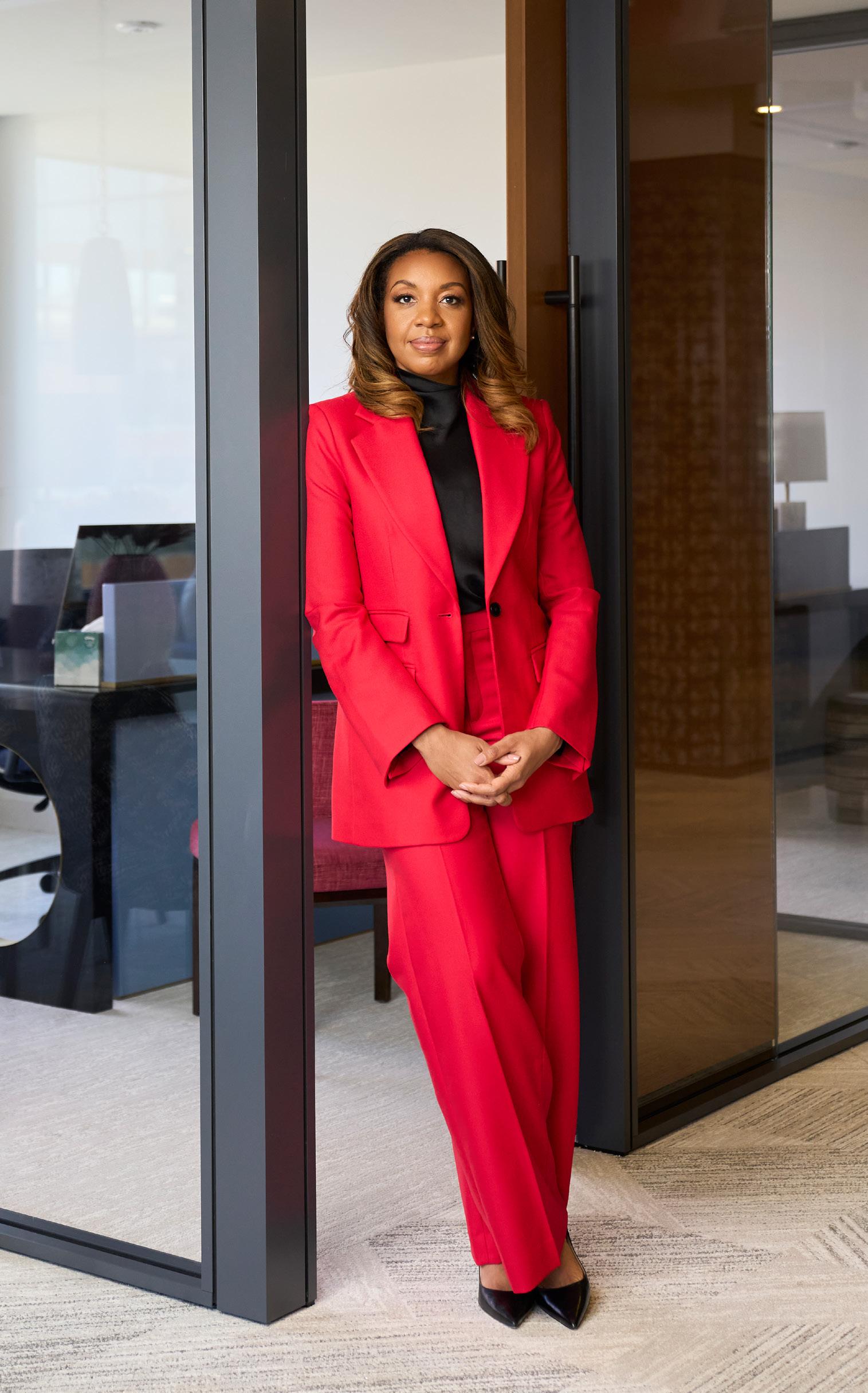
Knowledge gathering plays a key part in Pollard’s navigation of COVID-related matters as well. “Everything is moving very rapidly, and you have different federal requirements, state requirements, and local requirements all coming at you at the same time,” she says. “I’m constantly on the CDC website so I can know the latest and greatest regarding the vaccine or any other types of restrictions. And I’m always looking at hospitalization numbers in different jurisdictions where we have employees who may be in a corporate setting, rather than a hospital.”
Furthermore, Pollard blocks off time in her calendar to attend webinars and review labor-specific resources and legal listserv updates. These resources became especially important when the COVID-19 pandemic hit and she sought to learn as much as possible about its impact on the workforce. She determines how the latest information may impact NorthStar, then alerts her internal stakeholders of impending changes with as much advance notice as possible. “We’re in a time where there are no easy answers. You have to accept that and level with your internal leaders on where you are right now. It may change in the next hour, but you have to do the best with what you have in the moment,” she elaborates.
Fortunately, Pollard finds the culture at NorthStar ideally suited to a collaborative and informed decisionmaking process. “One thing that’s
Noah Willman
Evaluate 204
unique about NorthStar is that it’s not as hierarchical as other companies. Our executives are very hands-on, and they attend and facilitate many meetings I’ve been a part of,” she says. “That’s been very helpful for me to get information, interpret what’s going on, and hear different points of view.”
Pollard plans to remain in close contact with her internal partners and leaders moving forward. She will be evaluating return-to-office timelines as well as COVID-19 vaccine mandates and exemptions in various NorthStar markets, including markets the growing company will be entering for the first time. “It’s going to be my job to make sure that we understand the labor and employment risks associated with certain markets and how to resolve those risks,” she notes.
As NorthStar’s business expands, Pollard anticipates a continuing expansion of her own role—a trend she has noticed throughout the pandemic. “Many cross-functional departments look to you as a labor and employment attorney because you’re dealing with people, who are essential to the business. One thing I’m seeing with the pandemic is that you get a lot of stretch assignments,” she says. “I’ve been asked
to do things that are outside my comfort zone or that may not be my specialty.”
For Pollard, there is a clear upside to those additional responsibilities. “It’s another opportunity to learn the business, which is critical for any in-house lawyer,” she says. “You’re pushed to think of business or operational solutions, not just legal ones. It’s brought more visibility to the labor and employment function and how important it is. Now is a great time to raise your hand, get those stretch assignments, and take that risk.”
If COVID-19 has taught Pollard anything, it’s the value of leaning into discomfort. “It’s scary, but that’s how you get to grow and expand your knowledge,” she says. “And I’m a big believer in doing that.”
Jackson Lewis:
“I have worked with Nikki Pollard for the past five years. In that time she has repeatedly set herself apart from other in-house counsel. She is a pleasure to be around, smart, extremely hardworking, and deftly approaches balancing risk and business priorities.”
–Jeremy Schneider, Principal
Modern Counsel 205
“We’re in a time where there are no easy answers. You have to accept that and level with your internal leaders on where you are right now. It may change in the next hour, but you have to do the best with what you have in the moment.”
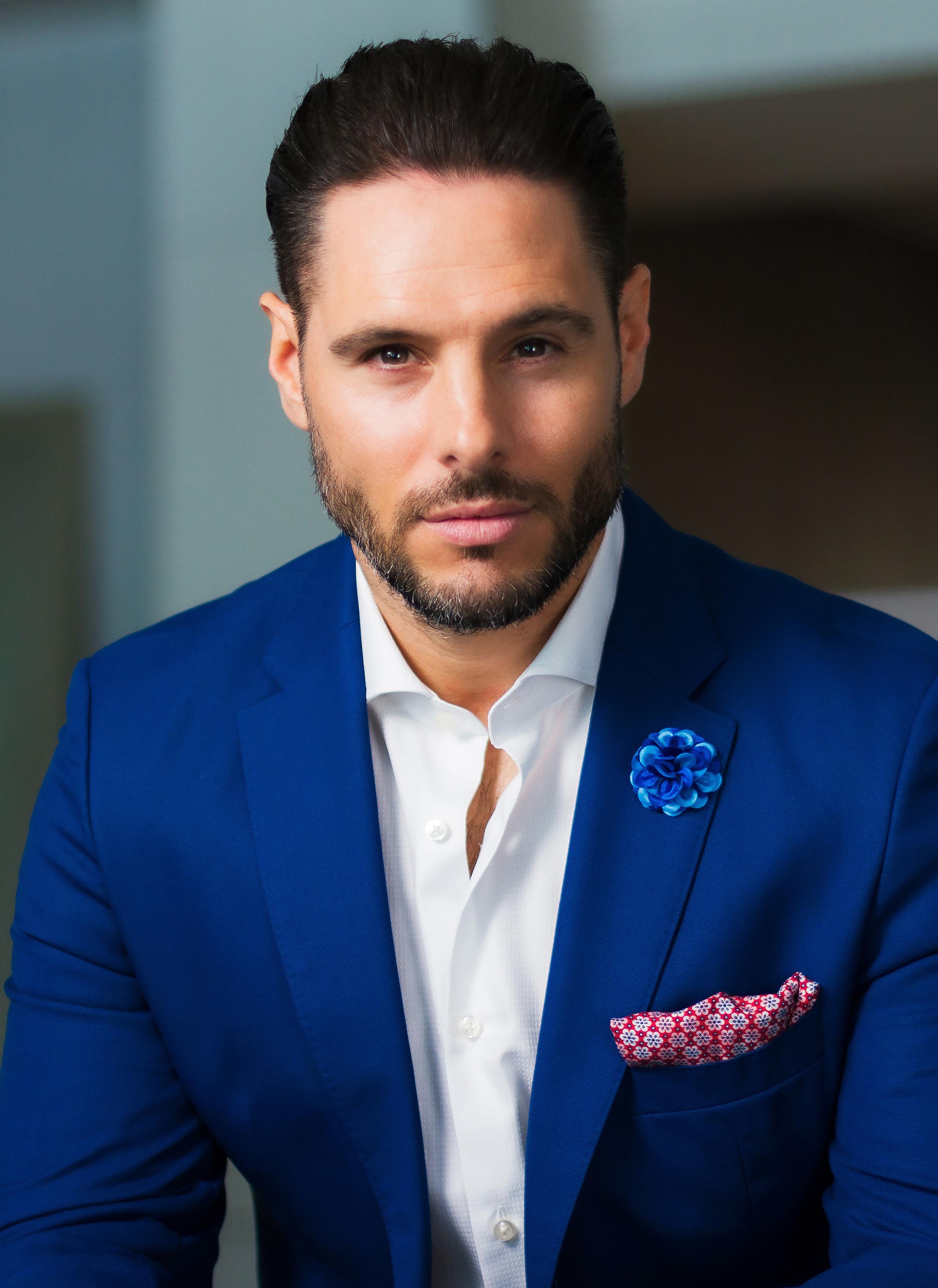 Aymée Cruzalegui
Joe Rubbone General Counsel Orangetheory Fitness
Aymée Cruzalegui
Joe Rubbone General Counsel Orangetheory Fitness
“More Life”
Joe Rubbone has helped Orangetheory Fitness weather a storm and evolve in new ways while inspiring members to live their best lives
By Billy Yost
JOE RUBBONE HAS ALWAYS BELIEVED THAT adversity is the truest measure of both a person and a company. It’s a lesson he learned early on from parents who were motivated high school educators and coaches—and whose battles with cancer would put Rubbone’s most fiercely held belief to the test.

When the Orangetheory Fitness general counsel came to the organization at the end of 2019, it had only seen mostly blue (if not orange) skies. “Orangetheory was an incredibly successful company that had managed to keep growing and growing without interruption,” Rubbone remembers.
As the calendar flipped to 2020, new Orangetheory franchises sprang up in trendy neighborhoods and suburban strip malls. The excitement and comradery emanating from Orangetheory’s heart ratebased, high-intensity interval classes—and the fitness company’s cutting-edge metrics and data-driven approach to exercise—set it apart from its competition. Then the pandemic happened.
Suddenly, Orangetheory’s entire model of group personal training within smaller, boutique-style studio locations became a liability. To further complicate matters, leadership turnover quickly elevated
207
various members of the organization into crucial roles. Rubbone himself was promoted from AGC to general counsel in June 2020 when the previous GC and current CLO, Scott McLester, had to step away.
“I knew that I had huge shoes to fill,” Rubbone explains, “but I was confident that I had all of the characteristics and the makeup to not only take the role over with grace but to do so in ways that would help the company stem the tide and ultimately reach the lofty heights this brand was destined to achieve.”
The updated regime’s first order of business was addressing a pressing question. How could Orangetheory continue to support its loyal member base and its sizable collection of independently owned and operated franchisees when no one, save for essential workers, could come together at all?
“That initial wave was tough,” Rubbone says. “We took a hard look at every facet of the organization and prioritized accordingly.” Rubbone and his team analyzed all procedures, protocols, and external relationships. In addition to modifying an array of internal practices, the company had to reassess ties with third parties that it had worked with from the very beginning.
Regrettably, Orangetheory had to make some of its own cuts as well. But Rubbone says the speed and effort with which the organization brought back many workers whose positions were disrupted underlines the company’s commitment to doing everything pos-
sible to help its people endure the most unique times in their lives.
The GC still marvels that the business evolved in a matter of months in ways that, for many similarly situated companies, would have taken years. “It was absolutely imperative that we create some more arrows to place in our proverbial quiver,” Rubbone explains. “That entrepreneurial mindset led us to the rollout of a variety of innovations, including a platform aptly referred to as ‘Orangetheory Live.’”
In many ways, Orangetheory Live flies in the face of the in-person workouts that make Orangetheory so popular among its members. Yet at a time when attending classes in person wasn’t an option for its customer base, the company swiftly adapted. “While all our membership accounts were frozen and the doors to our studios were closed,” Rubbone recalls, “we felt it was important to provide our members with workout content that they so desperately needed during this difficult period.”
Orangetheory Live was designed with the pandemic and users’ changing desires in mind. “It’s a chance to bring the workouts that folks love so much to an online experience where they can get live coaching, live energy, and realtime results, all from the comfort of their homes, offices, and hotel rooms,” Rubbone proudly declares.
The amount of work associated with this endeavor was staggering for such a limited time frame. Nevertheless,
Orangetheory Live—and other initiatives like “Orangetheory Outdoors,” which helped turn nearby parking lots and other outdoor spaces into makeshift group fitness opportunities—were up and running in mere months.
“Everything we do here, we do with the mantra of ‘More Life,’” the GC says. “We’re constantly working to provide individuals the opportunity to experience their best lives, and the chance to be part of that journey for them and our franchisees is invigorating. It’s something we take a tremendous amount of pride in.”
The rollout of Orangetheory Live, along with an updated website and mobile application, is living proof of Rubbone’s assertion that while Orangetheory operates in the fitness industry, it is very much a technology company that thrives on data, analytics, and forward-thinking ideas to advance its mission.
Rubbone’s satisfaction in Orangetheory’s response to adversity—and his genuine commitment to making the lives around him better—is a tribute to his own parents. His father, a collegiate baseball player and Long Island, New York, lifeguard for fifty years, was diagnosed with leukemia in 2010. “Though the cancer was quite aggressive, he was able to beat it, and it’s been in remission ever since,” Rubbone says.
But Rubbone’s mother, an equally gifted all-around athlete who completed the New York City Marathon among a variety of other accomplishments,
Evaluate 208
“I think of my mom every day, and I really see a tie between how she went about her life and what we as an organization are doing for our members by bringing a tangible sense of positivity to their daily routines.”
WELL DONE!
would subsequently be diagnosed with breast cancer in 2014. “After leukemia, it was easy to think of breast cancer as the disease our family was more likely to beat,” the GC says. “Sadly, it just didn’t shake out that way for my mom.”
The experience of losing his mother and nearly losing his father left Rubbone heartbroken, but not broken. Joining Orangetheory meant moving from his lifelong New Jersey and New York stomping grounds to Boca Raton, Florida. After a year of spirited lobbying, Rubbone convinced his father to make the journey to live near him and his then fiancé, now wife, Melissa.
“I think of my mom every day, and I really see a tie between how she went about her life and what we as an organization are doing for our members by bringing a tangible sense of positivity to their daily routines,” Rubbone says. “I want to honor her by living every day in a way that she would have envisioned for me, and I’m grateful that this role allows me to do that in spades, or, more appropriately, splats.”
Sacks, Ricketts & Case: Joe is a true leader who is smart, resourceful, and committed to excellence in his position as general counsel for Orangetheory Fitness, and SRC is honored to work with him.
Whether you need tailored advice creating an employee handbook, are threatened with a consumer class action, or are already embroiled in litigation, SRC is uniquely positioned to assist.


Clients stay with us because of our proactive approach to resolving their legal disputes consistent with their business needs and goals. Our model allows us the exibility to represent many types of business clients and individuals –from small startups to major national businesses.
Congratulations to our friend and client, Joe Rubbone, on this well-deserved recognition of his legal accomplishments and feature in Modern Counsel. We are proud to be part of the Orangetheory Fitness team.
Sacks,
www.srclaw.com
Gates LLP. Global counsel across five continents. Learn more at klgates.com.
K&L
Ricketts & Case LLP
PALO ALTO | SAN DIEGO SAN FRANCISCO | PHOENIX
209
Litigation on Tour
Frank Monago has seen some of the greatest challenges any attorney can face. Along the way, he’s gotten an inside look at almost every facet of the legal industry.
By Billy Yost
IT IS WIDELY ACKNOWLEDGED THAT challenges provide the greatest opportunities for growth. But when it comes to the law, most litigators would not wish to live that axiom through one of the highest-profile environmental disasters in American history. Frank Monago faced the most challenging period of his career as senior counsel for an international oil and gas company.
“This was a horrible accident that resulted in the unfortunate loss of life and damage to the environment, something that you would never wish on any person or company,” Monago explains. “But from a professional standpoint, you could not have been provided a better learning experience. It contained every type of legal proceeding that you could ever imagine.”
With the benefit of hindsight and some much-needed sleep, Monago— now senior counsel for litigation and
compliance at SABIC—is able to reflect on the aftermath of the incident, a time when work/life balance meant nothing.
“It didn’t matter if it was a Tuesday or a Sunday,” Monago remembers. “There were 7:00 a.m. calls and 7:00 p.m. calls. There were meetings with people throughout the region who were affected by the incident, and the work just didn’t stop for a long time.”
However, as Monago mentions, the litigation provided him with a sort of tour of every conceivable legal interaction a lawyer could possibly have: civil litigation, criminal litigation, multiple federal regulatory agency interactions— even a maritime trial, which Monago didn’t know existed until it dropped on his desk.
Bridging Perspectives
Given his twelve years of experience in private practice and the ten-plus years
he spent in-house with the international oil and gas company, it could be assumed that Monago had seen it all by the time he came to SABIC. Yet, he continues to encounter unique challenges at SABIC, a multinational chemical manufacturer. Headquartered in Riyadh, Saudi Arabia, the company was not very familiar with the nature of litigation in the United States.
“I think I’ve been able to bring a better global understanding and appreciation for the US legal system,” the senior counsel explains. “While litigation is a last resort, we will certainly vigorously protect the interests of the company.
“Within the company, I think I have helped to broaden the understanding that there are times when litigation enables the company to stand up for itself,” Monago says. “Litigation is no longer perceived solely as a negative or
Evaluate 210
A Broader Vision
After an illustrious private practice career, what motivated Frank Monago to go in-house? He wanted to drive broader-ranging legal strategies for his clients.
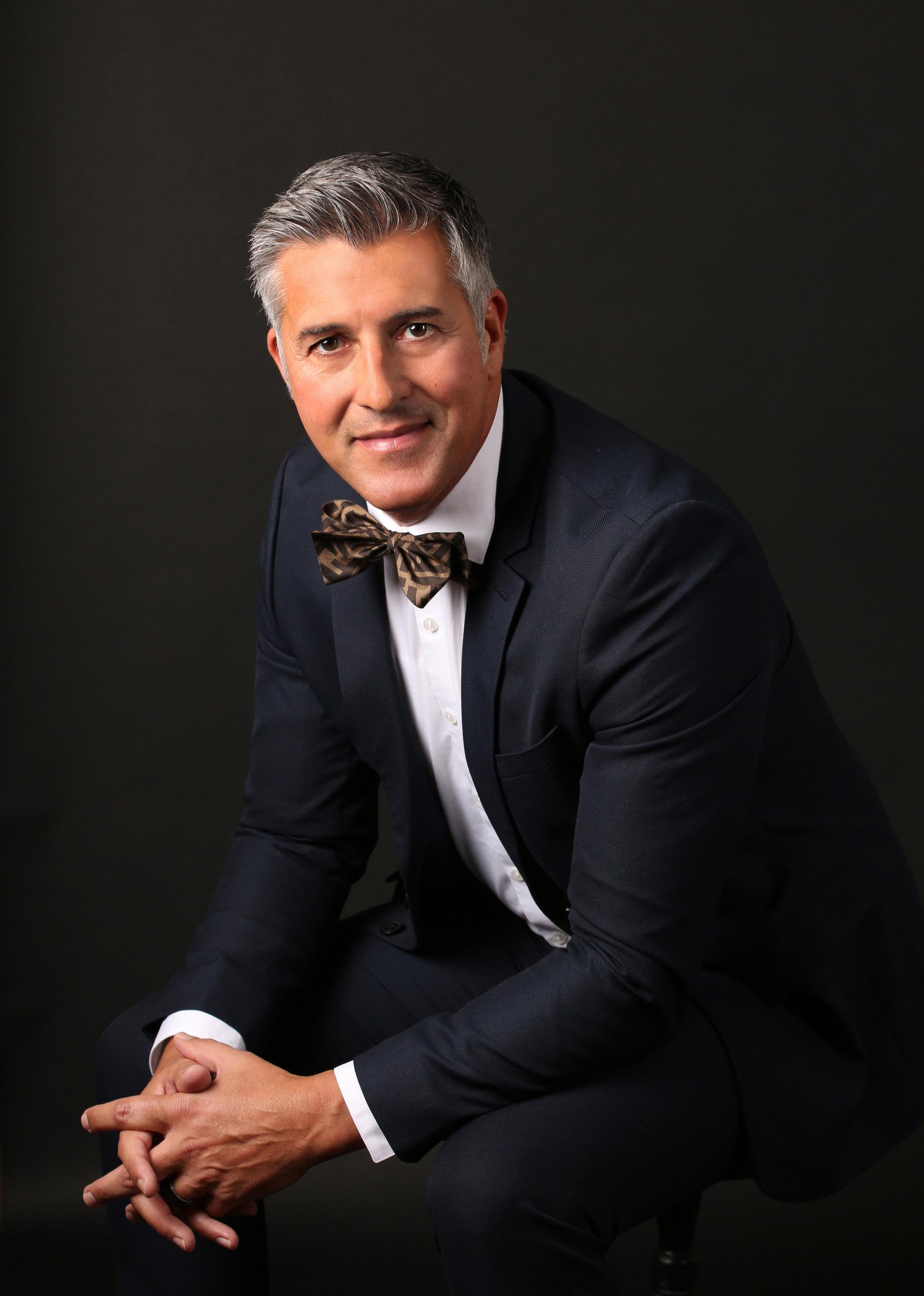
“I wanted the opportunity to have a more complete picture of an entire company and more directly weigh in on the strategic decisionmaking in handling cases,” Monago explains. As in-house counsel, “you can see how one matter fits into everything else. It may not be all that significant by itself, but it has real meaning for the company.”
Frank Monago Senior Counsel for Litigation & Compliance
SABIC
Modern Counsel 211
Mindy Clark
Hollingsworth LLP is called upon to solve its clients’ toughest litigation problems nationwide and regularly has the lead in landmark cases and on cutting-edge litigation theories and defenses.
The firm handles any litigation challenge, but the majority of work is for corporate clients in the areas of pharmaceutical products, toxic torts and products liability, environmental, natural resource damages, federal claims, construction and engineering, insurance, investigations, and government contracts defense. Hollingsworth LLP o ers e ciencies unmatched at larger general practice firms and depth and experience unmatched at boutiques.
hollingsworthllp.com
a disadvantage, but a real option to find justice.”
A Change of Venue
As plaintiffs in a recent case in Louisiana, Monago and his team were able to successfully try a case during the pandemic with an in-person jury in November 2020. With COVID-19 restrictions near their apex, the precautions and peculiarities of the trial will likely stay with Monago for the remainder of his career.
“As plaintiffs, the desire is to get the case to trial as soon as possible,” he says. “In keeping with our focus on safety and in agreement with the court and all parties, we were able to conduct the trial in a convention center down the road from the courthouse. The judge was on a stage, the witness table and court reporters were six feet away from the jurors, and the jurors were six feet away from each other. Everyone wore a mask except when an individual lawyer was speaking. It was quite a sight.”
Processes like voir dire took extra time, as did providing special microphones for attorneys and the judge, as well as a large screen projection for jurors. The litigation team had a witness ready to testify from the United Kingdom via Zoom, but after six days in court, the case was ultimately settled. The mere fact
that the trial was able to happen made news, and the attorney says he is proud of what his team was able to accomplish.
“It may have added a little more time to the proceedings, but I think everyone felt it was worth it in order to follow the necessary safety protocols,” Monago says.
The difficulties created by the COVID-19 pandemic are only the latest in the series of challenges that the senior counsel has faced during his career. But with all these experiences under his belt, Monago is more than ready to tackle whatever may come his way in future.
Hollingsworth LLP:
Frank’s willingness to work hand in hand with trial counsel throughout every step of litigation to develop and advance trial themes and legal arguments is unparalleled. He’s always a highly valuable member of the trial team. Congratulations to Frank, from your friends at Hollingsworth LLP.

212
“While litigation is a last resort, we will certainly vigorously protect the interests of the company.”
Redeploy and Rethink
Jordan Martell brings historical context to technological advancement at Pacific Life, as well as to his extensive pro bono efforts
By Billy Yost
JORDAN MARTELL IS FOCUSED ON THE future—but his philosophies lie somewhere in the fifth century BC. The vice president of innovation law at Pacific Life Insurance Company holds a master’s degree in ancient and classical Greek language and literature. But while that knowledge has provided him a solid foundation, he also sees the value and necessity of technology for those working to navigate the difficult terrain of the criminal justice system.
While discussing pro bono work he did with the Minnesota Supreme Court to help create more humane and technology-enabled access to justice, Martell casually mentions particle physics (his current passion) and how particle collider technology provides a road map for creating models and algorithms that might ultimately make life easier for criminal record expungement.
When Martell explains it, particle physics doesn’t seem like a mental leap. The lawyer’s ability to see the potential of innovations and relay that to others seems to be a hallmark of his success.
“The Romans were famous not necessarily for inventing new technologies but for finding ways to redeploy and rethink them to use at the highest levels,” Martell explains. “That’s something I’ve tried to apply to my own life. I look for areas that I don’t know much about, and I just like to try and figure out how they work.”
At Pacific Life, Martell has been given the opportunity to help the legal department modernize itself.
“It’s a difficult balance because there is a fantastic established culture here, but that doesn’t mean you can’t change the processes and procedures about how things are working,” he explains. “I was brought in to look at how we practice and work to modernize those practices, along with working with our different design studios to help them navigate regulations that, in many cases, haven’t been updated in many years. You’re trying to help a team design a new product with laws that were drafted before you were born.”
As technological innovation has sped up, Martell says, the life insurance industry has
Modern Counsel 213
Jordan Martell
lagged behind evolving consumer experiences and expectations, and he wants to change that.

“I try to keep the central purpose of this industry at the forefront when working to drive change,” he explains. “I feel like even the most die hard Luddite with no interest in technology understands that the mission of helping communities gain security and confidence is more important than, for instance, doing everything with a pen and paper.”
Human bias is an endless source of fascination for him. Martell has read anthropological research indicating that humans tend to operate in three modes: preacher, politician, or prosecutor. The preacher proselytizes and extols the virtue of their agenda. The politician works to generate consensus for their agenda. The prosecutor seeks to negate the argument against their agenda.
“The best leaders I’ve worked with try to set those natural proclivities aside and operate as a scientist,” Martell says. “You want the evidence to help inform the right course of action as opposed to lobbying and jockeying.”
While Martell continues to look for ways to ensure safety and security for customers, he’s also done extensive pro bono work. In addition to his work for the Minnesota Supreme Court, Martell is chair of the innovation subcommittee for the American Council of Life Insurers and serves on the board of Community Legal Aid of Southern California, where he has done most of his pro bono work since relocating from Minnesota. His volunteer efforts are varied, but generally focus on helping those who don’t have the financial means to secure legal services on their own.
“Lawyers have what we politely call ‘limited franchise,’ which is kind of a euphemism for a monopoly,” the lawyer says. “In order to protect the public from
Cari Martell
VP, Innovation Law Pacific Life Insurance Company
Evaluate 214
“I just can’t encourage pro bono work enough. It makes you a better lawyer, and it makes your community a better place.”
unqualified legal representation, bar associations impose a strict quality control process on who can practice law in a state. The net result is that this restricts the number of people that can practice law in any state, and so there is always a higher demand and lower supply, which drives prices up.”
Martell says pro bono work should be an essential component of every lawyer’s outlook, in service of one question: how can I repay the community for the privilege that I have been given to practice law?
His affinity for technology led to an effort to minimize obstacles for community members seeking access to the justice system. “I would spend about two hours with each client, and the first hour would almost exclusively be filling out applications to the court,” Martell says. “The second hour would be filling out waivers to ask for their fees to be waived. It seemed like large swaths of the process could be automated. This is important work, and it’s just getting started.”
While “justice for all” is a foundational promise of the United States, Martell believes it also creates a moral obligation for lawyers to focus on service and a prime opportunity to meaningfully enhance any legal career.
“I want to inspire others to think more about their careers and their communities,” Martell says. “I just can’t encourage pro bono work enough. It makes you a better lawyer, and it makes your community a better place.”
Merchant & Gould P.C.:
“Curiosity and creativity lead Jordan’s inventive approach to finding business-oriented solutions to legal challenges. Jordan is a trusted advisor because of his depth of analysis and understanding of business goals.”
–Heather Kliebenstein, Partner

215
Going Green
Susan Margaret Floyd marries her passions for environmental sustainability and continual learning at Entergy Services
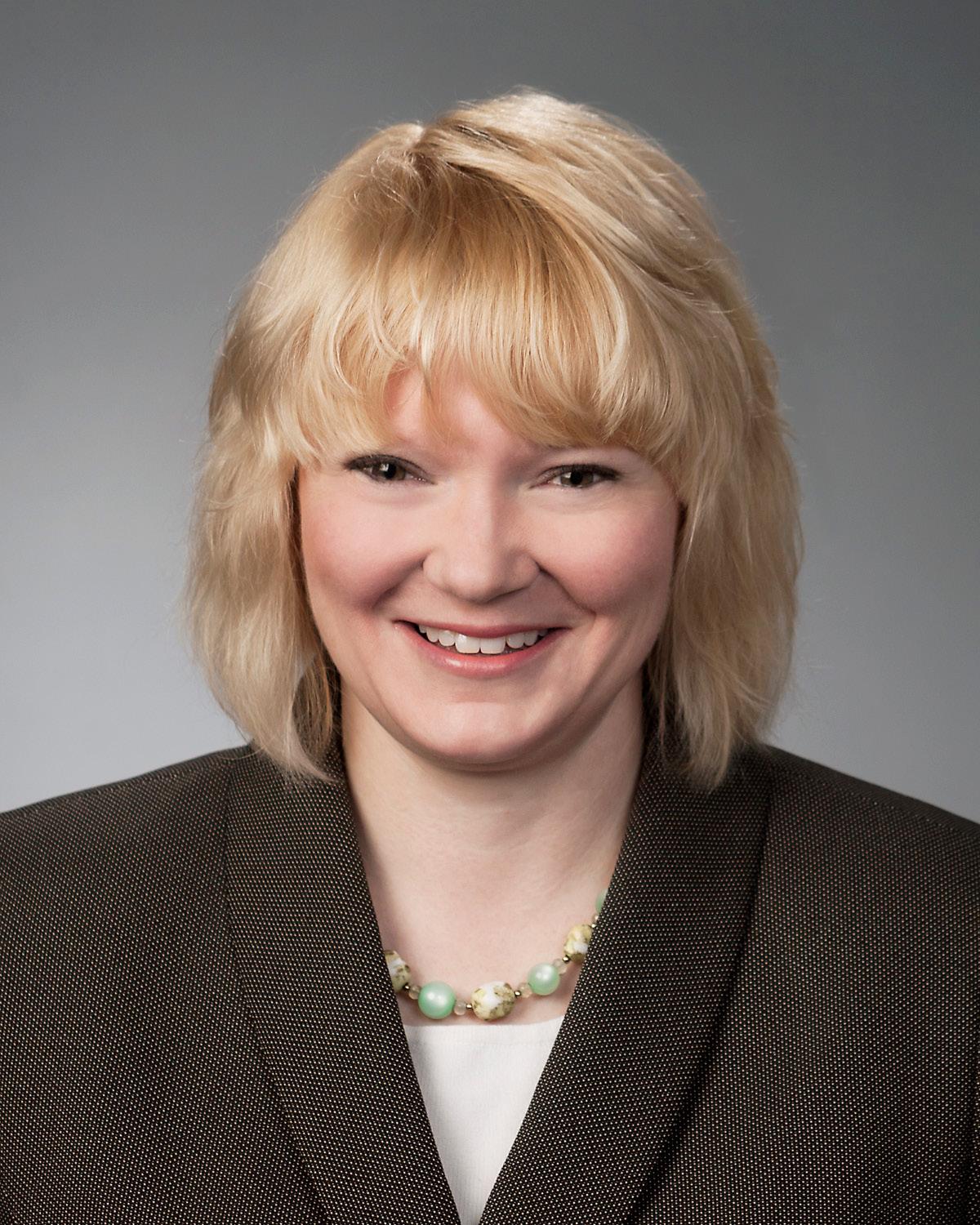 By Noah Johnson
By Noah Johnson
SUSAN MARGARET FLOYD CAN TEACH herself anything. That’s a skill she’s drawn from a decade-long career as a schoolteacher, and it’s vital to her work as senior counsel for environmental at Entergy Services (Entergy), where she practices environmental law.
Floyd has advised on matters related to regulatory requirements under a slew of environmental laws, like the Clean Water Act; the National Historic Preservation Act; the Endangered Species Act; the Resource Conservation and Recovery Act; the Comprehensive Environmental Response, Compensation, and Liability Act; the Emergency Planning and Community Right-to-Know Act; and the National Environmental Policy Act.
But even as environmental regulations and statutes change with each administration in Washington, her adaptability and passion for protecting the environment remain steadfast.
“It’s important to be working on something you’re passionate about, because you’re going to do the best job you can, but you’re also going to continue to grow and become the best you can be at whatever you’re called to do,” she says.
Floyd, a Mississippi native currently living in New Orleans, planned to attend law school
Gil Ford
Evaluate 216
Susan Margaret Floyd Senior Counsel, Environmental Entergy Services
after college, but life had other plans. In need of a summer job, she started teaching at a preschool. She loved it so much that what started as a temporary stopover morphed into a twelve-year career in education.
When Floyd turned thirty-five, she took stock of where she was and thought, “If I don’t go to law school, I’m going to regret not going.” The example of her maternal grandparents, both attorneys, had long inspired her. She also wanted to apply her interest in solving problems and love of learning to law.
“You never finish learning; that’s why it’s called practicing law,” she says. “You’re constantly learning, and there are different problems that come up that you have to apply the facts to. I like that too because you have to get creative sometimes.”
Eager to dive in, Floyd enrolled in law school at the age of thirty-eight.
While she was in school, she got a call from an attorney at Brunini, Grantham, Grower & Hewes, a local law firm in Jackson, Mississippi. The attorney said a friend of his had recommended her for a contract research assistant position and offered her the job. It was her first glimpse into environmental law. She’s been hooked ever since, she says.
“I fell in love with it,” she says. “Every project he gave me to research, I liked it more.”
The firm eventually offered her a full-time position, and she worked there for four years after graduation.
In that position, she gained experience related to natural resource damage assessment under the Oil Pollution Act, with BP as a client. According to the National Oceanic and Atmospheric Administration, the assessment is a process to determine the appropriate type and amount of restoration needed to offset impacts created by oil spills, hazardous waste sites, and vessel groundings.
Floyd’s experience in the process came amid the Deepwater Horizon spill, when BP’s mobile offshore drilling unit exploded, burned, and sank in the Gulf of Mexico fifty-two miles southeast of Venice, Louisiana. About 3.19 million barrels of oil spilled into the Gulf over
the following eighty-seven days. After the spill, numerous public meetings took place from Texas to Florida, and Floyd’s job was to cover them. She helped develop and identify criteria in the selection of restoration projects.
That work led to her appointment on a legal advisory group a decade later for Louisiana’s Climate Initiative Task Force. The task force is part of a yearlong project where officials are developing a plan to lower greenhouse gas emissions in the state, maintain the coast, and preserve wetlands. Floyd and other advisory board members are tasked with providing legal support to task force members. Her hands-on involvement means a lot to her due to
Modern Counsel 217
“You never finish learning; that’s why it’s called practicing law. You’re constantly learning, and there are different problems that come up that you have to apply the facts to.”
A POWERFUL TEAM
her passion for maintaining and sustaining the environment, she says.
“I like that I’m involved in the environmental legal side and in an aspect that I can advise to make the best decisions possible for a sustainable community and preservation,” she says.
That belief underscores what is so special about her role at Entergy, a Fortune 500 integrated energy company engaged in electric power production and retail distribution operations in the Deep South of the United States.


Floyd says there’s no such thing as a regular day working at the company, but her responsibilities always revolve around making sure it is in compliance with environmental regulations and laws. She works to support environmental teams in each business unit at the company to address legal concerns. She’s also involved with the transactional side of things, as the company diversifies its power generation portfolio by buying and selling.
One project she says she’s proud to have worked on was facilitating a multiparty agreement between multiple New York State entities and Holtec International, a decommissioning company that acquired Entergy’s Indian Point Energy Center in May 2021. The agreement took two years, and the companies undertook it amid the COVID-19 pandemic, which posed challenges.
When Floyd isn’t working, she’s most likely enjoying the outdoors. She also
PPGMR Law is a business-focused law firm
for
ppgmrlaw.com El Dorado Little Rock Stuttgart
known
its experience in environmental, energy, natural resources, utility regulation, government relations and related litigation.
218
“You never finish learning; that’s why it’s called practicing law.”
tries to do her part to preserve the environment every day with small and simple actions. For instance, she refrains from using paper plates and plastic bottles, and she’s careful about how much gas she uses. Additionally, she’s mindful of turning off lights when she doesn’t need them.

Whether it’s through the complex work she tackles in her multifaceted role at Entergy or her attentive surveying of daily habits, Floyd’s commitment to environmental stewardship comes through in every aspect of her life. She lives her passions— and she wouldn’t have it any other way.
MAKING AN IMPACT
A VALUED PARTNER
Nixon Peabody congratulates Susan Floyd of Entergy for her outstanding achievements. We thank her for many years of close collaboration and wish her continued success in the future.
Quattlebaum, Grooms & Tull congratulates Susan Floyd, Senior Counsel, Environmental, on her outstanding achievements. She is the consummate legal partner with a solid voice of reason backed by smart and con dent lawyering. We are honored to have the opportunity to work with Susan in the representation of Entergy Services, LLC.
Quattlebaum, Grooms & Tull PLLC: “Susan’s wide-ranging legal expertise and depth of industry knowledge distinguish her. They enable us to focus quickly on how we can achieve the client’s objectives. It is a real pleasure to collaborate with her.”



 –Michael B. Heister, Managing Member
–Michael B. Heister, Managing Member



677 Broadway, 10th Floor, Albany, NY nixonpeabody.com | @NixonPeabodyLLP
L I T T L E R O C K , A R K A N S A S N O R T HW E S T A R K A N S A S www.QGTL AW.com PERSONAL SERVICE DEDICATED ADVOCACY 20+ YEARS & COUNTING
219
People & Companies
Kamla Alexander P79 dentsu international
Marc Booth P192 Acacia Research Corporation
Joaquina Borges King P32
Eversource Energy
Eileen Cahill P197
STARZ
Christian Callens P38 Insperity
Kellin Chatfield P56 Dexcom
Jennifer Chin P65 University of California
Alex Christian P90
General Mills
Elizabeth Abbene Coleman P68
Uber
Cathy Coppedge-Jinks P168
Aflac
Alicia Del Valle P154
Airbnb
Christen Dubois P104
Meta Dale Cendali Partner
Kirkland & Ellis LLP 212.446.4846 dale.cendali@kirkland.com
Dale Cendali is a partner at Kirkland & Ellis and heads Kirkland’s Copyright, Trademark, Internet and Advertising practice group. She is a nationally recognized leader in the field of intellectual property litigation.
John Duffy P14
Tiffany & Co.
Chris Ferguson P116 Hewlett Packard Enterprise
Susan Margaret Floyd P216
Entergy Services
Marcie Getelman P35
Lennar Corporation
Auste Graham P24
Essentra
Kevin Gingras P87
Lockheed Martin
Celeste Harrison P136
Jabil
Amy Hughes P94
Weyerhaeuser
Yami Hurtado P82
Royal Caribbean Group
Greta Katz P176
Public Storage
Jessica Kelman P146
Pure Storage
Adriana Suringa Luedke P48
Lockheed Martin
Jordan Martell P213
Pacific Life
Scott Mayhew P22
Zoetis
Frank Monago P210
SABIC
Allison Nold P179
Collins Aerospace
Tim Parilla P120
LinkSquares
Jennifer K. Parnell P149
JPMorgan Chase
Index 220
James Pickel P184
Lindsay Goldberg
Nikki Pollard P200
NorthStar Anesthesia
Kelly Rezny P128
Dyson
Rich Rosalez P162
Samsung Electronics America
Robert J. Herrington
Shareholder Greenberg Traurig, LLP 310.586.7816
herringtonr@gtlaw.com
Rob focuses his practice on defending consumer products companies in complex, multi-party litigation, including class actions, government enforcement litigation, product defect litigation, and mass torts.
Joseph Rubbone P206
Orangetheory Fitness
Lindsay Sadlowski P10
Total Quality Logistics LLC
Alyssa Schindler P52
Chevron
Adam Schloss P62
The Hertz Corporation
Rink Sinkfield P72
Laureate International Universities
Seth Skiles P97 HEINEKEN USA
Joan Steinmann P76 H.B. Fuller Company
Leanne Stendell P133 TGI Fridays
Lisa Storey P124
EverCommerce
Sung-Hee Suh P110 PIMCO
Robert Kaplan Partner Debevoise & Plimpton LLP 202.383.8060
rbkaplan@debevoise.com
Robert Kaplan counsels clients on a broad range of securities-related regulatory compliance and enforcement issues, including those involving requirements affecting SEC-registered investment advisers.
Richard Sutton P101 Genpact
Allan Tananbaum P16
Trane Technologies
Ky Tran-Trong P187
Visa
Daniel Vaillant P28
TDK USA Corporation
Thomas E. Gaynor Partner
DLA Piper LLP (US) 415.615.6165
thomas.gaynor@dlapiper.com
Thomas Gaynor represents US and multinational clients from a wide range of industries in complex international corporate and finance transactions.
Bryan Warner P140
Budweiser Brewing Company APAC
Jill Warren P172
Mercury Insurance
Kia Williams P44
Mattress Firm
Charlene Wilson P84 H&R Block
Danyelle S.T. Wright P158
The E.W. Scripps Company
Joseph Zwicker P59 PNC
Modern Counsel 221
Index 222 Share your story in the pages of AHL magazine and discover innovations from top minds in the field. For editorial consideration, contact info@ahlmagazine.com

Distinct Position gibbonslaw.com NEW JERSEY NEW YORK PENNSYLVANIA DELAWARE WASHINGTON, DC FLORIDA A Proven Approach performance . presence . pride . We practice law differently. With a significant foothold in the Mid-Atlantic and beyond, we’ve staked our position handling major matters for mid-market companies and mid-market matters for Fortune 500 companies. Gibbons P.C. is headquartered at One Gateway Center, Newark, New Jersey 07102. Results may vary depending on your particular facts and legal circumstances.
BIGLAW REDEFINED.
When your world changes, your legal partner can make all the difference. At GT, we help clients anticipate and adapt to uncertainty through responsive, transparent service. Agile teams enable faster, more confident decisions. And our global platform lets us work together closely–especially when working remotely. Together, we’re changing how your lawyers work for you.

WORLDWIDE LOCATIONS United States, Europe, Middle East, Asia, Latin America The hiring of a lawyer is an important decision and should not be based solely upon advertisements. Before you decide, ask us to send you free written information about our qualifications and our experience. Prior results do not guarantee a similar outcome. Greenberg Traurig is a service mark and trade name of Greenberg Traurig, LLP and Greenberg Traurig, P.A. ©2021 Greenberg Traurig, LLP. Attorneys at Law. All rights reserved. Attorney Advertising. Contact: Robert J. Herrington in Los Angeles at 310.586.7700 or Richard A. Edlin in New York at 212.801.9200. °These numbers are subject to fluctuation. Images in this advertisement do not depict Greenberg Traurig attorneys, clients, staff or facilities. 35592 GT_Law
GREENBERG TRAURIG, LLP | ATTORNEYS AT LAW | 2200 ATTORNEYS | 40 LOCATIONS WORLDWIDE °
Greenberg Traurig, LLP GT_Law GreenbergTraurigLLP
GTLAW.COM
 Samsung Electronics’ Rich Rosalez holds both his work and workplace to the highest of standards when it comes to DEI P162
Samsung Electronics’ Rich Rosalez holds both his work and workplace to the highest of standards when it comes to DEI P162













 Courtesy of Allan Tananbaum
Courtesy of Allan Tananbaum




















 Rigel Crow/Insperity
Rigel Crow/Insperity

 By Zach Baliva
By Zach Baliva





























































 By Frederick Jerant
By Frederick Jerant
 Rick Sinkfield Chief Legal, Ethics & Compliance Officer Laureate Education Rodrigo Varela
Rick Sinkfield Chief Legal, Ethics & Compliance Officer Laureate Education Rodrigo Varela




 General
General

 Jacqueline Hicks
Jacqueline Hicks







 Jonathan Conklin
Alex Christian Trademark Counsel General Mills
Jonathan Conklin
Alex Christian Trademark Counsel General Mills




 Seth Skiles
Deputy General Counsel HEINEKEN USA
Seth Skiles
Deputy General Counsel HEINEKEN USA






 By Zach Baliva
By Zach Baliva







 By Billy Yost
By Billy Yost
 Tim Parilla Chief Legal Officer LinkSquares
Tim Parilla Chief Legal Officer LinkSquares
 David Guerrera/Linksquares
David Guerrera/Linksquares
 by Zach Baliva
Jess Kornacki
by Zach Baliva
Jess Kornacki
 Lisa Storey General Counsel EverCommerce
Lisa Storey General Counsel EverCommerce



 By Zach Baliva
By Zach Baliva

 Harrison Senior Associate General Counsel
Celeste
Jabil
Clarissa Dane Hughes
Harrison Senior Associate General Counsel
Celeste
Jabil
Clarissa Dane Hughes
 By Natalie Kochanov
By Natalie Kochanov



 By Zach Baliva
By Zach Baliva



















 By Natalie Kochanov
By Natalie Kochanov















 Portraits by Terri Glanger
Rich Rosalez leverages his lifelong diversity efforts to push for equity and belonging at Samsung Electronics America and beyond
Portraits by Terri Glanger
Rich Rosalez leverages his lifelong diversity efforts to push for equity and belonging at Samsung Electronics America and beyond































 Allison Nold
Allison Nold


 James Pickel Counsel and Chief Compliance Officer Lindsay Goldberg
Courtesy of Lindsay Goldberg
James Pickel Counsel and Chief Compliance Officer Lindsay Goldberg
Courtesy of Lindsay Goldberg











 By Natalie Kochanov
Photos by Noah Willman
By Natalie Kochanov
Photos by Noah Willman
 Nikki Pollard Associate General Counsel NorthStar Anesthesia
BY THE TIME NIKKI POLLARD JOINED
Nikki Pollard Associate General Counsel NorthStar Anesthesia
BY THE TIME NIKKI POLLARD JOINED


 Aymée Cruzalegui
Joe Rubbone General Counsel Orangetheory Fitness
Aymée Cruzalegui
Joe Rubbone General Counsel Orangetheory Fitness







 By Noah Johnson
By Noah Johnson






 –Michael B. Heister, Managing Member
–Michael B. Heister, Managing Member




